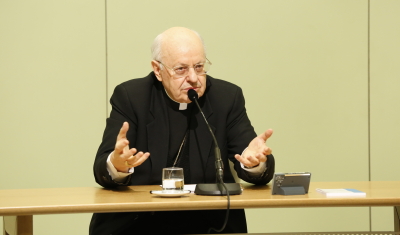
Feb 25, 2016 | Non categorizzato
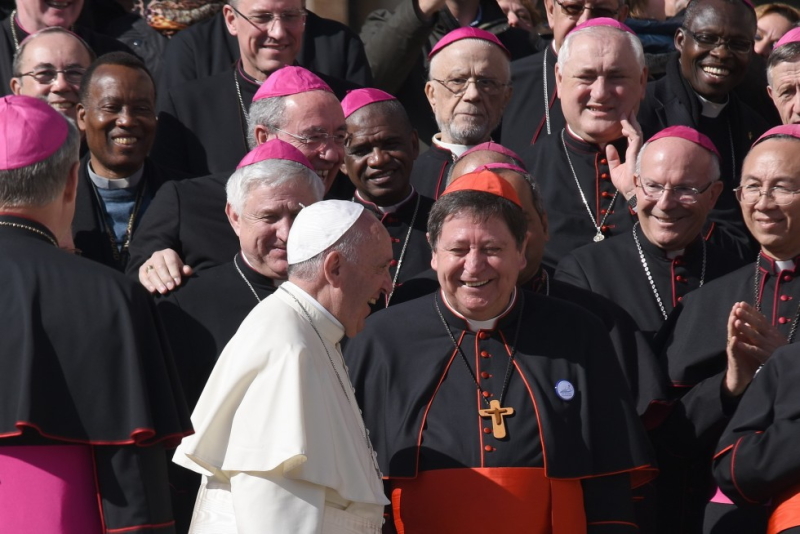 60 Bishop-friends of the Focolare Movement, representing 31 countries (Iraq, Lebanon, Syria, Bénin, Cameroon, Ivory Coast, Ethiopia, Madagascar, Democratic Rep.of Congo, Tanzania, Thailand, India, Pakistan, Brazil, Venezuela, Panama, U.S.A., Uruguay, Austria, Spain, France, Great Britain, Ireland, Italy, Portugal, Czech Rep., Latvia, the Rep.of Moldova, Romania, Ukraine, Hungary.), are presently gathered at Castelgandolfo (22-26 February). The participation at the General Audience held by Pope Francis at St. Peter’s Square has been the central point of this meeting. In his address the Pope urged the Bishops “to always keep alive the charism of unity in the apostolic ministry, in communion with the successor of Peter”. “A synodal Church is a Church that listens, that realizes that listening ‘is more than simply hearing’. It is a mutual listening in which everyone has something to learn.” This type of Church, as defined by the Pope during the ceremony commemorating the 50th anniversary of the institution of the Synod of Bishops, indicates the track to be followed during this conference. The choice of the title “A Church which generates unity” stems from the belief that, at a time marked by tensions and increasing disintegration, the people of God are called to contribute in a vital manner towards building relationships at all levels and in all environments. This has to be lived, first of all, within the Church itself and its source must be in the heart of a merciful God. The core of this theme lies in understanding Jesus’ prayer to the Father for unity (Jn 17), as “ gift, commitment and achievement”. Maria Voce, president of the Focolare Movement and Jesús Morán, co-president spoke about this approach in the light of Chiara Lubich’s charism.
60 Bishop-friends of the Focolare Movement, representing 31 countries (Iraq, Lebanon, Syria, Bénin, Cameroon, Ivory Coast, Ethiopia, Madagascar, Democratic Rep.of Congo, Tanzania, Thailand, India, Pakistan, Brazil, Venezuela, Panama, U.S.A., Uruguay, Austria, Spain, France, Great Britain, Ireland, Italy, Portugal, Czech Rep., Latvia, the Rep.of Moldova, Romania, Ukraine, Hungary.), are presently gathered at Castelgandolfo (22-26 February). The participation at the General Audience held by Pope Francis at St. Peter’s Square has been the central point of this meeting. In his address the Pope urged the Bishops “to always keep alive the charism of unity in the apostolic ministry, in communion with the successor of Peter”. “A synodal Church is a Church that listens, that realizes that listening ‘is more than simply hearing’. It is a mutual listening in which everyone has something to learn.” This type of Church, as defined by the Pope during the ceremony commemorating the 50th anniversary of the institution of the Synod of Bishops, indicates the track to be followed during this conference. The choice of the title “A Church which generates unity” stems from the belief that, at a time marked by tensions and increasing disintegration, the people of God are called to contribute in a vital manner towards building relationships at all levels and in all environments. This has to be lived, first of all, within the Church itself and its source must be in the heart of a merciful God. The core of this theme lies in understanding Jesus’ prayer to the Father for unity (Jn 17), as “ gift, commitment and achievement”. Maria Voce, president of the Focolare Movement and Jesús Morán, co-president spoke about this approach in the light of Chiara Lubich’s charism.

Cardinal Lorenzo Baldisseri
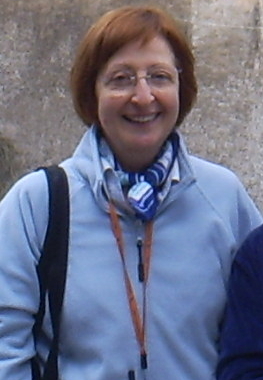
Feb 24, 2016 | Focolare Worldwide
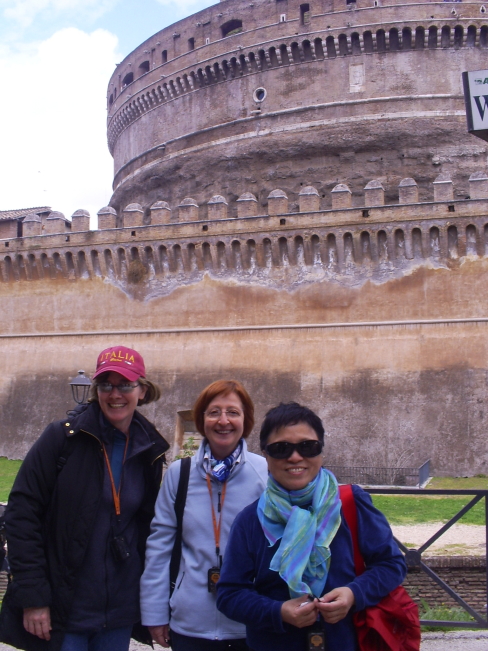
Maria Grazia Brusadelli (centre)
 At the moment, it is probably the most “extreme” periphery. Now Maria Grazia is preparing her documents for the move and visiting her relatives to inform them of her decision. She would still have time to change her mind, since the reports of new hostilities. A few days ago there was news of a bomb being detonated at a Doctors Without Borders hospital in Arat al Numan, leaving 8 dead and 40,000 people without medical care in an area of conflict. The killing of a young Caritas volunteer in Aleppo was also reported. Maria Grazia, what effect do these news reports have on you? Are you having any second thoughts? “Absolutely not. It’s true, each tragic news report is like an arrow to the heart. But I’m not afraid. Even though I’m well aware of the risks, I don’t fear for myself. I think of the people living there, and I already want to be with them to share their pain, to bring them – at least by being there, since I don’t speak Arabic – a little bit of hope. I’d like to already be there to make them feel the support and the nearness of Focolare members around the world who pray for them every day that peace will return to Syria. The Syrians with whom we are in contact are very grateful for this global participation and for all that’s being done on the ground to alleviate their hardship. I’d also like to already be there to bring them the love and hope of the Church. I’ll have the opportunity to meet with the Holy Father before going, and so I’ll be able to give them a message from him. In Damascus there are three women focolarini waiting for me, and the men focolarini in Aleppo. They live in close communion with the people in Syria who have embraced the spirituality of unity, and there’s the ecumenical and interreligious dialogue that’s very much alive among the locals. Because the Focolare – wherever it is in the world – has the spirit of a family, both among the members and with everyone else.”
At the moment, it is probably the most “extreme” periphery. Now Maria Grazia is preparing her documents for the move and visiting her relatives to inform them of her decision. She would still have time to change her mind, since the reports of new hostilities. A few days ago there was news of a bomb being detonated at a Doctors Without Borders hospital in Arat al Numan, leaving 8 dead and 40,000 people without medical care in an area of conflict. The killing of a young Caritas volunteer in Aleppo was also reported. Maria Grazia, what effect do these news reports have on you? Are you having any second thoughts? “Absolutely not. It’s true, each tragic news report is like an arrow to the heart. But I’m not afraid. Even though I’m well aware of the risks, I don’t fear for myself. I think of the people living there, and I already want to be with them to share their pain, to bring them – at least by being there, since I don’t speak Arabic – a little bit of hope. I’d like to already be there to make them feel the support and the nearness of Focolare members around the world who pray for them every day that peace will return to Syria. The Syrians with whom we are in contact are very grateful for this global participation and for all that’s being done on the ground to alleviate their hardship. I’d also like to already be there to bring them the love and hope of the Church. I’ll have the opportunity to meet with the Holy Father before going, and so I’ll be able to give them a message from him. In Damascus there are three women focolarini waiting for me, and the men focolarini in Aleppo. They live in close communion with the people in Syria who have embraced the spirituality of unity, and there’s the ecumenical and interreligious dialogue that’s very much alive among the locals. Because the Focolare – wherever it is in the world – has the spirit of a family, both among the members and with everyone else.”
Feb 23, 2016 | Non categorizzato
Chiara Lubich lived on this earth from January 22, 1920 until March 14, 2008. On the day she died thousands of people filled the streets of Rocca di Papa where the International Headquarters of the Focolare Movement is located as well as Chiara’s house. They were there to pay their final respects, and even larger crowds attended her funeral at the Basilica of St. Paul’s Outside the Walls. In the years that followed, her anniversary became an occasion to reflect on different aspects of the life, witness and thought of Chiara Lubich: ecumenical dialogue (Trent, 2012); the charism of unity and young people (2012); charism, history, culture (2013); interreligious dialogue (2014); politics for unity (2015). On January 27th of the same year there was the official opening of the Cause of Canonisation. In 2016 the focus will be on peace. Chiara Lubich was a peacemaker. She opened paths of dialogue at many levels and was internationally recognised, like when she was awarded the UNESCO Prize For Peace Education in 1996. Her spirituality, which also translates into the daily practice of universal brotherhood, has inspired hundreds of projects around the world that are aimed at enriching the world with humanity and solidarity through caring for Creation. These projects are all gathered in the United World Project (UWP). https://www.youtube.com/watch?v=TR_MvehHeIk While responding to Pope Francis’s appeal, on behalf of the Movement, Focolare president Maria Voce called for new commitment and effort in favour of peace. “We have to do more,” she said, to move the top politicians, the weapons trade networks and the chief strategists who – as we are beginning to see – can start off from the bottom with the mobilisation of civil society.” Maria Voce also called on the members of the Movement “to join in more with others” with others who are moving in this direction, to promote actions that unmask the causes of war and of the tragedies that afflict so many parts of the earth, with the goal of remedying them, “putting our own forces into play, our willingness and resources.” One event titled Culture of Dialogue, A Way To Build Peace, with a special appearance by the Gen Verde international band, will be held at Castel Gandolfo, Italy, on March 12th. These events will mark the 20th anniversary of the conferment of the UNESCO Prize For Peace Education to Chiara Lubich. The invitation is addressed to ambassadors to the Holy See, civil and Church leaders. Focolare president Maria Voce will give an address, which will be followed by several testimonies regarding dialogue as a way to build peace. On March 14th a Mass will be celebrated by Cardinal João Braz De Aviz at the Shrine of Our Lady of the Divine Love, while other events to remember Chiara are being held throughout the world.
Feb 23, 2016 | Non categorizzato
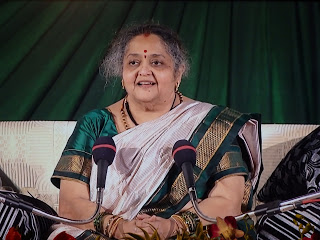
Feb 22, 2016 | Non categorizzato
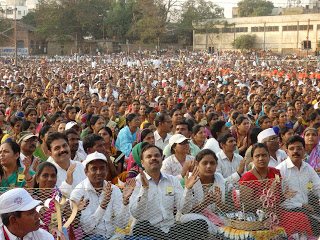 The city of Kolhapur hosted the meeting with some 50 thousand members and sympathisers of the Swadhyaya Movement which was founded by the Hindu reformer Pandurang Shastri Athawale and is currently guided by his daughter, Didi. A harmonious blend of ideals and intentions was born from the friendship between Didi and Chiara Lubich that grew over the years and continued with the election of Maria Voce Focolare president. Following the meetings between the women who succeeded the founders of those two movements, Maria Voce, Jesús Morán and the delegation from the Movement in Italy were invited to take part in the closing ceremony of a pilgrimage with some ten thousand couples from the Swadhyay Parivar Movement. The couples, who have been involved in the Hindu renewal movement, spent a week in contact with other families from the Kolhapur region sharing with them the ideals and spiritual life of their movement and paying a visit to the important temple of that region.
The city of Kolhapur hosted the meeting with some 50 thousand members and sympathisers of the Swadhyaya Movement which was founded by the Hindu reformer Pandurang Shastri Athawale and is currently guided by his daughter, Didi. A harmonious blend of ideals and intentions was born from the friendship between Didi and Chiara Lubich that grew over the years and continued with the election of Maria Voce Focolare president. Following the meetings between the women who succeeded the founders of those two movements, Maria Voce, Jesús Morán and the delegation from the Movement in Italy were invited to take part in the closing ceremony of a pilgrimage with some ten thousand couples from the Swadhyay Parivar Movement. The couples, who have been involved in the Hindu renewal movement, spent a week in contact with other families from the Kolhapur region sharing with them the ideals and spiritual life of their movement and paying a visit to the important temple of that region.  At the ceremony, which was held on a large plaza in the centre of the city, Didi Talwalkar told everyone about her friendship with Chiara Lubich, presenting Chiara as a Catholic leader and foundress of the Focolare Movement. Following a projection of photos showing the deep relationship between the two women, Maria Voce was asked to offer a greeting and the blessing of Chiara in the spirit of dialogue and shared membership in one human family as is written in the holy books of Hinduism like the vasudhavaiva kutumbakan. It was a very intense spiritual and emotional moment which strengthened the bond between the leaders of the two movements. The journey of these years has been a new experience of dialogue among the different relgions of India and Christians in the light of the spirituality of unity. It has been an experience of deep brotherhood at a living, but also intellectual level with valuable social projects. It continues to open paths of dialogue and knowledge of each other’s faith, in the light of the charism of Chiara Lubich, seen as a woman who knew how to read the signs of the times and who knew how to offer the world a spirit that could join everyone in a journey towards the Truth. The dialogue with Maria Voce and Jesús Morán during the February 13th telephone link-up ended with a question: “In the vast Hindu world where Christians are barely 2% of a population that exstends beyond one billion, what kind of impression does that leave you with? The Focolare president answered: “[It leaves me with the impression] of a small but alive Church, very alive.” “India is a large gift,” the co-president added. “They are very in favour of pluralism, and live it in an inclusive manner. They make space for each person to express their faith explicitly. This is a gift for the West, which lives pluralism in an almost excluding manner. Another thing is silence. Silence is necessary for every type of dialogue. Without interior and interpersonal silence, dialogue doesn’t have stand a chance.” Maria Voce concluded: “And this silence expresses the religious soul of the Indian people. As they said themselves: the gift that they can give the West is to make it rediscover the sense of God, sensing, feeling God.” See also: In India: a dialogue of hearts and minds
At the ceremony, which was held on a large plaza in the centre of the city, Didi Talwalkar told everyone about her friendship with Chiara Lubich, presenting Chiara as a Catholic leader and foundress of the Focolare Movement. Following a projection of photos showing the deep relationship between the two women, Maria Voce was asked to offer a greeting and the blessing of Chiara in the spirit of dialogue and shared membership in one human family as is written in the holy books of Hinduism like the vasudhavaiva kutumbakan. It was a very intense spiritual and emotional moment which strengthened the bond between the leaders of the two movements. The journey of these years has been a new experience of dialogue among the different relgions of India and Christians in the light of the spirituality of unity. It has been an experience of deep brotherhood at a living, but also intellectual level with valuable social projects. It continues to open paths of dialogue and knowledge of each other’s faith, in the light of the charism of Chiara Lubich, seen as a woman who knew how to read the signs of the times and who knew how to offer the world a spirit that could join everyone in a journey towards the Truth. The dialogue with Maria Voce and Jesús Morán during the February 13th telephone link-up ended with a question: “In the vast Hindu world where Christians are barely 2% of a population that exstends beyond one billion, what kind of impression does that leave you with? The Focolare president answered: “[It leaves me with the impression] of a small but alive Church, very alive.” “India is a large gift,” the co-president added. “They are very in favour of pluralism, and live it in an inclusive manner. They make space for each person to express their faith explicitly. This is a gift for the West, which lives pluralism in an almost excluding manner. Another thing is silence. Silence is necessary for every type of dialogue. Without interior and interpersonal silence, dialogue doesn’t have stand a chance.” Maria Voce concluded: “And this silence expresses the religious soul of the Indian people. As they said themselves: the gift that they can give the West is to make it rediscover the sense of God, sensing, feeling God.” See also: In India: a dialogue of hearts and minds
![Unity, the leaven of society]()
Feb 21, 2016 | Non categorizzato
 “The lines of John’s Gospel converge in the sentence which for quite some time has had deep and infinite meaning for me: ‘. . . may all be one. As you, Father, are in me and I am in you, may they also be in us, so that the world may believe that you have sent me’ (see Jn 17:21). This is how we are to live. [. . .] the Unity of the Church, the unity of those that find themselves beyond the confines of our Roman Catholic Church, the unity amongst all those who acknowledge faith in the one God, the Living One, and therefore with Jews and Muslims. That unity between Church and society in which the one does not find itself beside the other in a parallel sense or in an oppositional way, but Church and society enter into a reciprocal relationship, highlighting the fact that the unity which God gives is the leaven of society, the leaven that makes man free. It is the unity that makes us truly free, because we can only be ourselves in the fullest sense only where God has the right to be God in the fullest sense and therefore can give us everything He wishes to give us. And He doesn’t wish to give us anything less than His own interior mystery: Trinitarian unity. [. . .] But this is not a mere programme, because you never get very far with programmes. It must above all become life [. . .] I also have to begin to live this unity. And for this reason I trust in the fact that all of you, dear brothers and sisters, will help me, and that we can do this together, in reciprocity.” Bishop Klaus Hemmerle Source: W. Hagemann, Klaus Hemmerle innamorato della Parola di Dio, (Rome: Città Nuova, Rome, 2013) p. 337-338.
“The lines of John’s Gospel converge in the sentence which for quite some time has had deep and infinite meaning for me: ‘. . . may all be one. As you, Father, are in me and I am in you, may they also be in us, so that the world may believe that you have sent me’ (see Jn 17:21). This is how we are to live. [. . .] the Unity of the Church, the unity of those that find themselves beyond the confines of our Roman Catholic Church, the unity amongst all those who acknowledge faith in the one God, the Living One, and therefore with Jews and Muslims. That unity between Church and society in which the one does not find itself beside the other in a parallel sense or in an oppositional way, but Church and society enter into a reciprocal relationship, highlighting the fact that the unity which God gives is the leaven of society, the leaven that makes man free. It is the unity that makes us truly free, because we can only be ourselves in the fullest sense only where God has the right to be God in the fullest sense and therefore can give us everything He wishes to give us. And He doesn’t wish to give us anything less than His own interior mystery: Trinitarian unity. [. . .] But this is not a mere programme, because you never get very far with programmes. It must above all become life [. . .] I also have to begin to live this unity. And for this reason I trust in the fact that all of you, dear brothers and sisters, will help me, and that we can do this together, in reciprocity.” Bishop Klaus Hemmerle Source: W. Hagemann, Klaus Hemmerle innamorato della Parola di Dio, (Rome: Città Nuova, Rome, 2013) p. 337-338.
![Unity, the leaven of society]()
Feb 20, 2016 | Non categorizzato
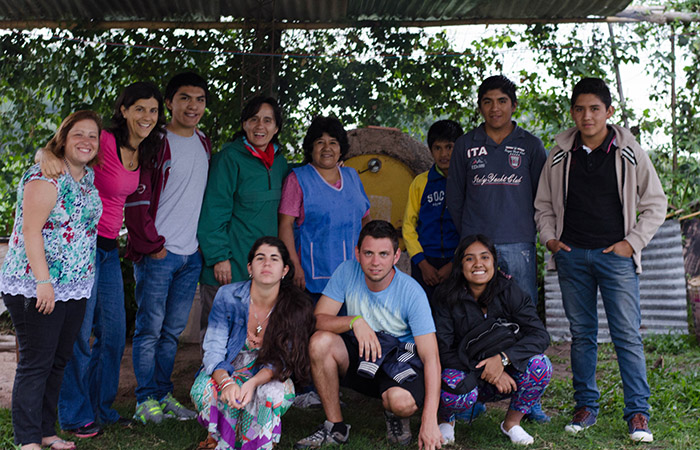 In El Espinal, a town in the province of Salta, Northern Argentina, 35 young people aged 18 to 30 from Argentina and Paraguay spent time together from 3 to 11 January, for a low-cost holiday but of “elevated levels of unity,” as they called it. In fact, also the Pastoral for Tourism –Programme for the Development of Solidal Tourism of that region also signed up for this project. This concerned firstly, living with the community and youth of the place, sharing their work in the tobacco fields with the beehive breeders and weavers, and also the typical difficulties of daily living in the countryside: cold water, lack of electricity, the mud that seems to seep through everywhere… The first point was: leaving behind commodities and prejudice. The Golden Rule “Do to others what you would like others to do to you” expressed in a nutshell what the youth of the Focolare wanted to fulfill in that community. But how were they supposed to accomplish it? It was first of all through an infinity of simple acts of love, and then with a cinema forum, meetings, an excursion, moments of relaxation, eating, dancing and singing together.… But the message was conveyed also through theatre plays that showed how El Espinal would be if everyone lived this simple rule. And who knows why this was so – perhaps for that reality “give and you shall be given” which always comes true – a competition of love triggered, where all gave their best. Maga recounts: “We will never forget how Pilar, a weaver, brought the best set of cutlery she had, to offer us a savoury soup, not to mention the ladies who set their chores aside to come and bake bread with us, and the enthusiasm of the boys and girls who fried doughnuts until late t night to make us feel at home. Then there were those who hosted us in their homes, giving us all they had to make us comfortable. There were so many new faces: and in each was Jesus who came towards us every time.” But the so-called holiday also had another objective, and this was to engage in a project to develop the Tourism Pastoral, which consisted in helping the population to see the touristic potential of their town. This was the main aim behind the organisation of activities that could later be transformed into concrete proposals for future visitors: trekking along the river, horseback riding, tractor excursions, and sight-seeing in the enchanting and hidden places of El Espinal.
In El Espinal, a town in the province of Salta, Northern Argentina, 35 young people aged 18 to 30 from Argentina and Paraguay spent time together from 3 to 11 January, for a low-cost holiday but of “elevated levels of unity,” as they called it. In fact, also the Pastoral for Tourism –Programme for the Development of Solidal Tourism of that region also signed up for this project. This concerned firstly, living with the community and youth of the place, sharing their work in the tobacco fields with the beehive breeders and weavers, and also the typical difficulties of daily living in the countryside: cold water, lack of electricity, the mud that seems to seep through everywhere… The first point was: leaving behind commodities and prejudice. The Golden Rule “Do to others what you would like others to do to you” expressed in a nutshell what the youth of the Focolare wanted to fulfill in that community. But how were they supposed to accomplish it? It was first of all through an infinity of simple acts of love, and then with a cinema forum, meetings, an excursion, moments of relaxation, eating, dancing and singing together.… But the message was conveyed also through theatre plays that showed how El Espinal would be if everyone lived this simple rule. And who knows why this was so – perhaps for that reality “give and you shall be given” which always comes true – a competition of love triggered, where all gave their best. Maga recounts: “We will never forget how Pilar, a weaver, brought the best set of cutlery she had, to offer us a savoury soup, not to mention the ladies who set their chores aside to come and bake bread with us, and the enthusiasm of the boys and girls who fried doughnuts until late t night to make us feel at home. Then there were those who hosted us in their homes, giving us all they had to make us comfortable. There were so many new faces: and in each was Jesus who came towards us every time.” But the so-called holiday also had another objective, and this was to engage in a project to develop the Tourism Pastoral, which consisted in helping the population to see the touristic potential of their town. This was the main aim behind the organisation of activities that could later be transformed into concrete proposals for future visitors: trekking along the river, horseback riding, tractor excursions, and sight-seeing in the enchanting and hidden places of El Espinal. 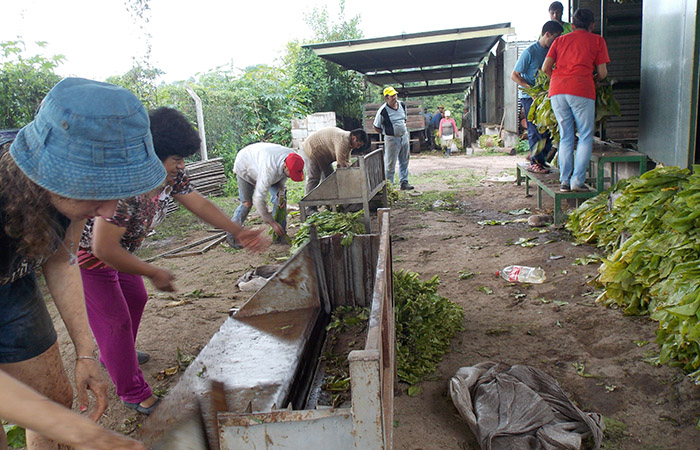 Among the breathtaking landscapes, sudden climate changes, the sun, animals and insects – at times not valued – everyone felt they could “feel God’s presence and the embrace of his creation” and also the relationships established among the youth, which were really enriching. In short, they spent a different type of holiday in the beautiful province of Salta, while adhering to Pope Francis’ invitation to live the Gospel in the outskirts. Before returning to their cities, they expressed their impressions: “I learnt a lot of things: to be happy with the little we have and not to complain, and live the golden rule. I felt loved and welcomed. All has left a deep mark in me. It was the best way to start the year. Thanks to you all, I have come closer to God.” Other impressions: “We shall leave with our hearts full of stories, experiences, their values, life, light and joy. I again discovered that if we live together for the others, everything else will come as an extra enrichment.” But also the local youth expressed themselves: “You are the best friends Jesus has given me.” “You have filled us with smiles, joy and peace.” Dominga wrote a prayer which she shared with us: “Thank you Jesus for being here and for giving me so many brothers as a gift. I discovered You in each one of them. Lord, teach us to dream big, and of beautiful things that expand our hearts.”
Among the breathtaking landscapes, sudden climate changes, the sun, animals and insects – at times not valued – everyone felt they could “feel God’s presence and the embrace of his creation” and also the relationships established among the youth, which were really enriching. In short, they spent a different type of holiday in the beautiful province of Salta, while adhering to Pope Francis’ invitation to live the Gospel in the outskirts. Before returning to their cities, they expressed their impressions: “I learnt a lot of things: to be happy with the little we have and not to complain, and live the golden rule. I felt loved and welcomed. All has left a deep mark in me. It was the best way to start the year. Thanks to you all, I have come closer to God.” Other impressions: “We shall leave with our hearts full of stories, experiences, their values, life, light and joy. I again discovered that if we live together for the others, everything else will come as an extra enrichment.” But also the local youth expressed themselves: “You are the best friends Jesus has given me.” “You have filled us with smiles, joy and peace.” Dominga wrote a prayer which she shared with us: “Thank you Jesus for being here and for giving me so many brothers as a gift. I discovered You in each one of them. Lord, teach us to dream big, and of beautiful things that expand our hearts.”
Feb 19, 2016 | Non categorizzato
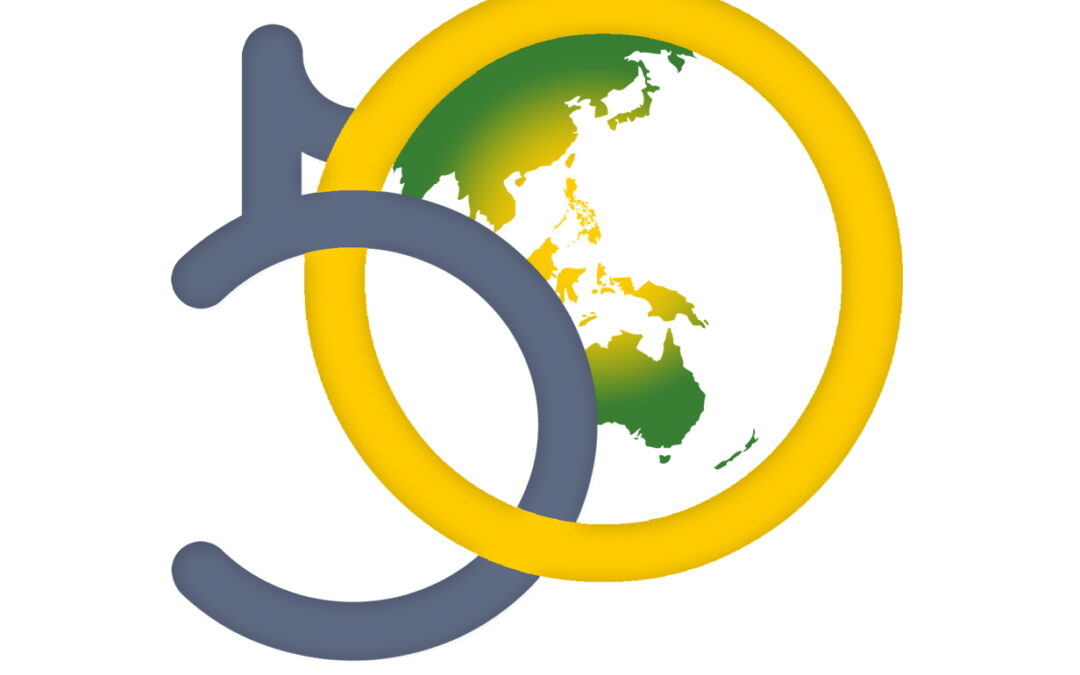
Feb 19, 2016 | Non categorizzato
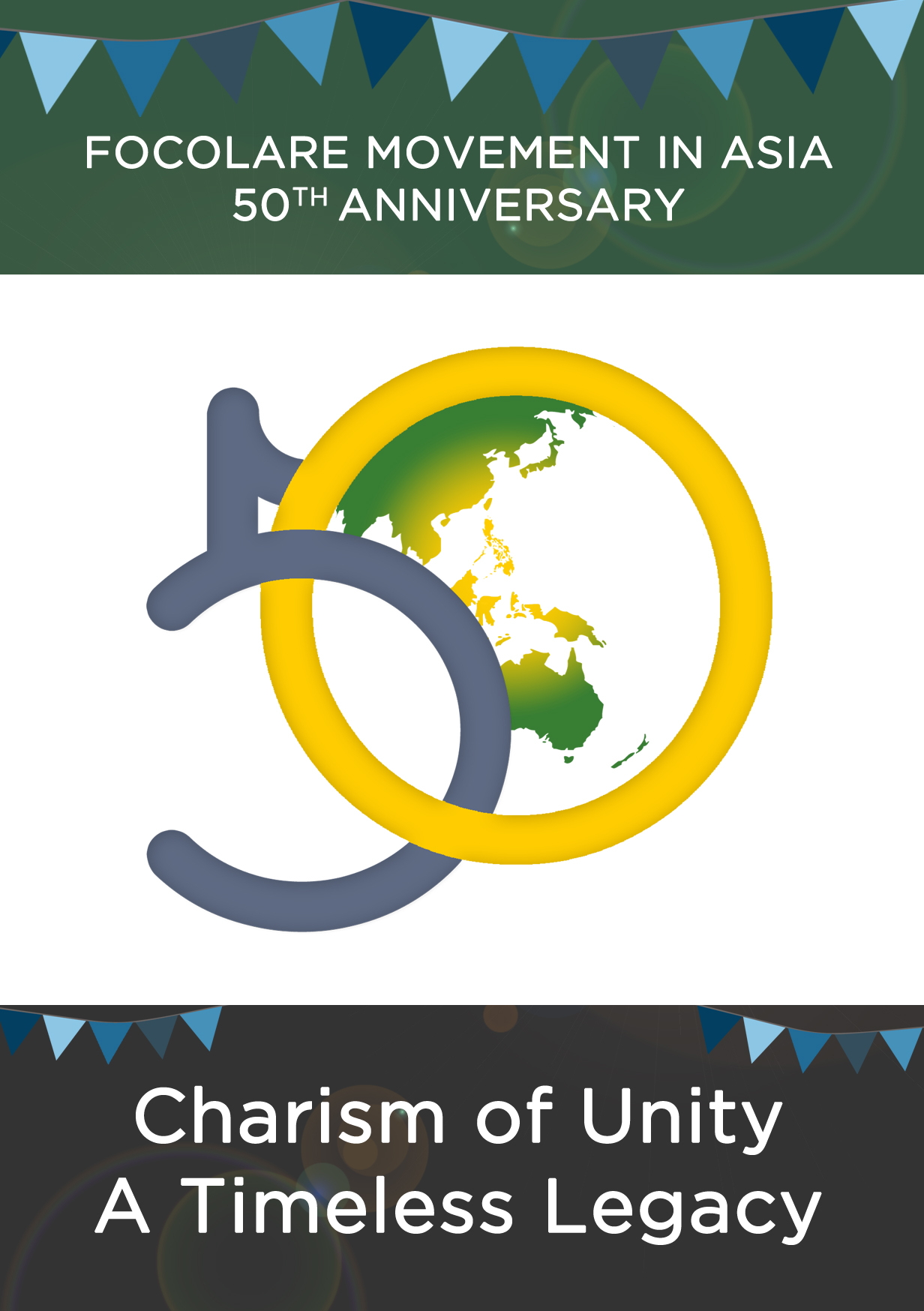

Feb 19, 2016 | Non categorizzato
Live streaming: http://www.ustream.tv/channel/feb-2013-celebration
 Fifty years ago, on February 22, 1966, a group of five men and women focolarini arrived in Manila. They were sent by Chiara Lubich in response to the request of Cardinal Rufino Santos, then Archbishop of Manila. Guido Mirti, Giovanna Vernuccio, Silvio Daneo, Ednara Tabosa and Magdalena Brandao were the first protagonists in the adventure of the Focolare in Asia. From Manila, they travelled to Japan, Korea, Hong Kong, Taiwan, India, Pakistan, Thailand, Cambodia, Vietnam … as far as Australia. The Focolare Movement spread widely throughout Asia fostering in all those who came into contact with it the spirit of unity that is its characteristic, in spite of the enormous diversity of cultures, religions and languages present in the region. “In 2016, we are planning a series of events to thank God for these fifty years of abundant graces, fruit of the meeting of the charism of unity,” write Ding Dalisay and Carlo Maria Gentile, from the Philippines. “On February 20 and 21, the whole family of Chiara present in this part of the world will gather together in Mariapolis Peace, in Tagaytay (Philippines). The first day will be ‘a homecoming’, back to our family; while on the second day, there will be a feast of thanksgiving, with artistic and cultural presentations, looking back at the story of these fifty years, to encourage us to go on, with new fervor, and continue offering our contribution towards the unity of the human family. On that occasion we will present the centers that have come up in the ‘little city’ Mariapolis Peace, at the service of the Movement throughout Asia: the School of the Oriental Religions (SOR), the Mariapolis Center, the Schools for the youth, the Centre for Priests, the House of the Seminarians, the Centers for Men Religious and for Women Religious, and the Bukas Palad and Pag-asa Social Centers. Several delegations are expected, from Korea, Japan, China, Indonesia, Thailand, Vietnam, Myanmar, India, Pakistan and Australia. Among the participants will be some among the first members of the Movement in the Philippines who have now permanently moved to the USA, thereby enriching the Focolare community in that country. The guests of honor will be the protagonists of those first times of the Focolare in Asia, who are now residing in Italy, Guatemala and Malta.” “On March 14, death anniversary of Chiara Lubich (January 22, 1920 – March 14, 2008),” continue Ding and Carlo Maria, “a Symposium will be held in Manila, on the theme: Charism of unity, a timeless legacy. This is especially intended for ecclesiastical and civil personalities so that together we may be able to reflect on the contribution that the charism of Chiara Lubich has given to the life of individuals, to communities, to the Church and society.” “In the various Mariapolis that will take place in the course of the year in the Philippines (in Davao, Cebu and Manila), they explain, one whole day will be dedicated to giving as many people as possible the opportunity to know the vitality that the spirituality of unity has brought to Asia in the fifty years of its presence here.” “Asia is also home to the great religions: Buddhism, Hinduism, Islam … For this reason, in 2017, in Thailand,” they conclude, “the 50th anniversary of the Focolare Movement will feature an interreligious event: it will be an invitation to all those who wish to join us in this walk towards the unity of the human family.”
Fifty years ago, on February 22, 1966, a group of five men and women focolarini arrived in Manila. They were sent by Chiara Lubich in response to the request of Cardinal Rufino Santos, then Archbishop of Manila. Guido Mirti, Giovanna Vernuccio, Silvio Daneo, Ednara Tabosa and Magdalena Brandao were the first protagonists in the adventure of the Focolare in Asia. From Manila, they travelled to Japan, Korea, Hong Kong, Taiwan, India, Pakistan, Thailand, Cambodia, Vietnam … as far as Australia. The Focolare Movement spread widely throughout Asia fostering in all those who came into contact with it the spirit of unity that is its characteristic, in spite of the enormous diversity of cultures, religions and languages present in the region. “In 2016, we are planning a series of events to thank God for these fifty years of abundant graces, fruit of the meeting of the charism of unity,” write Ding Dalisay and Carlo Maria Gentile, from the Philippines. “On February 20 and 21, the whole family of Chiara present in this part of the world will gather together in Mariapolis Peace, in Tagaytay (Philippines). The first day will be ‘a homecoming’, back to our family; while on the second day, there will be a feast of thanksgiving, with artistic and cultural presentations, looking back at the story of these fifty years, to encourage us to go on, with new fervor, and continue offering our contribution towards the unity of the human family. On that occasion we will present the centers that have come up in the ‘little city’ Mariapolis Peace, at the service of the Movement throughout Asia: the School of the Oriental Religions (SOR), the Mariapolis Center, the Schools for the youth, the Centre for Priests, the House of the Seminarians, the Centers for Men Religious and for Women Religious, and the Bukas Palad and Pag-asa Social Centers. Several delegations are expected, from Korea, Japan, China, Indonesia, Thailand, Vietnam, Myanmar, India, Pakistan and Australia. Among the participants will be some among the first members of the Movement in the Philippines who have now permanently moved to the USA, thereby enriching the Focolare community in that country. The guests of honor will be the protagonists of those first times of the Focolare in Asia, who are now residing in Italy, Guatemala and Malta.” “On March 14, death anniversary of Chiara Lubich (January 22, 1920 – March 14, 2008),” continue Ding and Carlo Maria, “a Symposium will be held in Manila, on the theme: Charism of unity, a timeless legacy. This is especially intended for ecclesiastical and civil personalities so that together we may be able to reflect on the contribution that the charism of Chiara Lubich has given to the life of individuals, to communities, to the Church and society.” “In the various Mariapolis that will take place in the course of the year in the Philippines (in Davao, Cebu and Manila), they explain, one whole day will be dedicated to giving as many people as possible the opportunity to know the vitality that the spirituality of unity has brought to Asia in the fifty years of its presence here.” “Asia is also home to the great religions: Buddhism, Hinduism, Islam … For this reason, in 2017, in Thailand,” they conclude, “the 50th anniversary of the Focolare Movement will feature an interreligious event: it will be an invitation to all those who wish to join us in this walk towards the unity of the human family.”
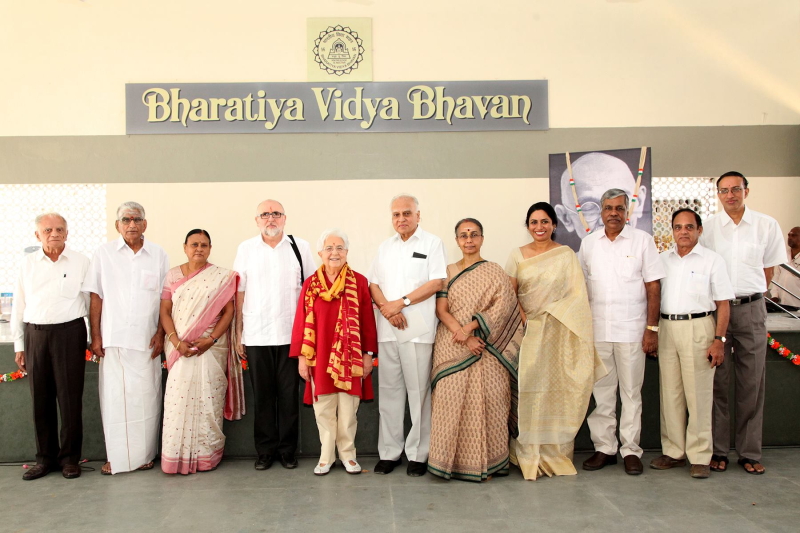
Feb 18, 2016 | Non categorizzato
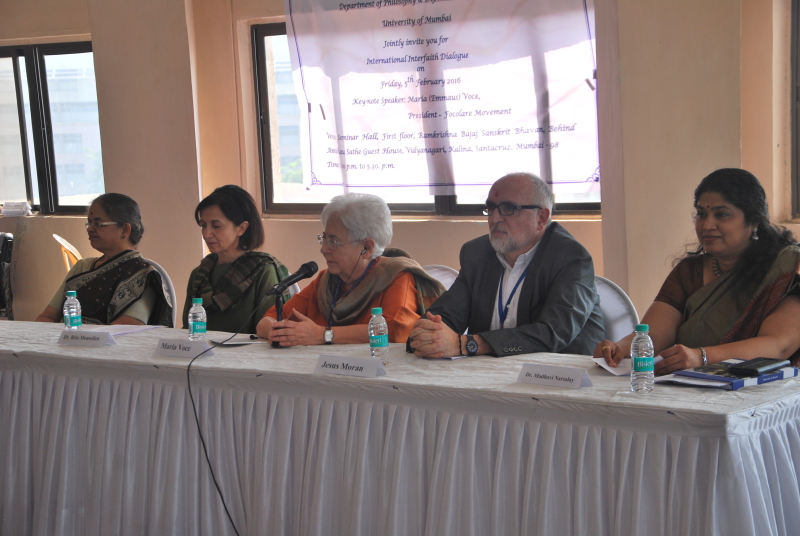
© CSC Audiovisivi – All rights reserved
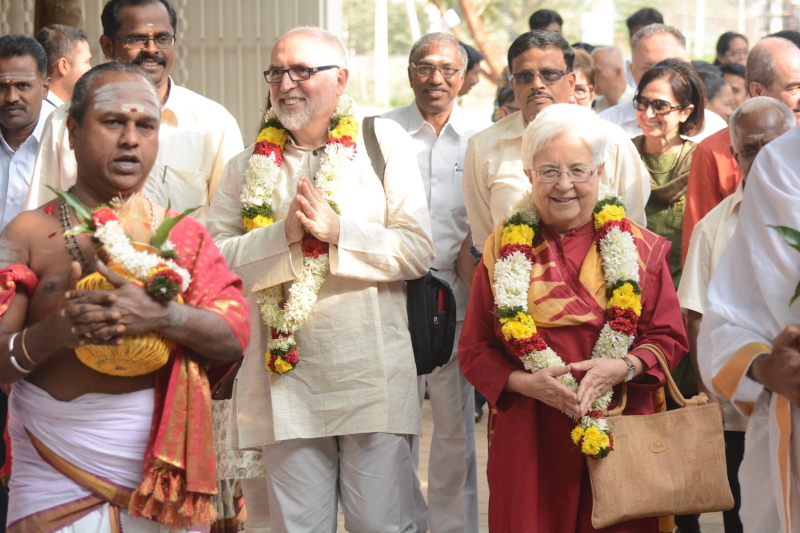
© CSC Audiovisivi – All rights reserved
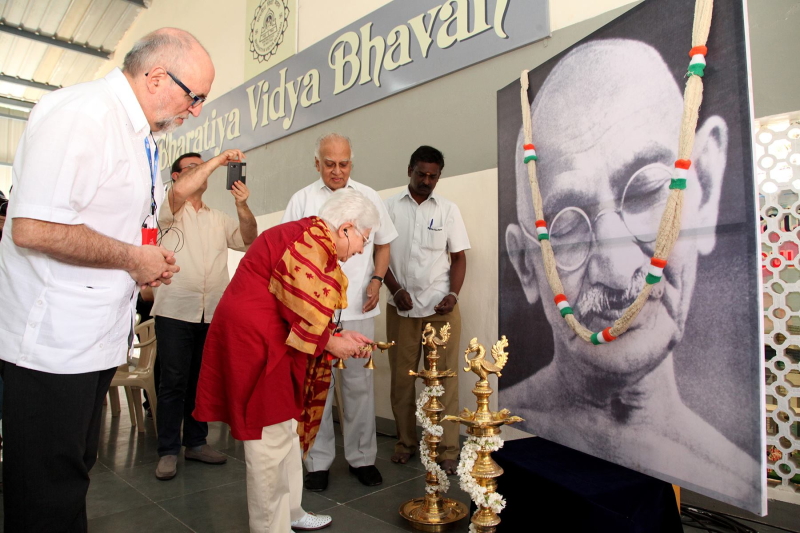
© CSC Audiovisivi – All rights reserved

© CSC Audiovisivi – All rights reserved
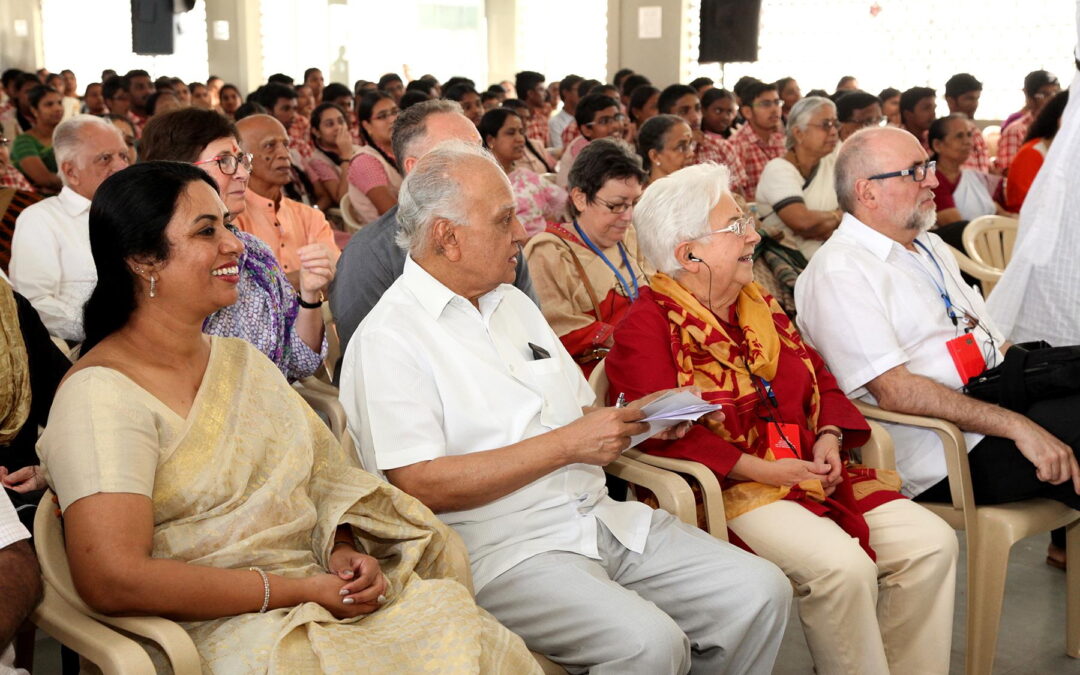
Feb 17, 2016 | Non categorizzato
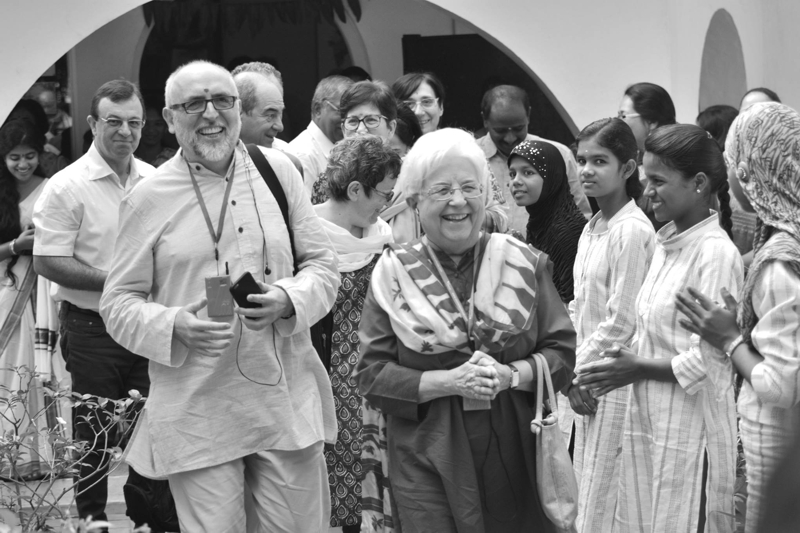
Photo © Donald Dsouza
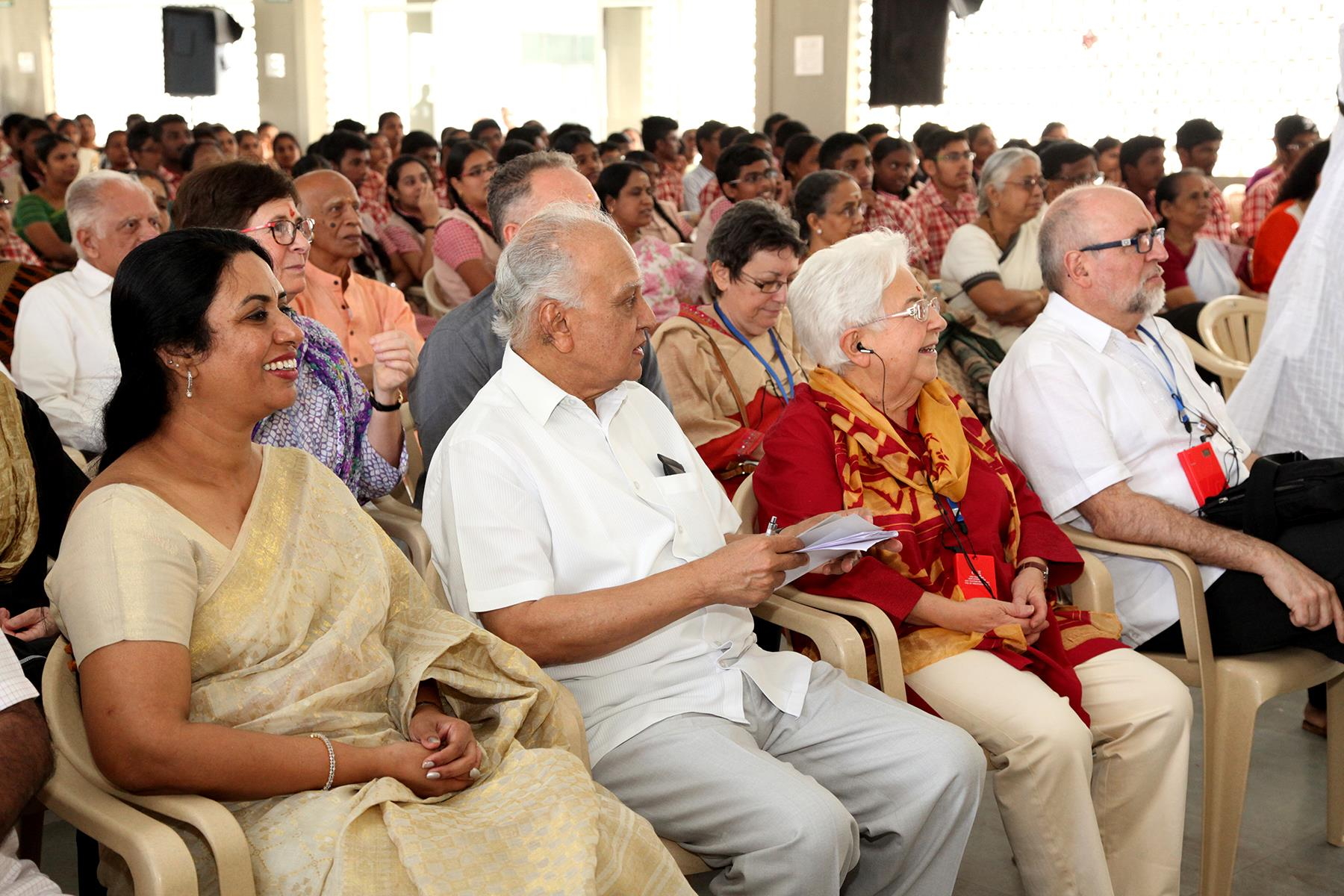
CSC Audiovisivi – All rights reserved
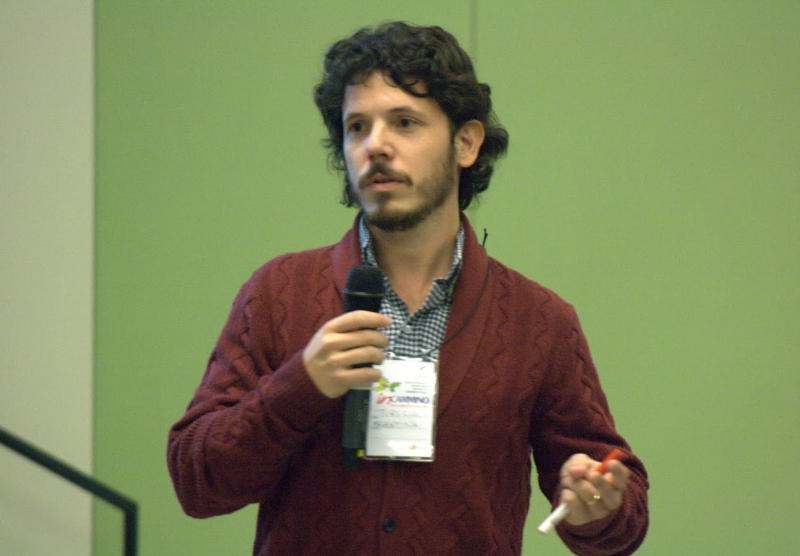
Feb 17, 2016 | Non categorizzato
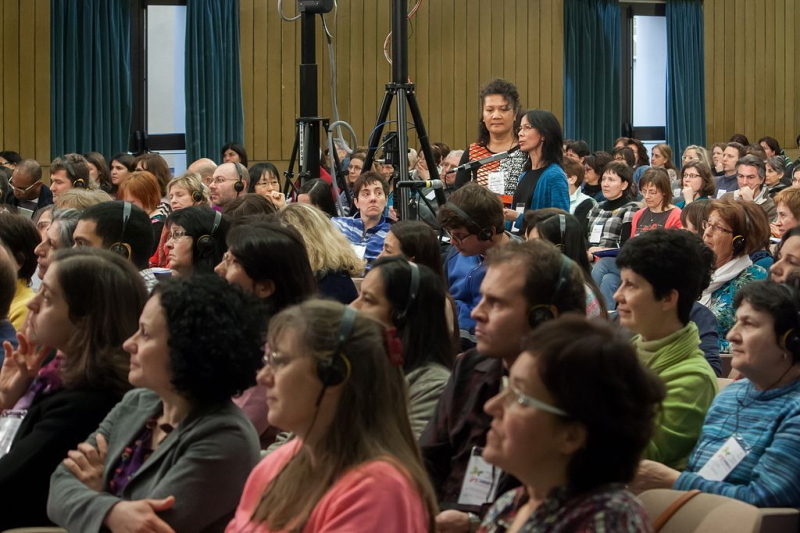 There was overwhelming agreement amongst the 400 youth workers who attended the conference, that they had chosen their profession because of love and not because of the career. Some of the topics discussed included: accompanying adolescents; role of the teacher; educating to do what is difficult; the community as educator. Vince and Make are from Melbourne, Australia. “I’m originally from Futuna – one more step and you fall off the globe!” Make joked. “When I went to visit a small community on the Island of Kiribati, the children were surprised by the presence of a stranger, and then suprised by the fact that I played games with them. I ran for two hours even though I’m no longer the right age that. We didn’t speak the same language, but a special relationship was created between us.
There was overwhelming agreement amongst the 400 youth workers who attended the conference, that they had chosen their profession because of love and not because of the career. Some of the topics discussed included: accompanying adolescents; role of the teacher; educating to do what is difficult; the community as educator. Vince and Make are from Melbourne, Australia. “I’m originally from Futuna – one more step and you fall off the globe!” Make joked. “When I went to visit a small community on the Island of Kiribati, the children were surprised by the presence of a stranger, and then suprised by the fact that I played games with them. I ran for two hours even though I’m no longer the right age that. We didn’t speak the same language, but a special relationship was created between us. 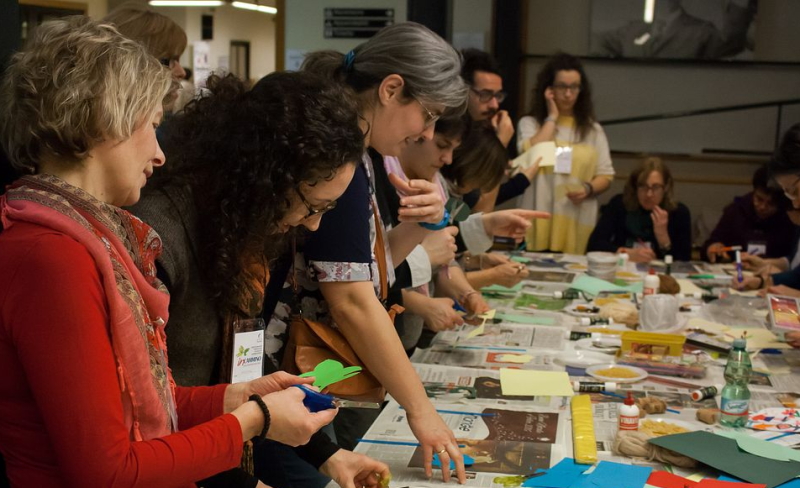 What is their educational model? They call it a person-relationship model in which one is able to love and be loved. It is rooted in the thought of Chiara Lubich. Her influence on the field of education is being developed by a group of researchers in the area of pedagogy and by the Abba School and the Sophia University Institute whose graduates were among the presenters. There were ample offerings for every age group, covering topics such as global education; types of group animators; group dynamics; conflict resolution; investigations on faith and reason; lifestyle and the environment; gender; addiction and mass media. Several interactive activities explored expressing emotions through dance; theatre; puppetting; shaping balloons; arts and crafts; video-making; photography and using shapes and images.
What is their educational model? They call it a person-relationship model in which one is able to love and be loved. It is rooted in the thought of Chiara Lubich. Her influence on the field of education is being developed by a group of researchers in the area of pedagogy and by the Abba School and the Sophia University Institute whose graduates were among the presenters. There were ample offerings for every age group, covering topics such as global education; types of group animators; group dynamics; conflict resolution; investigations on faith and reason; lifestyle and the environment; gender; addiction and mass media. Several interactive activities explored expressing emotions through dance; theatre; puppetting; shaping balloons; arts and crafts; video-making; photography and using shapes and images. 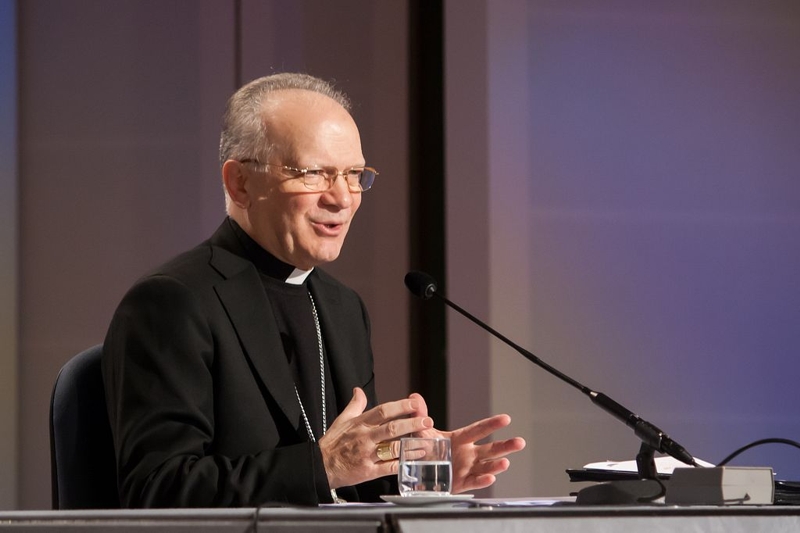 It was all a concrete opportunity to “put head, heart and hands to work,” to experience it and then live it along with the children. This educational method is particularly dear to the heart of Pope Francis (see World Congress on Education, Rome, Italy, November 2015). During his presentation, Msgr Vincenzo Zani, Secretary of the Congregation for Catholic Education offered Pope Francis’s vision for education to all the formators at Castel Gandolfo from February 5-10, 2015.
It was all a concrete opportunity to “put head, heart and hands to work,” to experience it and then live it along with the children. This educational method is particularly dear to the heart of Pope Francis (see World Congress on Education, Rome, Italy, November 2015). During his presentation, Msgr Vincenzo Zani, Secretary of the Congregation for Catholic Education offered Pope Francis’s vision for education to all the formators at Castel Gandolfo from February 5-10, 2015. 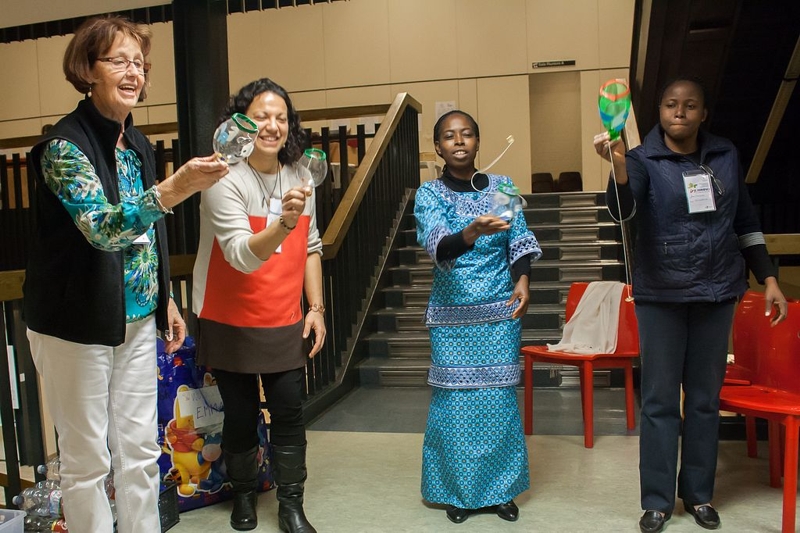 Today’s educators must be master risk-takers, brave explorers, humble builders of relationships – never by themselves but as members of the community in which they operate. Today’s educators experience failures, but never give up, so that they can teach others to never give up. Above all an educator should strive to be authentic, a credible witness. Teachers often find themselves involved with children living through difficult situations. These children suffer because of family instability or violence . . . but at least there is one person in their lives who plants some seeds of hope. It is always possible to begin again, helping them to activate what in the technical jargon is termed resiliance, drawing on one’s own resources to face difficulties, to adapt and to overcome.
Today’s educators must be master risk-takers, brave explorers, humble builders of relationships – never by themselves but as members of the community in which they operate. Today’s educators experience failures, but never give up, so that they can teach others to never give up. Above all an educator should strive to be authentic, a credible witness. Teachers often find themselves involved with children living through difficult situations. These children suffer because of family instability or violence . . . but at least there is one person in their lives who plants some seeds of hope. It is always possible to begin again, helping them to activate what in the technical jargon is termed resiliance, drawing on one’s own resources to face difficulties, to adapt and to overcome.  “There is a need to acquire more skills,” explained Argentinian psychologist Arturo Clariá “also from the fields of sociology and psychology, coming up with strategies for working together, so that we can be responsible companions for our young charges, with our gaze always fixed on the transcendent. In contrast to educators from across the world who are immersed in the problems of the current cultures, in a globalised world that has led to the loss of meaning and self-esteem, and to problems in fulfilling the plan for one’s life. At times you don’t know what to do. How are we to face such a fluid society? The educator is not the holder of knowledge, but the director of an orchestra in which each player can play his or her instrument, and the educator must draw out the harmony from each musician.” This is an educational approach that moves beyond enclosed spaces and reaches the level of feelings, social skills and values: “This is how a culture of brotherhood and peace will be created.” Photo gallery: https://goo.gl/photos/BjmCh1FPnXaxyBQh8 Facebook: In Cammino Educarsi per Educare
“There is a need to acquire more skills,” explained Argentinian psychologist Arturo Clariá “also from the fields of sociology and psychology, coming up with strategies for working together, so that we can be responsible companions for our young charges, with our gaze always fixed on the transcendent. In contrast to educators from across the world who are immersed in the problems of the current cultures, in a globalised world that has led to the loss of meaning and self-esteem, and to problems in fulfilling the plan for one’s life. At times you don’t know what to do. How are we to face such a fluid society? The educator is not the holder of knowledge, but the director of an orchestra in which each player can play his or her instrument, and the educator must draw out the harmony from each musician.” This is an educational approach that moves beyond enclosed spaces and reaches the level of feelings, social skills and values: “This is how a culture of brotherhood and peace will be created.” Photo gallery: https://goo.gl/photos/BjmCh1FPnXaxyBQh8 Facebook: In Cammino Educarsi per Educare
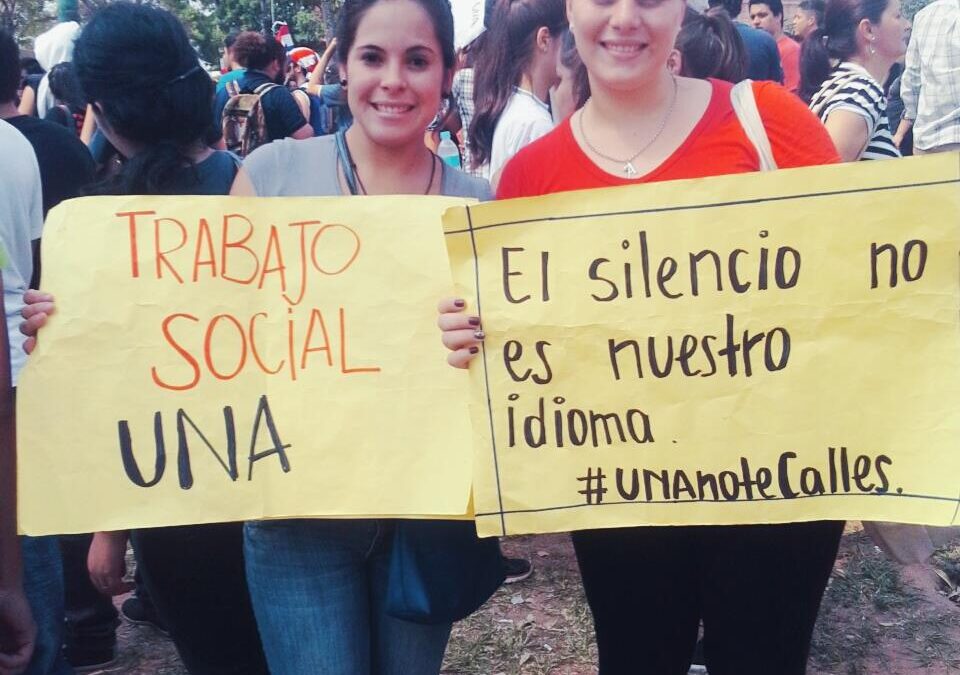
Feb 16, 2016 | Focolare Worldwide
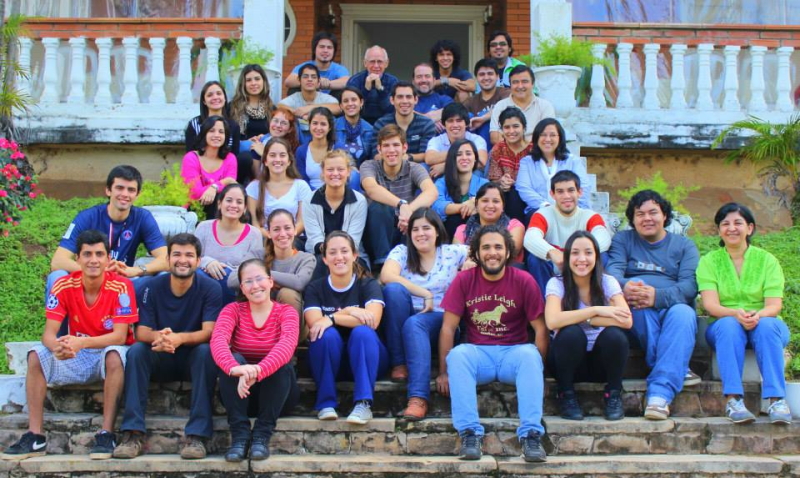 Thousands of university students have denounced the rampaging corruption in the country’s main state university, the Università Nazionale of Asunción (UNA). A long austere spring ended with chain resignations of the academic authorities, and negotiations on the reforms of a statute drafted during the dictatorship. The university youth surprised everyone with their seriousness and organisation. In the month in which the campus was occupied, they created a true and proper “alternative State.” There were watch shifts at the doors, inspection of bags and car boots to prevent the introduction of alcoholic beverages, efficient orders for food and essential services, and oganisation of a supplementary school calendar, with the help of professors and graduating students. And now the schedule of exams has been adjusted so that no one would lose the semester. They furthermore demonstrated intelligence in not allowing themselves to be exploited by anybody. Their reference point and model was Pope Francis who had met thousands of young people in his visit to Paraguay. His appeal to “raise a din and then organise it,” was fully heeded. Among the leaders of the pacific revolt was #UNAnotecalles (“UNA speak up”), the youth of the Focolare. Alejandra and Cecilia, Medicine and Engineering students, respectively, said: “It all started with a sit-in before the Rector’s building, to demonstrate our indignation with regard to the latest reports of corruption. Every day there was a peaceful demonstration during which the mike was passed around to the students, professors and officers. Then came a permanent wake around the building, with a strike of the students to demand the resignation of the Rector and his assistants. The support of the people who provided food and other forms of aid, gave us the strength not to give up our battle, and made us see that it was a struggle for everyone’s good. After 40 days the Rector resigned along with five officers and another 38 were indicted, followed by the resignation of all the faculty deans. What was fundamental for us was to live this phase with all the Gen studying in the UNA university, and also with the others who expressed their support in various ways. Certain of Jesus’s promise to be among us if we unite in His name, we did our best to make it a reality. He was our guiding light in defending the evangelical values of love, truth and justice, and overcoming the many difficult moments. At times it was not easy to control the crowd that seemed to be overwhelmed by emotions. In those instants, when the right thing to do was not clear, we tried to decide together how to act and what decision to make.
Thousands of university students have denounced the rampaging corruption in the country’s main state university, the Università Nazionale of Asunción (UNA). A long austere spring ended with chain resignations of the academic authorities, and negotiations on the reforms of a statute drafted during the dictatorship. The university youth surprised everyone with their seriousness and organisation. In the month in which the campus was occupied, they created a true and proper “alternative State.” There were watch shifts at the doors, inspection of bags and car boots to prevent the introduction of alcoholic beverages, efficient orders for food and essential services, and oganisation of a supplementary school calendar, with the help of professors and graduating students. And now the schedule of exams has been adjusted so that no one would lose the semester. They furthermore demonstrated intelligence in not allowing themselves to be exploited by anybody. Their reference point and model was Pope Francis who had met thousands of young people in his visit to Paraguay. His appeal to “raise a din and then organise it,” was fully heeded. Among the leaders of the pacific revolt was #UNAnotecalles (“UNA speak up”), the youth of the Focolare. Alejandra and Cecilia, Medicine and Engineering students, respectively, said: “It all started with a sit-in before the Rector’s building, to demonstrate our indignation with regard to the latest reports of corruption. Every day there was a peaceful demonstration during which the mike was passed around to the students, professors and officers. Then came a permanent wake around the building, with a strike of the students to demand the resignation of the Rector and his assistants. The support of the people who provided food and other forms of aid, gave us the strength not to give up our battle, and made us see that it was a struggle for everyone’s good. After 40 days the Rector resigned along with five officers and another 38 were indicted, followed by the resignation of all the faculty deans. What was fundamental for us was to live this phase with all the Gen studying in the UNA university, and also with the others who expressed their support in various ways. Certain of Jesus’s promise to be among us if we unite in His name, we did our best to make it a reality. He was our guiding light in defending the evangelical values of love, truth and justice, and overcoming the many difficult moments. At times it was not easy to control the crowd that seemed to be overwhelmed by emotions. In those instants, when the right thing to do was not clear, we tried to decide together how to act and what decision to make.
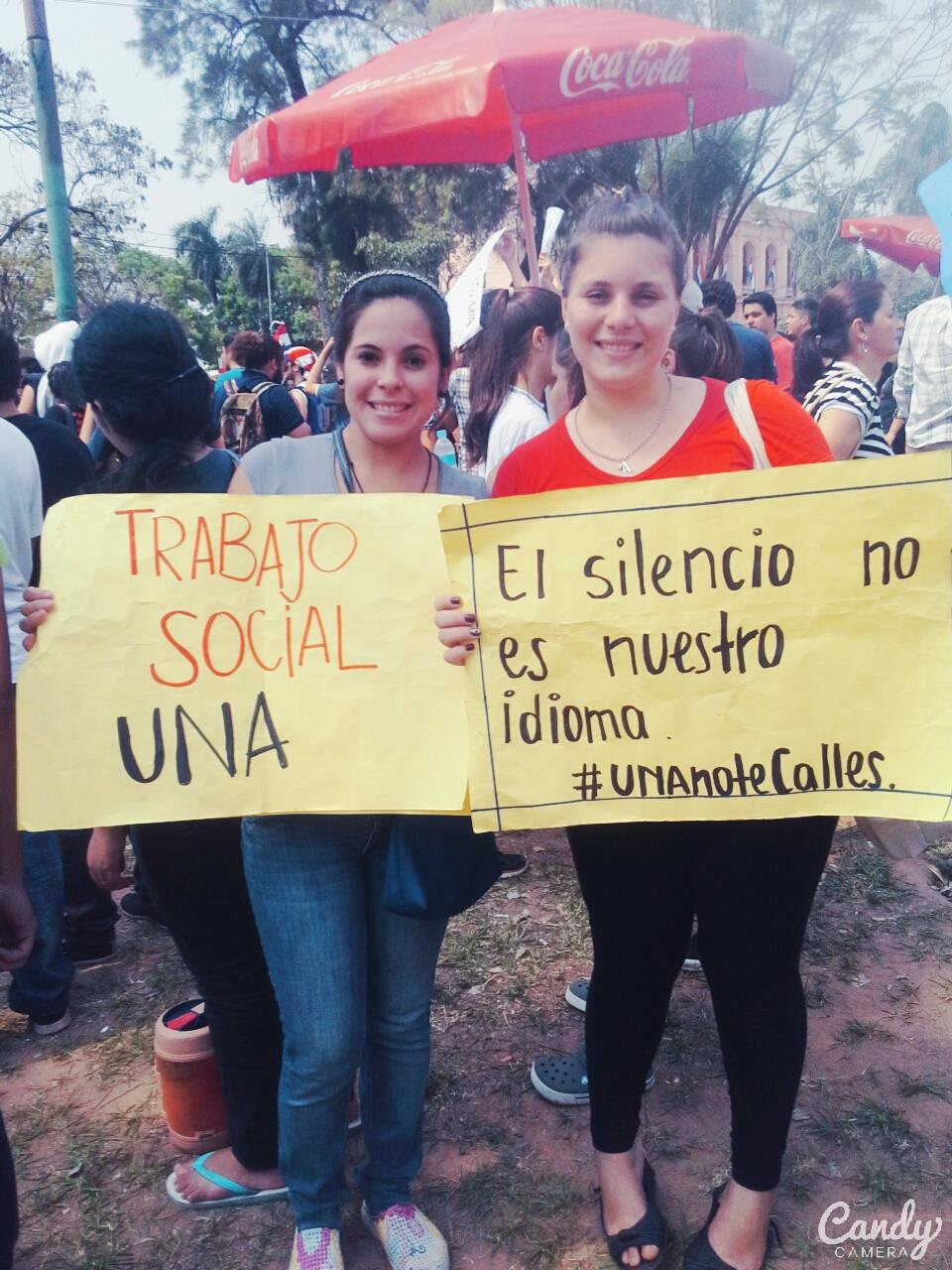
Leticia (left)
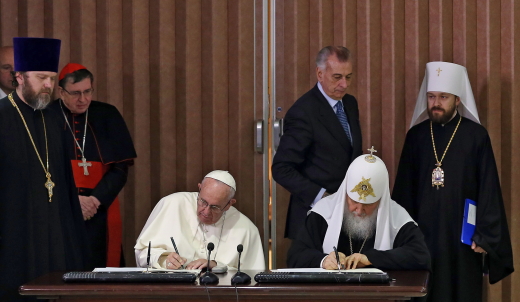
Feb 15, 2016 | Focolare Worldwide
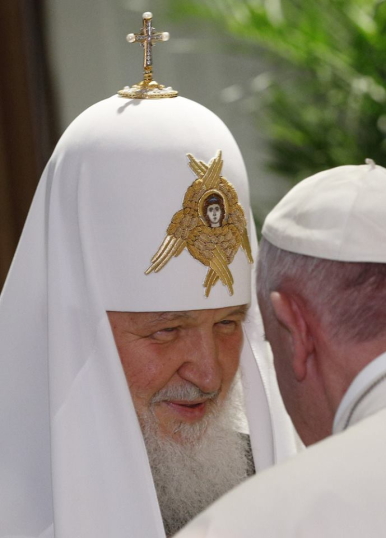 The Airport of Havana, Cuba, hosted the first meeting in history between the Bishop of Rome and the Patriarch of Moscow, on February 12, 2016. It was a fraternal encounter “between bishops’ that “gave an opportunity to listen and understand each other’s positions” said Patriarch Kirill at the conclusion of the meeting. Among the common concerns were the desire for peace and the defence of persecuted Christians around the world. “I felt the consolation of the Holy Spirit in this dialogue,” Pope Francis remarked, with the prospect of “a series of initiatives” to be carried forward together. “We are not competitors but brothers, and this concept must guide all our mutual actions as well as those directed to the outside world,” states the Joint Declaration that was signed by the Pope and the Patriarch. The declaration calls for common efforts between Roman Catholic and Orthodox Christians, and overcoming the historic divergences we have inherited, responding together to the challenges of today’s world. Christians are now victims of persecutions and violence in Syria, Iraq and other Middle East countries. Other challenges include the fight against terrorism, interreligious dialogue, European integration and respect for religious identities. The document also mentions social and ethical topics, with “pastoral” concern, as Pope Francis stressed while speaking with journalists on the flight between Cuba and Mexico: poverty, the breakdown of the family, the right to life (abortion, euthanasia and assisted reproduction), young people and peace in Ukraine. Much of the future of humanity will depend on our capacity to give shared witness to the Spirit of truth in these difficult times,” the document goes on to say.
The Airport of Havana, Cuba, hosted the first meeting in history between the Bishop of Rome and the Patriarch of Moscow, on February 12, 2016. It was a fraternal encounter “between bishops’ that “gave an opportunity to listen and understand each other’s positions” said Patriarch Kirill at the conclusion of the meeting. Among the common concerns were the desire for peace and the defence of persecuted Christians around the world. “I felt the consolation of the Holy Spirit in this dialogue,” Pope Francis remarked, with the prospect of “a series of initiatives” to be carried forward together. “We are not competitors but brothers, and this concept must guide all our mutual actions as well as those directed to the outside world,” states the Joint Declaration that was signed by the Pope and the Patriarch. The declaration calls for common efforts between Roman Catholic and Orthodox Christians, and overcoming the historic divergences we have inherited, responding together to the challenges of today’s world. Christians are now victims of persecutions and violence in Syria, Iraq and other Middle East countries. Other challenges include the fight against terrorism, interreligious dialogue, European integration and respect for religious identities. The document also mentions social and ethical topics, with “pastoral” concern, as Pope Francis stressed while speaking with journalists on the flight between Cuba and Mexico: poverty, the breakdown of the family, the right to life (abortion, euthanasia and assisted reproduction), young people and peace in Ukraine. Much of the future of humanity will depend on our capacity to give shared witness to the Spirit of truth in these difficult times,” the document goes on to say.  “Here in Moscow there is also the feeling that this was an important and historic meeting” writes focolarina Anna Gloria from the focolare in Moscow. The mass media are talking about it a lot. Bishop Paolo Pezzi invited everyone to the Cathedral of the Immaculate Conception to pray for unity. It was quite beautiful. There were Catholics and Orthodox from several movements and communities. Everyone feels that an important step towards unity has been taken.” Despite recent tensions between Moscow and Rome, the Russian Orthodox Church has a long history of seeking the reconciliation of the divided Christian churches. Father Hyacinthe Destivelle said so during an interview with the Vatican Radio. He is in charge of relations with the Slavic Orthodox Churches at the Pontifical Council for Christian Unity and was in Cuba for the meeting. Father Destivelle also explained that “the Russian Orthodox Church is fifth in the traditional order of authority among the 14 autocephalous Orthodox Churches. First position belongs to the Patriarchate of Constantinople, with a primacy of honour. It has a special relationship with the Holy See.” “The significance of the meeting between Pope Francis and Patriarch Kirill can also be seen in light of history with the Russian Orthodox Church,” where it “can act as a bridge between East and West.” Father Destivelle also gave other examples of how the Russian Orthodox Church was an active pioneer in ecumenical relations. It was the first Church to send observers during the Second Vatican Council. During their private meeting, Pope Francis and Patriarch Kirill also discussed the upcoming Pan-Orthodox Council scheduled for June 2016 in Crete. It will ”gather all the Orthodox churches for an Orthodox Synod,” Dr. Dimitrios Keramidas recently explained at an ecumenical school of the Focolare Movement, “this is not an event that is inserted into ecclesial life, but rather the official manifestation of the communional essence of the Church, the on-going and uninterrupted journey of the People of God.” It is a journey towards unity.
“Here in Moscow there is also the feeling that this was an important and historic meeting” writes focolarina Anna Gloria from the focolare in Moscow. The mass media are talking about it a lot. Bishop Paolo Pezzi invited everyone to the Cathedral of the Immaculate Conception to pray for unity. It was quite beautiful. There were Catholics and Orthodox from several movements and communities. Everyone feels that an important step towards unity has been taken.” Despite recent tensions between Moscow and Rome, the Russian Orthodox Church has a long history of seeking the reconciliation of the divided Christian churches. Father Hyacinthe Destivelle said so during an interview with the Vatican Radio. He is in charge of relations with the Slavic Orthodox Churches at the Pontifical Council for Christian Unity and was in Cuba for the meeting. Father Destivelle also explained that “the Russian Orthodox Church is fifth in the traditional order of authority among the 14 autocephalous Orthodox Churches. First position belongs to the Patriarchate of Constantinople, with a primacy of honour. It has a special relationship with the Holy See.” “The significance of the meeting between Pope Francis and Patriarch Kirill can also be seen in light of history with the Russian Orthodox Church,” where it “can act as a bridge between East and West.” Father Destivelle also gave other examples of how the Russian Orthodox Church was an active pioneer in ecumenical relations. It was the first Church to send observers during the Second Vatican Council. During their private meeting, Pope Francis and Patriarch Kirill also discussed the upcoming Pan-Orthodox Council scheduled for June 2016 in Crete. It will ”gather all the Orthodox churches for an Orthodox Synod,” Dr. Dimitrios Keramidas recently explained at an ecumenical school of the Focolare Movement, “this is not an event that is inserted into ecclesial life, but rather the official manifestation of the communional essence of the Church, the on-going and uninterrupted journey of the People of God.” It is a journey towards unity.
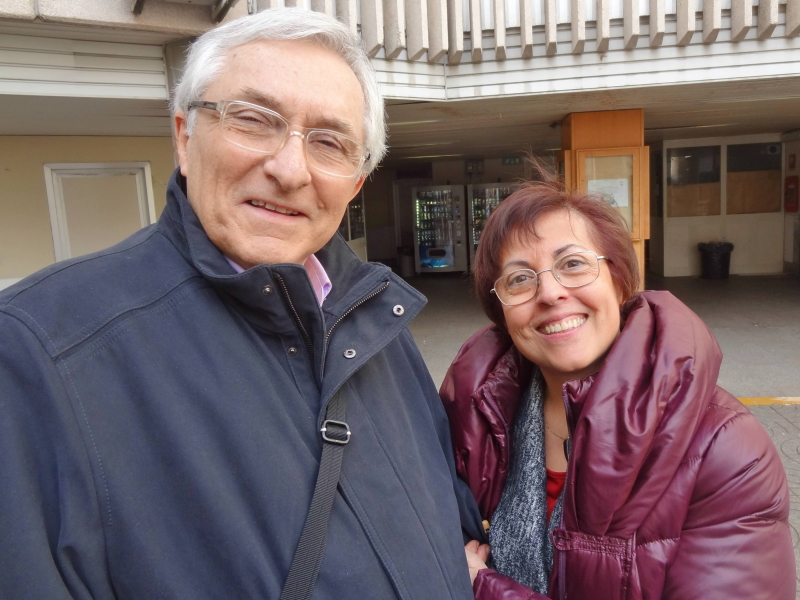
Feb 15, 2016 | Focolare Worldwide
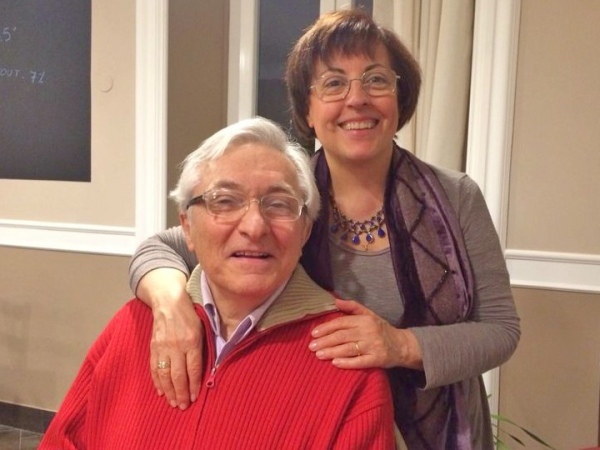 “When I left my home for the bank I was working at 21 years ago, I certainly wasn’t thinking that I wouldn’t return home that night. A strong headache forced my colleagues to take me to hospital. I was 49 years old with a well-established professional career, an upcoming promotion, a beautiful family with three daughters between 14 and 18. Suddenly and unexpectedly I found myself in a wheelchair that I was unable to control because, along with the use of my legs, I had also lost the use of my arms. I had been turned into nothing: I needed help eating, bathing and dressing. . . I was totally dependent on others. I was feeling desperate and anxious, feelings that I tried to reject because I knew they weren’t the solution. From when I embraced the spirituality of the Focolare, I have learned to be totally disposed to God’s will, and even though I didn’t understand the reason for this nightmare, my wife and I wanted to believe that it too was God’s love for me, for us. My daughters also shared in our decision and, right from the first days I found strength and patience that I never dreamed of finding. In a few months I regained the use of my legs and, with great effort and the support of a colleague who accompanied me was able to go back to work for another 7 years. Then I just couldn’t do it anymore.”
“When I left my home for the bank I was working at 21 years ago, I certainly wasn’t thinking that I wouldn’t return home that night. A strong headache forced my colleagues to take me to hospital. I was 49 years old with a well-established professional career, an upcoming promotion, a beautiful family with three daughters between 14 and 18. Suddenly and unexpectedly I found myself in a wheelchair that I was unable to control because, along with the use of my legs, I had also lost the use of my arms. I had been turned into nothing: I needed help eating, bathing and dressing. . . I was totally dependent on others. I was feeling desperate and anxious, feelings that I tried to reject because I knew they weren’t the solution. From when I embraced the spirituality of the Focolare, I have learned to be totally disposed to God’s will, and even though I didn’t understand the reason for this nightmare, my wife and I wanted to believe that it too was God’s love for me, for us. My daughters also shared in our decision and, right from the first days I found strength and patience that I never dreamed of finding. In a few months I regained the use of my legs and, with great effort and the support of a colleague who accompanied me was able to go back to work for another 7 years. Then I just couldn’t do it anymore.” 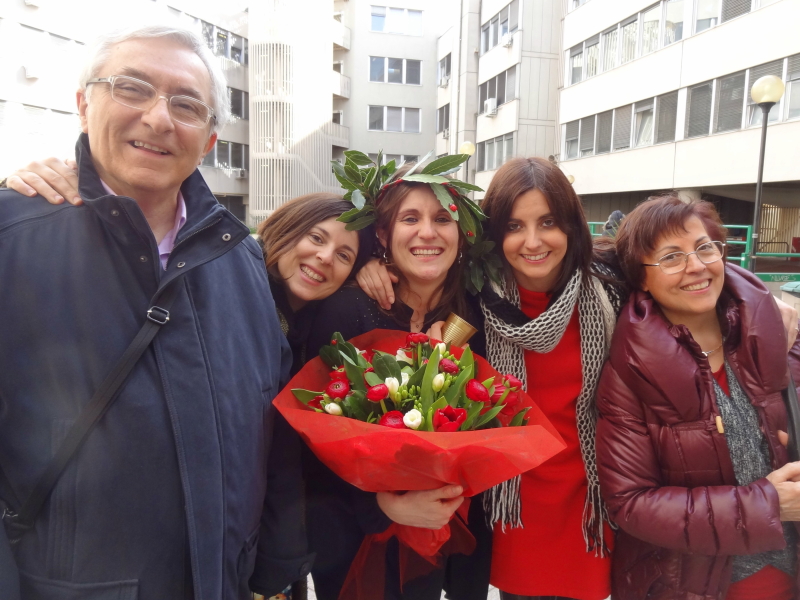 Already then, I wasn’t able to walk because of my handicap, if not just for short distances. I could no longer drive the car, take a shower alone, button my clothing, cut the food on my plate, turn on the coffee machine or embrace my wife and children. I couldn’t do any of those things that required the use of two hands. At times the fear was even bitterer. Fear of not being able go on living as a couple, fear of the solitude, of my fragility in the face of different situations, fear of the doubt about whether I would be able to continue in my role as father, and so on. Now, with much effort I continue with physiotherapy, even though I know that healing isn’t on the landscape. At least it slows the process of debilitation. During these 21 years God has never failed to accompany me with refined faithfulness, delicateness and tenderness that only He knows how to give. Pina and I have learned to let ourselves me carried by Him, to let ourselves be surprised by His Love. And when everything seemed to crumble, or became unstable, deep in our heart we understood that this partaking – in some way – in the mystery of Jesus on the Cross, was a privilege for us. Like Him, we try to overcome the pain by loving everyone around us, experiencing what could be called a ‘divine alchemy’ wherein suffering is like a talent to be turned into love.
Already then, I wasn’t able to walk because of my handicap, if not just for short distances. I could no longer drive the car, take a shower alone, button my clothing, cut the food on my plate, turn on the coffee machine or embrace my wife and children. I couldn’t do any of those things that required the use of two hands. At times the fear was even bitterer. Fear of not being able go on living as a couple, fear of the solitude, of my fragility in the face of different situations, fear of the doubt about whether I would be able to continue in my role as father, and so on. Now, with much effort I continue with physiotherapy, even though I know that healing isn’t on the landscape. At least it slows the process of debilitation. During these 21 years God has never failed to accompany me with refined faithfulness, delicateness and tenderness that only He knows how to give. Pina and I have learned to let ourselves me carried by Him, to let ourselves be surprised by His Love. And when everything seemed to crumble, or became unstable, deep in our heart we understood that this partaking – in some way – in the mystery of Jesus on the Cross, was a privilege for us. Like Him, we try to overcome the pain by loving everyone around us, experiencing what could be called a ‘divine alchemy’ wherein suffering is like a talent to be turned into love.  God took me/us by the hand and, little by little revealing his plan for us, led us into deep intimacy with Him among us, making us understand the mystery of suffering – in the light. And what could be considered a limit has been transformed into richness, what could have stopped us has been turned into a race. Not even an invasive handicap can take away the possibility of being a tool in God’s hands for our neighbor.” Giulio Ciarrocchi
God took me/us by the hand and, little by little revealing his plan for us, led us into deep intimacy with Him among us, making us understand the mystery of suffering – in the light. And what could be considered a limit has been transformed into richness, what could have stopped us has been turned into a race. Not even an invasive handicap can take away the possibility of being a tool in God’s hands for our neighbor.” Giulio Ciarrocchi

Feb 14, 2016 | Non categorizzato
 “How will we celebrate St. Valentines? We don’t know yet. Any occasion is fine for surprising the other with something nice, hiding last-minute gifts.” Iris is a 26 year-old Brazilian. She is in Italy on an international cooperative project. She is engaged to Antonello, an Economics graduate, waiting for a job that is more in tune with his academic background. He works shifts at a call centre. When they first met, Iris was a bit reluctant about beginning a new relationship, because she had been previously disappointed by love. But Antonello managed to get her cell phone number and with his fantastic text messages, finally convinced her to give it another try. “The more we met, the more I realised I was in love,” Iris admits, “and we began to make plans.” “What kind of plans?” we asked. “First of all,” says Antonello, “I wanted to introduce her to my parents. Then we travelled to Brazil to meet her parents. Meanwhile, we were discovering each other’s cultures and different religious beliefs. Iris is deeply Catholic. I have a more humanistic view of things. But even if we come from different paths, we’re both convinced of the beauty of marriage, and that it is a profoundly human and sacred act.” Iris recounts: “That exchange – which for me, accustomed to certainties that were too often taken for granted – wasn’t easy. But it helped us to realise how strong our love was, a love that made us grow as human beings: I became more of a woman, and Antonello more of a man. It also led us to our decision that we would get married when we were financially independent.” Their certainty is disarming, considering the many couples around them whose relationships have failed, whose great love has vanished into thin air. Just the same, they want to take the big step into marriage because – as they say – “We’re sure of our love. It’s not merely a romantic dinner or a chocolate Valentine heart. “Love,” Iris explains, “is falling in love with the other’s soul. It’s knowing how to put aside one’s own thinking, to make room for the other’s thinking, and to show that for you, he matters more for what he is than for what you would like him to be.”
“How will we celebrate St. Valentines? We don’t know yet. Any occasion is fine for surprising the other with something nice, hiding last-minute gifts.” Iris is a 26 year-old Brazilian. She is in Italy on an international cooperative project. She is engaged to Antonello, an Economics graduate, waiting for a job that is more in tune with his academic background. He works shifts at a call centre. When they first met, Iris was a bit reluctant about beginning a new relationship, because she had been previously disappointed by love. But Antonello managed to get her cell phone number and with his fantastic text messages, finally convinced her to give it another try. “The more we met, the more I realised I was in love,” Iris admits, “and we began to make plans.” “What kind of plans?” we asked. “First of all,” says Antonello, “I wanted to introduce her to my parents. Then we travelled to Brazil to meet her parents. Meanwhile, we were discovering each other’s cultures and different religious beliefs. Iris is deeply Catholic. I have a more humanistic view of things. But even if we come from different paths, we’re both convinced of the beauty of marriage, and that it is a profoundly human and sacred act.” Iris recounts: “That exchange – which for me, accustomed to certainties that were too often taken for granted – wasn’t easy. But it helped us to realise how strong our love was, a love that made us grow as human beings: I became more of a woman, and Antonello more of a man. It also led us to our decision that we would get married when we were financially independent.” Their certainty is disarming, considering the many couples around them whose relationships have failed, whose great love has vanished into thin air. Just the same, they want to take the big step into marriage because – as they say – “We’re sure of our love. It’s not merely a romantic dinner or a chocolate Valentine heart. “Love,” Iris explains, “is falling in love with the other’s soul. It’s knowing how to put aside one’s own thinking, to make room for the other’s thinking, and to show that for you, he matters more for what he is than for what you would like him to be.”  Everything seems easy when you’re falling in love, but like all the other the seasons of life, it too fades away. The experts say that it lasts for a year or so; then you find yourself back on the ground. “We know it’s not always going to be this passionate,” says Antonello, “that there will be dark moments. . . In fact, we enrolled in a course for engaged couples, so that we can share our experience with other people like us. I know that we’ll also talk about the difficulties there will be, about the crisis that will come. And they’ve already told us that they’ll explain to us how to overcome that: by seeing each other new every day, and always beginning again. Regarding beginning again . . . that’s another opportunity that every couple needs, along with ongoing dialogue, seeing happiness not as a personal right, but as something to be given, healthy detachment from one’s original family, communicating with other couples, the ability to forgive, gratuitousness and tenderness . . . These are some of the topics that will be covered, including sexuality and procreation that are commonly presented in courses for engaged couples. It will be the same for this one organised by the Focolare Movement’s New Families, which will take place on April 8-10, 2016 in Loppiano, Italy. Besides, these courses are required for couples who plan to marry in the Catholic Church. So, why not take advantage of them?” For more information
Everything seems easy when you’re falling in love, but like all the other the seasons of life, it too fades away. The experts say that it lasts for a year or so; then you find yourself back on the ground. “We know it’s not always going to be this passionate,” says Antonello, “that there will be dark moments. . . In fact, we enrolled in a course for engaged couples, so that we can share our experience with other people like us. I know that we’ll also talk about the difficulties there will be, about the crisis that will come. And they’ve already told us that they’ll explain to us how to overcome that: by seeing each other new every day, and always beginning again. Regarding beginning again . . . that’s another opportunity that every couple needs, along with ongoing dialogue, seeing happiness not as a personal right, but as something to be given, healthy detachment from one’s original family, communicating with other couples, the ability to forgive, gratuitousness and tenderness . . . These are some of the topics that will be covered, including sexuality and procreation that are commonly presented in courses for engaged couples. It will be the same for this one organised by the Focolare Movement’s New Families, which will take place on April 8-10, 2016 in Loppiano, Italy. Besides, these courses are required for couples who plan to marry in the Catholic Church. So, why not take advantage of them?” For more information
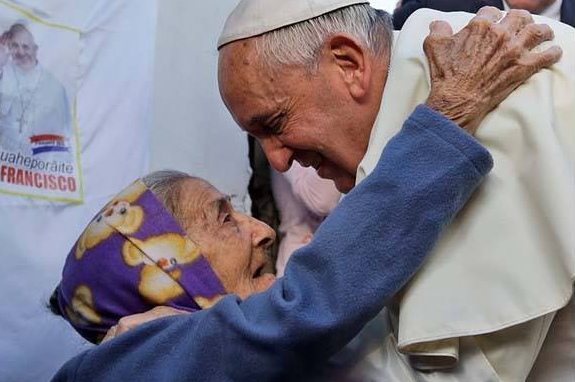
Feb 13, 2016 | Non categorizzato
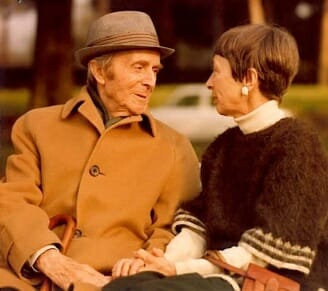 “The Gospel isn’t just a collection of words. It’s also a list of facts. It’s life. Jesus not only preached, he healed the sick, comforted the afflicted, raised the dead and fed the hungry. He performed the Works of Mercy because He loved. “I have compassion for these people,” He exclaimed upon seeing the hungry throngs, and He multiplied bread to satisfy their hunger. Bread takes on a sacred value in the Redemption. Jesus inserts the greatest mystery into bread, and He made the Eucharistic Banquet the core of the life of the Church community, forever uniting body and spirit, just as He had united humanity and divinity in Himself. Therefore, you love God, the Father, when you feed the hungry. All those who can offer nourishment to the undernourished and hungry and don’t do so, are murderers according to the Fathers of the Church; indeed, they’re god-killers. They cause Christ to die. From the perspective of the Gospel all those who, during the war years, forced condemned prisoners to starve to death, repeated the crucifixion. It was like murdering God. The hordes of the deported – in snow or under blazing sun, in armored cars, or in isolated ships whose monotony was only interrupted by the falling of the hungry – crossed the line of practical atheism even when it was perpetrated in the name of God. That is why Saint Vincent de Paul went aboard the galleys of very Christian kings, where the galley slaves were dropping dead from exhaustion. A Work of Mercy is not the mere distribution of food or money. It reconstitutes justice. “The Works of Mercy accomplish nothing without love,” Saint Augustine says. “If I give everything I own to the poor and even go to the stake to be burned as a martyr, but I don’t love, I’ve gotten nowhere” (1 Cor 13:3), Saint Paul says to those Christians who shared the Bread of Angels but not that of men. The cold and reserved woman who gives Christmas to the poor but never opens her soul to them, performs nothing more than a bureaucratic duty: Christ is not pleased. Social welfare does little or nothing at all to produce the effects of a religious life, if those who carry it out don’t bring that divine nourishment of the Holy Spirit, which is love.
“The Gospel isn’t just a collection of words. It’s also a list of facts. It’s life. Jesus not only preached, he healed the sick, comforted the afflicted, raised the dead and fed the hungry. He performed the Works of Mercy because He loved. “I have compassion for these people,” He exclaimed upon seeing the hungry throngs, and He multiplied bread to satisfy their hunger. Bread takes on a sacred value in the Redemption. Jesus inserts the greatest mystery into bread, and He made the Eucharistic Banquet the core of the life of the Church community, forever uniting body and spirit, just as He had united humanity and divinity in Himself. Therefore, you love God, the Father, when you feed the hungry. All those who can offer nourishment to the undernourished and hungry and don’t do so, are murderers according to the Fathers of the Church; indeed, they’re god-killers. They cause Christ to die. From the perspective of the Gospel all those who, during the war years, forced condemned prisoners to starve to death, repeated the crucifixion. It was like murdering God. The hordes of the deported – in snow or under blazing sun, in armored cars, or in isolated ships whose monotony was only interrupted by the falling of the hungry – crossed the line of practical atheism even when it was perpetrated in the name of God. That is why Saint Vincent de Paul went aboard the galleys of very Christian kings, where the galley slaves were dropping dead from exhaustion. A Work of Mercy is not the mere distribution of food or money. It reconstitutes justice. “The Works of Mercy accomplish nothing without love,” Saint Augustine says. “If I give everything I own to the poor and even go to the stake to be burned as a martyr, but I don’t love, I’ve gotten nowhere” (1 Cor 13:3), Saint Paul says to those Christians who shared the Bread of Angels but not that of men. The cold and reserved woman who gives Christmas to the poor but never opens her soul to them, performs nothing more than a bureaucratic duty: Christ is not pleased. Social welfare does little or nothing at all to produce the effects of a religious life, if those who carry it out don’t bring that divine nourishment of the Holy Spirit, which is love.  No one is moved by or grateful to the faucet for the water it provides, or by the light bulb for the light it provides, Ozanam remarks. “Man does not live on bread alone,” because he is soul as well as stomach. A Work of Mercy is a moral and material duty. By feeding the hungry, I feed me because his hunger is both mine and that of the whole social body of which I am an organic part. You can’t dump grain into the ocean when in another part of the world there is someone dying of hunger. “We, though many, are one body throughout the world:” and you cannot injure one body part to the advantage of another. If you do, you’ll pay for it with revolutions, disorder and all the epidemics that are found on this side of Heaven, and with hell on the other side. It has been said that the earth is dying, that the world’s resources are diminishing and the wars increasing precisely because of hunger. Some would like to solve the problem with war and birth control, doing away with human life. But it’s not resources that are lacking; what’s lacking is love – and the intelligence – for making it circulate. Circulation is life. The stagnation brought about by accumulation is a source of hate, revolution and war. It’s death. “If your enemy is hungry, feed him, if he is thirsty, give him something to drink. In doing this, you will heap burning coals on his head” (Rm 12:20). The Works of Mercy perform the miracle of making the love circulate by making the bread circulate. It’s a miracle that transforms bread into a sort of social sacrament, in which you begin from love, God, and you nourish the body along with the soul. (From:Igino Giordani, Il fratello (Rome: Città Nuova, 2011) p.63-67.
No one is moved by or grateful to the faucet for the water it provides, or by the light bulb for the light it provides, Ozanam remarks. “Man does not live on bread alone,” because he is soul as well as stomach. A Work of Mercy is a moral and material duty. By feeding the hungry, I feed me because his hunger is both mine and that of the whole social body of which I am an organic part. You can’t dump grain into the ocean when in another part of the world there is someone dying of hunger. “We, though many, are one body throughout the world:” and you cannot injure one body part to the advantage of another. If you do, you’ll pay for it with revolutions, disorder and all the epidemics that are found on this side of Heaven, and with hell on the other side. It has been said that the earth is dying, that the world’s resources are diminishing and the wars increasing precisely because of hunger. Some would like to solve the problem with war and birth control, doing away with human life. But it’s not resources that are lacking; what’s lacking is love – and the intelligence – for making it circulate. Circulation is life. The stagnation brought about by accumulation is a source of hate, revolution and war. It’s death. “If your enemy is hungry, feed him, if he is thirsty, give him something to drink. In doing this, you will heap burning coals on his head” (Rm 12:20). The Works of Mercy perform the miracle of making the love circulate by making the bread circulate. It’s a miracle that transforms bread into a sort of social sacrament, in which you begin from love, God, and you nourish the body along with the soul. (From:Igino Giordani, Il fratello (Rome: Città Nuova, 2011) p.63-67.
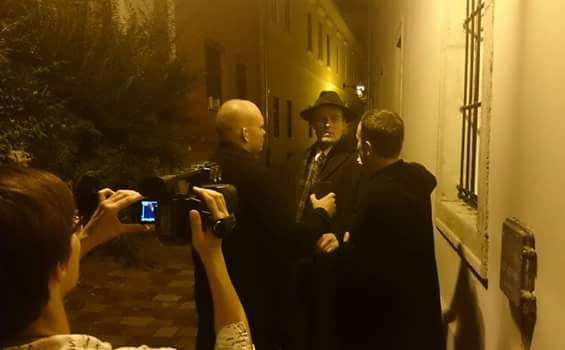
Feb 12, 2016 | Focolare Worldwide
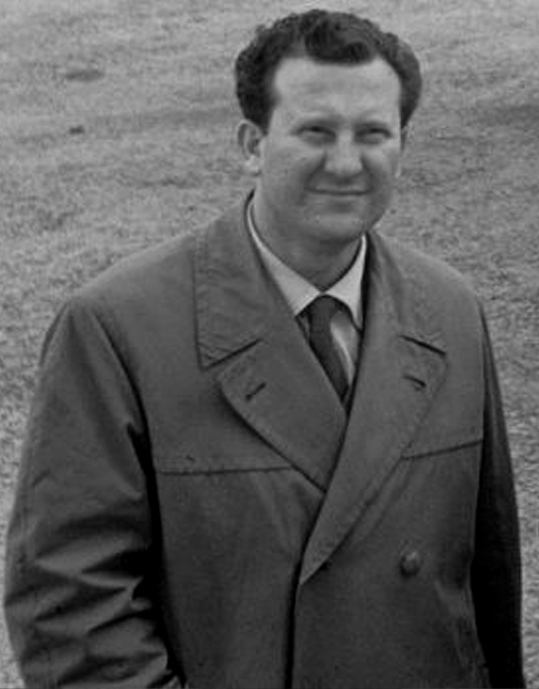
Guido Mirti (Cengia)
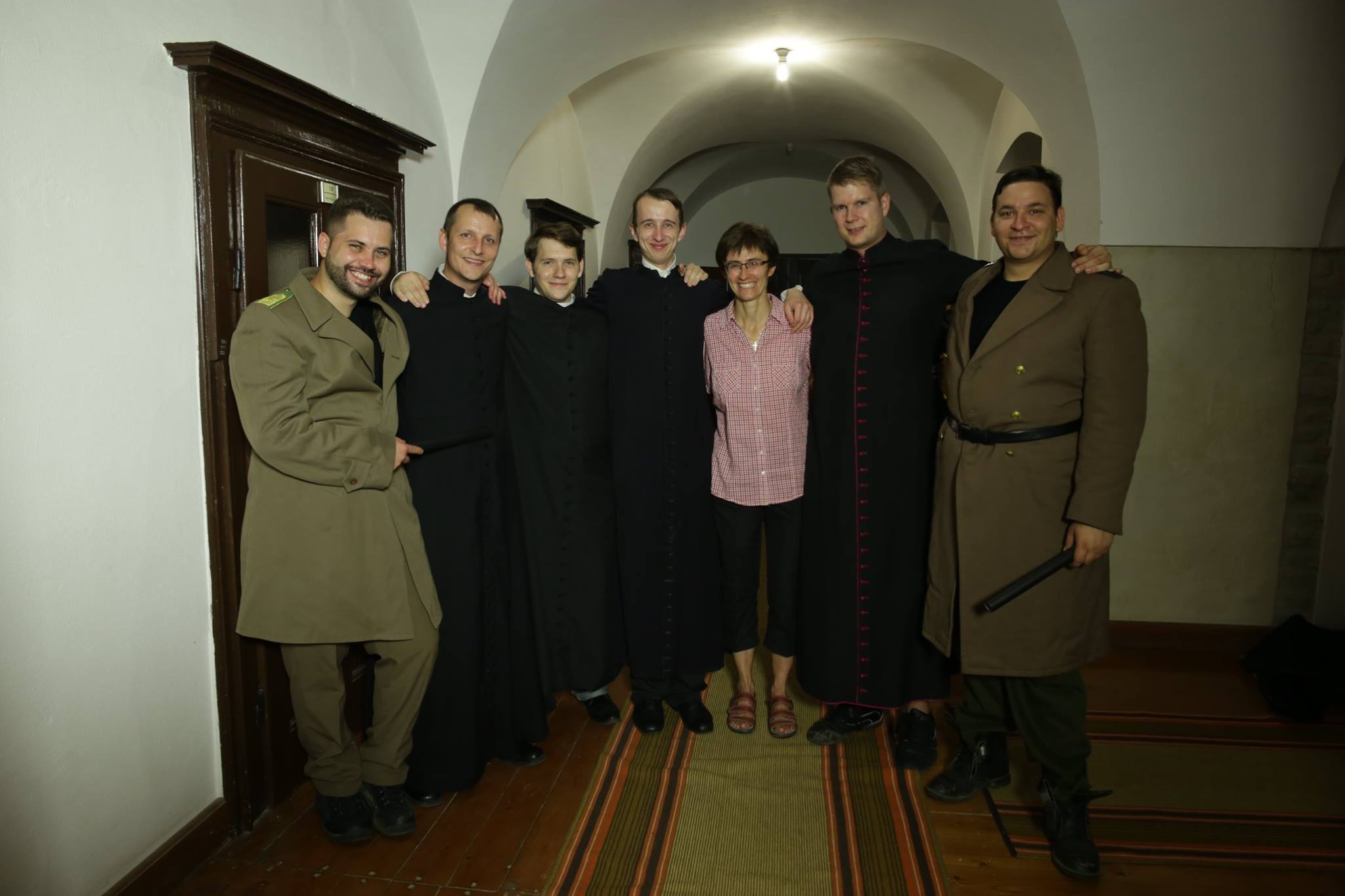
Film director, Cinzia Panero, with some of the actors.
 “While writing and then running the scenes,” says the director, “I also got to experience the power of that Love that opened the hearts of many people and institutions to give generously. The thank you list is quite long and will be well documented in the credits at the end of the film. Here, I would only like to mention the 50 actors – both professional and non – who were willing to wear heavy coats, scarves and winter clothing in the sweltering summer heat. Or the absolute availability and careful attention of Swing City Hotel in setting up a camera. We can never forget the costume designers who created and sewed the uniforms of 5 prisoners. But also the 70 people who contributed funds for the filming, equipment, advice and hearty awareness that they were involved in a project that was highlighting values such as giving, loyalty and making brave decisions. Border Men is a message for all of us: to be people of dialogue no matter where we are. Maria Chiara De Lorenzo See the Official English Trailer: https://www.youtube.com/watch?v=xq0TJEDaEg8 See webside: border.men.info@gmail.com
“While writing and then running the scenes,” says the director, “I also got to experience the power of that Love that opened the hearts of many people and institutions to give generously. The thank you list is quite long and will be well documented in the credits at the end of the film. Here, I would only like to mention the 50 actors – both professional and non – who were willing to wear heavy coats, scarves and winter clothing in the sweltering summer heat. Or the absolute availability and careful attention of Swing City Hotel in setting up a camera. We can never forget the costume designers who created and sewed the uniforms of 5 prisoners. But also the 70 people who contributed funds for the filming, equipment, advice and hearty awareness that they were involved in a project that was highlighting values such as giving, loyalty and making brave decisions. Border Men is a message for all of us: to be people of dialogue no matter where we are. Maria Chiara De Lorenzo See the Official English Trailer: https://www.youtube.com/watch?v=xq0TJEDaEg8 See webside: border.men.info@gmail.com
Feb 11, 2016 | Non categorizzato
“OnCity: Networks of light to inhabit the planet” is the title of a workshop on international citizenship that will take place on April 1-3, 2016 at Castel Gandolfo Conference Centre, Italy. The conference is organised by the New Humanity Movement, Youth for a United World and the United World Project which are all agencies of the Focolare Movement that are engaged in promoting brotherhood among generations, individuals, groups and peoples. We are challenged by current events: bombings, terrorism, new forms of poverty and marginalisation and a piecemeal world war. Cities are in trouble, suffering from contradictions that everyone can see. But there are also positive experiences which show that it is possible to work, believe and hope for more liveable and fraternal cities. The three-day workshop will examine changes taking place in today’s cities and present a lifestyle of dialogue. For information and reservations: oncity2016.net info@oncity2016.net 06/94792170 Download brochure: pdf ONCITY2016- reti di luci per abitare il pianeta (14.05 MB)
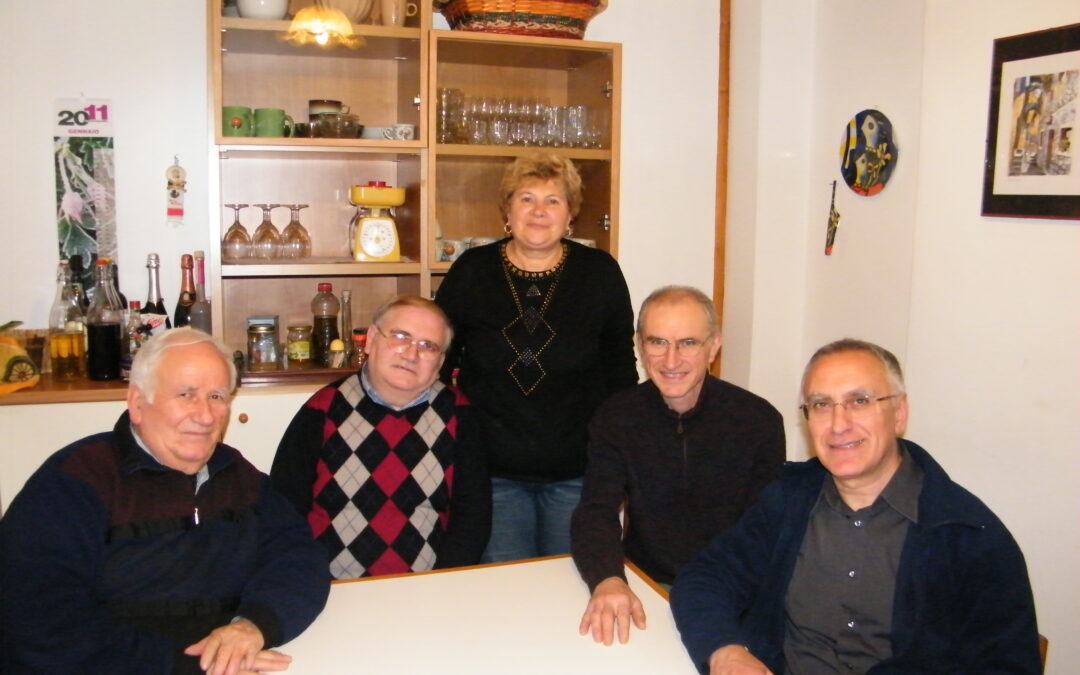
Feb 11, 2016 | Focolare Worldwide, Senza categoria
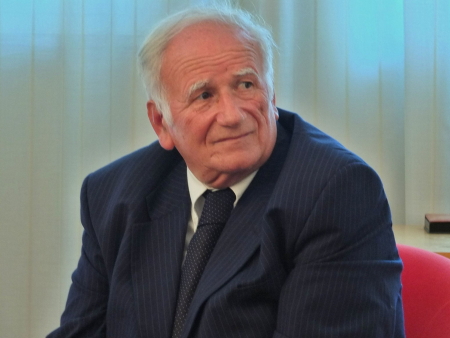 “I was still a child,” Alfonso from the class of 1945 recounts, “when my father was unjustly imprisoned. My mother and I would visit him in prison and, at such a tender age I realised how lonely the inmates were: people without hope or future – and without dignity. So, I promised myself that one day I would do something for them.” Alfonso had to wait for that chance. He enrolled in a course on volunteering and obtained permission to make visits to Rebibbia Prison, which currently has 1,700 inmates. They are serving time for the most varied crimes: drug dealing, sex abuse, mafia activity, extortion, murder, and more. Alfonso was aware that his efforts would be limited by the distrust of the inmates who belived they had lost any chance at redemption. In fact, many of them refused to let him approach. But he never gave up because he was convinced they were the image of the God he had chosen when he became a focolarino. Finally, one inmate named Giorgio who was serving time for a kidnapping that ended in tragedy, asked Alfonso to go to his mother, to embrace her and ask her to forgive him. Alfonso went and found the woman close to the end of her life. This totally unexpected, but long-awaited gesture, reconciled her to her son and the past. A few days later, she died peacefully. Alfonso stood by her son until his release from prison. He also helped Giorgio find temporary employment that restored his sense of dignity, enabling him to contribute to the support of the family.
“I was still a child,” Alfonso from the class of 1945 recounts, “when my father was unjustly imprisoned. My mother and I would visit him in prison and, at such a tender age I realised how lonely the inmates were: people without hope or future – and without dignity. So, I promised myself that one day I would do something for them.” Alfonso had to wait for that chance. He enrolled in a course on volunteering and obtained permission to make visits to Rebibbia Prison, which currently has 1,700 inmates. They are serving time for the most varied crimes: drug dealing, sex abuse, mafia activity, extortion, murder, and more. Alfonso was aware that his efforts would be limited by the distrust of the inmates who belived they had lost any chance at redemption. In fact, many of them refused to let him approach. But he never gave up because he was convinced they were the image of the God he had chosen when he became a focolarino. Finally, one inmate named Giorgio who was serving time for a kidnapping that ended in tragedy, asked Alfonso to go to his mother, to embrace her and ask her to forgive him. Alfonso went and found the woman close to the end of her life. This totally unexpected, but long-awaited gesture, reconciled her to her son and the past. A few days later, she died peacefully. Alfonso stood by her son until his release from prison. He also helped Giorgio find temporary employment that restored his sense of dignity, enabling him to contribute to the support of the family. 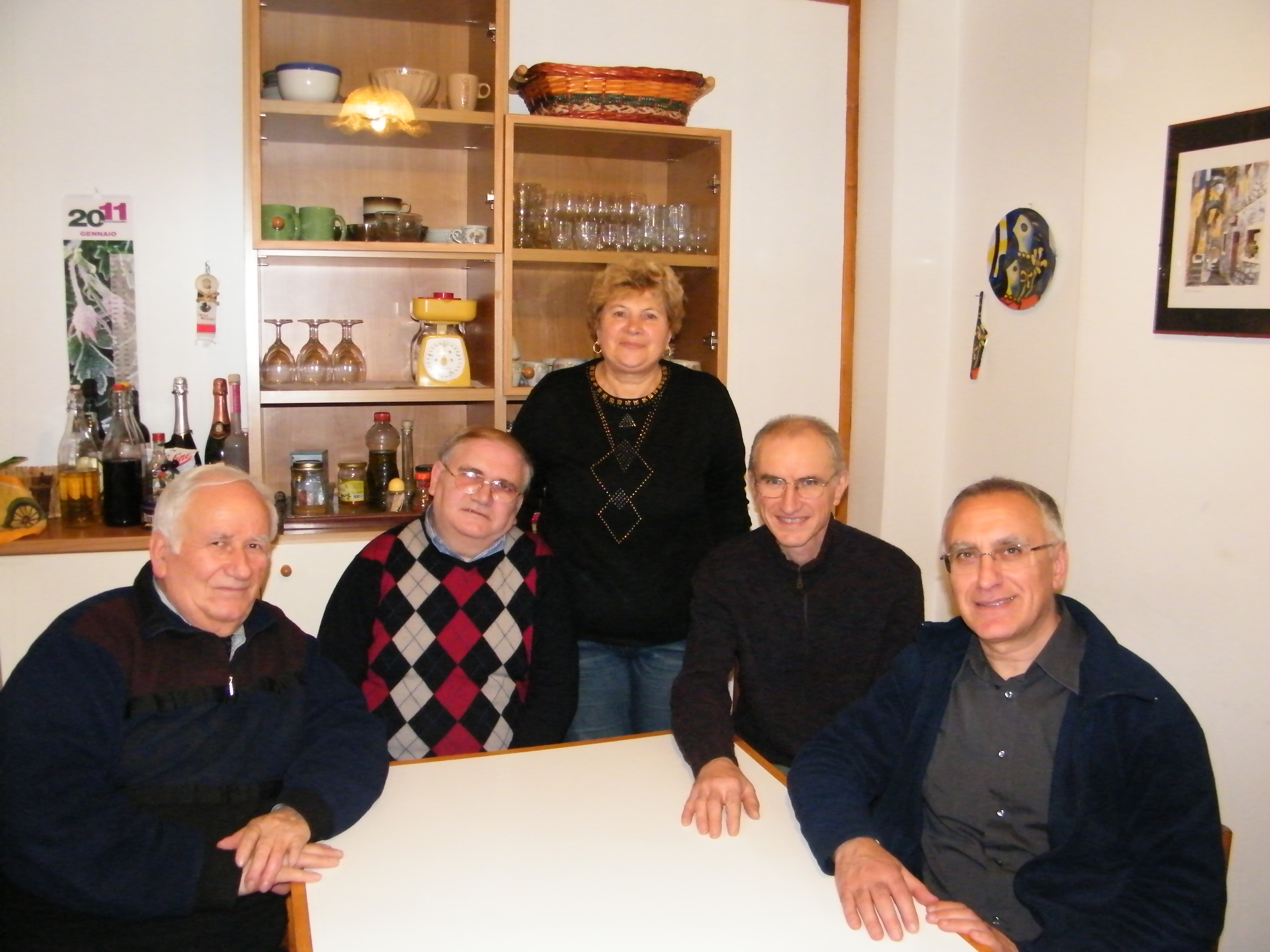 Through his visits with inmates, Alfonso has come to realise the importance of that fragile thread that connects them to the outside world. This is why he works so hard at keeping the relationship with families alive – especially with wives – and supporting families that find themselves in dire straits because of their relative’s imprisonment. This all takes time, people, energy and money. Alfonso never gave up. He began a project called “Always A Person” to show that prison does not take away a person’s human dignity, especially because God’s love for each one of us never diminishes. With 30 other volunteers – parents, professionals and ex-inmates – he has followed up with the families of 160 inmates, offering moral, economic and food support. The numbers grow each day. The spirit of the group is that of a focolare: “being family” for each inmate, being close to him and supporting him – never judging anyone’s past. In prison, words like trust and brotherhood take on deep meaning – especially mercy, an attitude that the volunteers say “acts on the person like a spring that helps them to get up again every time they’re tempted to let themselves go.” That’s how it was for Roberto who, after 8 years of incarceration and not finding any work, became homeless. Thanks to the “Always A Person” project he was accepted into a small welcome centre where he can practice his profession as a cook. There is also Francesco who had been a truck driver, but after 4 years in prison was not able to find a job because people didn’t trust him. Now, he belongs to the team of volunteers that prepares and delivers the packages for prisoners’ families. There are more stories like this one that are recounted in the books: “Ero carcerato…” and “Carcere e dintorni” written by Alfonso Di Nicola, and published by Città Nuova.
Through his visits with inmates, Alfonso has come to realise the importance of that fragile thread that connects them to the outside world. This is why he works so hard at keeping the relationship with families alive – especially with wives – and supporting families that find themselves in dire straits because of their relative’s imprisonment. This all takes time, people, energy and money. Alfonso never gave up. He began a project called “Always A Person” to show that prison does not take away a person’s human dignity, especially because God’s love for each one of us never diminishes. With 30 other volunteers – parents, professionals and ex-inmates – he has followed up with the families of 160 inmates, offering moral, economic and food support. The numbers grow each day. The spirit of the group is that of a focolare: “being family” for each inmate, being close to him and supporting him – never judging anyone’s past. In prison, words like trust and brotherhood take on deep meaning – especially mercy, an attitude that the volunteers say “acts on the person like a spring that helps them to get up again every time they’re tempted to let themselves go.” That’s how it was for Roberto who, after 8 years of incarceration and not finding any work, became homeless. Thanks to the “Always A Person” project he was accepted into a small welcome centre where he can practice his profession as a cook. There is also Francesco who had been a truck driver, but after 4 years in prison was not able to find a job because people didn’t trust him. Now, he belongs to the team of volunteers that prepares and delivers the packages for prisoners’ families. There are more stories like this one that are recounted in the books: “Ero carcerato…” and “Carcere e dintorni” written by Alfonso Di Nicola, and published by Città Nuova.
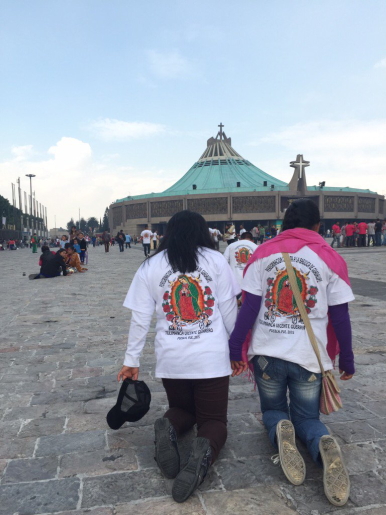
Feb 10, 2016 | Focolare Worldwide
 “Mexico City seems to be different today. There is a wave of hope, new life, and joy. The streets, phone booths, subways, and posters of the big avenues of the city, all announce the arrival of the Pilgrim from Rome, who wants, “like any other son, to come close to the Mother,” the beloved “Vírgin of Guadalupe”, Mother of all the Mexicans, Patron of the American continent, and according to many historians, the true author of unity of the Aztec nation. “I shall go to Our Lady like a pilgrim of mercy and peace. I am going to seek the Mexican people, who can give me something… I seek the deep faith you have, and I want to be contaminated with that richness of faith…,” Pope Francis said in the video-message sent to the Mexican people. And Mexico is preparing not only to receive him materially, but especially with the desire to receive with open hearts, the message of the “Bishop of Rome.” It is a message of hope, mercy, reconcilement, peace and fraternity. One feels a new attitude towards this pastoral visit. Of course there will be joy, emotion, and festivity, but also the desire to remain silent, listen and live it in depth. The Pope is coming in a particularly difficult time for our country, struck by violence, poverty and corruption, but in the messages he already sent to the Mexican people, Francis also conveyed his desire to come as “any man” and will involve every Mexican to help them bring out the best of themselves. In reading between the lines, we could almost say that his presence among us, if we manage to interpret and live it properly, can become a magnet for the many abilities our people possess, so as to radically swerve our path towards a more fraternal Mexico. The stages of the journey will not leave anyone out: Mexico City, Ecatepec, Chiapas, Morelia, and Ciudad Juárez. The pope will travel thousands of kilometres from the north to the south of the country. It will be a journey that will touch the neuralgic centres of conflicts, suffering, and at times even tragedies which Mexico is suffering, from the big city with its anonymity and social injustice, to the marginalised indigenous world, narcotraffick with all its violence, and the issue of border immigrants north of the country. The chosen itinerary and the activities to be held will launch a clear message: the Pope will come as a missionary of mercy and peace, especially for the most needy, and wants to share the wounds of this nation. Together with all the members of the Focolare Movement in the country, we have prepared ourselves by studying the teachings of Francis in depth, particularly the themes he will face in his visit: the youth, family, immigration, employment, and civilization of the aborigines. We want to receive his message, meet him and listen to him wherever he goes, even in the streets, and in the many routes his hoodless car will take. Moreover, we were called by the Mexican Episcopal Conference to collaborate, together with other ecclesiastical movements, in the visit’s logistics services especially in Mexico City. Welcome to Mexico, Pope Francis. With you we want to be missionaries of mercy and peace!.” From our news correspondents, Anabel Abascal and Raffaele Massolin Video-messaggio to the Mexican people: http://youtu.be/o8Y9VMFmOX0 Also consult: http://www.news.va/es/news/el-papa-a-los-mexicanos-voy-a-buscar-a-la-riquez-2 Official site: http://papafranciscoenmexico.org/
“Mexico City seems to be different today. There is a wave of hope, new life, and joy. The streets, phone booths, subways, and posters of the big avenues of the city, all announce the arrival of the Pilgrim from Rome, who wants, “like any other son, to come close to the Mother,” the beloved “Vírgin of Guadalupe”, Mother of all the Mexicans, Patron of the American continent, and according to many historians, the true author of unity of the Aztec nation. “I shall go to Our Lady like a pilgrim of mercy and peace. I am going to seek the Mexican people, who can give me something… I seek the deep faith you have, and I want to be contaminated with that richness of faith…,” Pope Francis said in the video-message sent to the Mexican people. And Mexico is preparing not only to receive him materially, but especially with the desire to receive with open hearts, the message of the “Bishop of Rome.” It is a message of hope, mercy, reconcilement, peace and fraternity. One feels a new attitude towards this pastoral visit. Of course there will be joy, emotion, and festivity, but also the desire to remain silent, listen and live it in depth. The Pope is coming in a particularly difficult time for our country, struck by violence, poverty and corruption, but in the messages he already sent to the Mexican people, Francis also conveyed his desire to come as “any man” and will involve every Mexican to help them bring out the best of themselves. In reading between the lines, we could almost say that his presence among us, if we manage to interpret and live it properly, can become a magnet for the many abilities our people possess, so as to radically swerve our path towards a more fraternal Mexico. The stages of the journey will not leave anyone out: Mexico City, Ecatepec, Chiapas, Morelia, and Ciudad Juárez. The pope will travel thousands of kilometres from the north to the south of the country. It will be a journey that will touch the neuralgic centres of conflicts, suffering, and at times even tragedies which Mexico is suffering, from the big city with its anonymity and social injustice, to the marginalised indigenous world, narcotraffick with all its violence, and the issue of border immigrants north of the country. The chosen itinerary and the activities to be held will launch a clear message: the Pope will come as a missionary of mercy and peace, especially for the most needy, and wants to share the wounds of this nation. Together with all the members of the Focolare Movement in the country, we have prepared ourselves by studying the teachings of Francis in depth, particularly the themes he will face in his visit: the youth, family, immigration, employment, and civilization of the aborigines. We want to receive his message, meet him and listen to him wherever he goes, even in the streets, and in the many routes his hoodless car will take. Moreover, we were called by the Mexican Episcopal Conference to collaborate, together with other ecclesiastical movements, in the visit’s logistics services especially in Mexico City. Welcome to Mexico, Pope Francis. With you we want to be missionaries of mercy and peace!.” From our news correspondents, Anabel Abascal and Raffaele Massolin Video-messaggio to the Mexican people: http://youtu.be/o8Y9VMFmOX0 Also consult: http://www.news.va/es/news/el-papa-a-los-mexicanos-voy-a-buscar-a-la-riquez-2 Official site: http://papafranciscoenmexico.org/
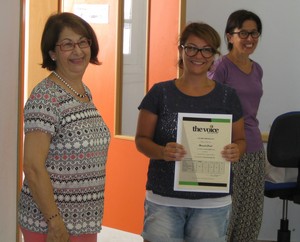
Feb 9, 2016 | Focolare Worldwide
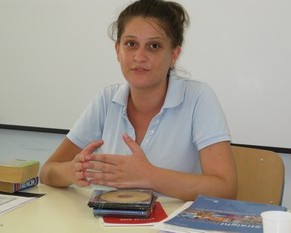 Coming down from the bus we immediately spot ““The Voice School of English”, situated in Pembroke, a few metres away the sea. The modern and spacious Malta National Sports School houses the Voice during the summer months. Andy, who co-ordinates the students’ visit to Malta, greets us with a big smile. She does not only know all the students by name, as actually all the teachers do, but she makes it a point to see that they receive the care and attention needed, while she works very closely even with the host families to ensure the comfort and well-being of each student. Together with Andy there is Vivienne, who has been working at The Voice since its very beginning 23 years ago; Maria, who after a long career in the Ministry of Education now offers her expertise as head of school, and Marilyn, who joined the school staff two years ago as director of studies. With her impressive record as teacher of English, Marilyn gives her precious contribution on pedagogical level; she follows very closely the academic progress of the students and she mentors the teaching staff to ensure support and progress in the teaching of English as a foreign language. The school prides itself with a team of professional and dedicated teachers. “The Voice” was founded in 1992 by a group of young people who decided to become personally involved in the Economy of Communion project launched by Chiara Lubich. Some of these young people are now the older generation who host students. Vivienne, who has been head of school for years and who still helps with its administration, looks back and relates: “Prior to the Voice I started a small business but the difficulties and problems I had to face made me decide to quit and promise that I would never attempt such a feat again. When I was roped in to help with the Voice, I discovered an economic activity motivated by different aspirations. This made me change my mind and till the present day I contribute wholeheartedly to make this project survive”.
Coming down from the bus we immediately spot ““The Voice School of English”, situated in Pembroke, a few metres away the sea. The modern and spacious Malta National Sports School houses the Voice during the summer months. Andy, who co-ordinates the students’ visit to Malta, greets us with a big smile. She does not only know all the students by name, as actually all the teachers do, but she makes it a point to see that they receive the care and attention needed, while she works very closely even with the host families to ensure the comfort and well-being of each student. Together with Andy there is Vivienne, who has been working at The Voice since its very beginning 23 years ago; Maria, who after a long career in the Ministry of Education now offers her expertise as head of school, and Marilyn, who joined the school staff two years ago as director of studies. With her impressive record as teacher of English, Marilyn gives her precious contribution on pedagogical level; she follows very closely the academic progress of the students and she mentors the teaching staff to ensure support and progress in the teaching of English as a foreign language. The school prides itself with a team of professional and dedicated teachers. “The Voice” was founded in 1992 by a group of young people who decided to become personally involved in the Economy of Communion project launched by Chiara Lubich. Some of these young people are now the older generation who host students. Vivienne, who has been head of school for years and who still helps with its administration, looks back and relates: “Prior to the Voice I started a small business but the difficulties and problems I had to face made me decide to quit and promise that I would never attempt such a feat again. When I was roped in to help with the Voice, I discovered an economic activity motivated by different aspirations. This made me change my mind and till the present day I contribute wholeheartedly to make this project survive”. 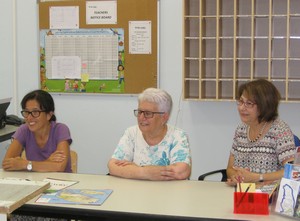 And notwithstanding difficulties and challenges the Voice is still offering its service to foreign students. Presently there are 47 English Language Schools in Malta and some of them cater for thousands of students, so one may wonder how such a small enterprise as the Voice still manages to keep going. Marilyn explains, “We aim at giving individual attention to each student, so the number of students in each class hardly ever exceeds 6; occasionally there is maximum of 8 students. Of course, this means that we have to employ more teachers! The school also offers one-to-one programmes that satisfy the student’s individual needs”. In this way, the teacher-student relationship becomes the pedagogical method, the key to linguistic progress, especially where the development of oral communication skills are concerned. The Voice experience continues with the host families, where students are given the opportunity not only to practise their English, but also to discover the Maltese culture and share the warm family atmosphere. Building relationships is a priority, explains Vivienne, a prerogative which gives the school its identity. “Here no student is a number; they are friends with whom we share all that we can, and even they share a lot with us”. This becomes even more evident during the Friday Certificate Award Ceremony when students who have finished the course wave good-bye to the rest of “community”, a term used by the students themselves. The Director of Studies has a word full of warmth and encouragement for each departing student, while the students’ faces reflect the pride of their achievement. Students interviewed speak of the family atmosphere created at the school. Karina says “I have found friends and very friendly teachers who really wish me well”, while Raffaella adds, “I feel encouraged to look for work when I go back home by the fact that my teacher at the Voice was younger than I; l would like to give my best, just like her”. In conformity with its values and its commitment towards the Economy of Communion, the Voice opts to employ and train new young members to join its team.
And notwithstanding difficulties and challenges the Voice is still offering its service to foreign students. Presently there are 47 English Language Schools in Malta and some of them cater for thousands of students, so one may wonder how such a small enterprise as the Voice still manages to keep going. Marilyn explains, “We aim at giving individual attention to each student, so the number of students in each class hardly ever exceeds 6; occasionally there is maximum of 8 students. Of course, this means that we have to employ more teachers! The school also offers one-to-one programmes that satisfy the student’s individual needs”. In this way, the teacher-student relationship becomes the pedagogical method, the key to linguistic progress, especially where the development of oral communication skills are concerned. The Voice experience continues with the host families, where students are given the opportunity not only to practise their English, but also to discover the Maltese culture and share the warm family atmosphere. Building relationships is a priority, explains Vivienne, a prerogative which gives the school its identity. “Here no student is a number; they are friends with whom we share all that we can, and even they share a lot with us”. This becomes even more evident during the Friday Certificate Award Ceremony when students who have finished the course wave good-bye to the rest of “community”, a term used by the students themselves. The Director of Studies has a word full of warmth and encouragement for each departing student, while the students’ faces reflect the pride of their achievement. Students interviewed speak of the family atmosphere created at the school. Karina says “I have found friends and very friendly teachers who really wish me well”, while Raffaella adds, “I feel encouraged to look for work when I go back home by the fact that my teacher at the Voice was younger than I; l would like to give my best, just like her”. In conformity with its values and its commitment towards the Economy of Communion, the Voice opts to employ and train new young members to join its team.  Moreover, an enterprise founded by young people cannot ignore the importance of offering work opportunities to youth. Claire, one of these young members of the staff, has been employed to guide and animate the afternoon leisure activities, because at the Voice it is not only English lessons that count but the whole shared experience, an opportunity to enhance the student’s personal development. In addition, Malta is a cultural and historical jewel…….and between a visit to the Pre-historic temples and the splendid Blue Grotto, one is often allowed enough time for a dip in the crystal clear water. Next time it might be the island of Comino and the Blue Lagoon, followed by a visit to the sister island of Gozo with its historical Citadel, or a visit to Valletta, the capital city where students can enjoy one of the most popular tourist attractions: an audio-visual show that tells all about the history and culture of the Maltese Islands. As days pass and one group “selfie” follows another, the school community changes; new arrivals are greeted with joy and there are hearty farewells for those who depart. At times the community circle widens because relatives holidaying in Malta join the school during its leisure activities. And more often than not, conversations at the beach tend to become serious talk on topics, such as the concept of the Economy of Communion that motivates the Voice, or on ideas about personal projects, or on issues that accompany one’s personal growth and professional development. Addresses and WhatsApp contacts are frequently exchanged……friendship does not end with the English course! Lately, new members who believe in the philosophy of the Economy of Communion have been invited by the Voice to join its group of directors; among them there is John, a consultant in Human Resources and Management, who specializes in the area of Tourism. The Voice looks forward to new developments! by Anouk Grevin Source: Economy of Communion Download brochure See the video: https://vimeo.com/135970956
Moreover, an enterprise founded by young people cannot ignore the importance of offering work opportunities to youth. Claire, one of these young members of the staff, has been employed to guide and animate the afternoon leisure activities, because at the Voice it is not only English lessons that count but the whole shared experience, an opportunity to enhance the student’s personal development. In addition, Malta is a cultural and historical jewel…….and between a visit to the Pre-historic temples and the splendid Blue Grotto, one is often allowed enough time for a dip in the crystal clear water. Next time it might be the island of Comino and the Blue Lagoon, followed by a visit to the sister island of Gozo with its historical Citadel, or a visit to Valletta, the capital city where students can enjoy one of the most popular tourist attractions: an audio-visual show that tells all about the history and culture of the Maltese Islands. As days pass and one group “selfie” follows another, the school community changes; new arrivals are greeted with joy and there are hearty farewells for those who depart. At times the community circle widens because relatives holidaying in Malta join the school during its leisure activities. And more often than not, conversations at the beach tend to become serious talk on topics, such as the concept of the Economy of Communion that motivates the Voice, or on ideas about personal projects, or on issues that accompany one’s personal growth and professional development. Addresses and WhatsApp contacts are frequently exchanged……friendship does not end with the English course! Lately, new members who believe in the philosophy of the Economy of Communion have been invited by the Voice to join its group of directors; among them there is John, a consultant in Human Resources and Management, who specializes in the area of Tourism. The Voice looks forward to new developments! by Anouk Grevin Source: Economy of Communion Download brochure See the video: https://vimeo.com/135970956
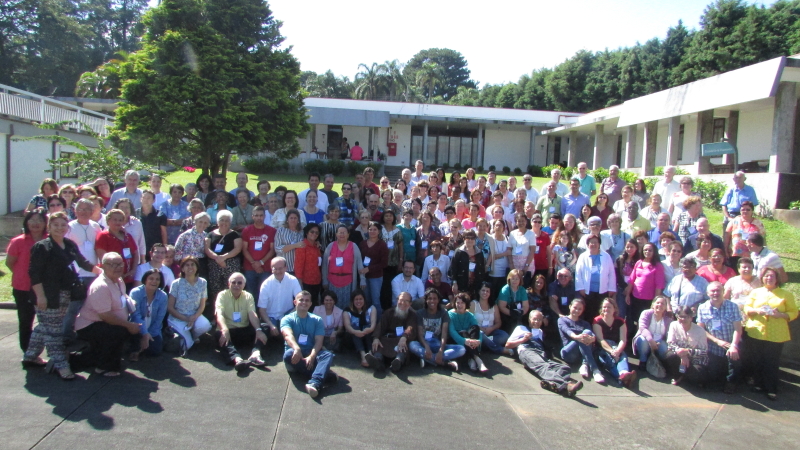
Feb 8, 2016 | Focolare Worldwide
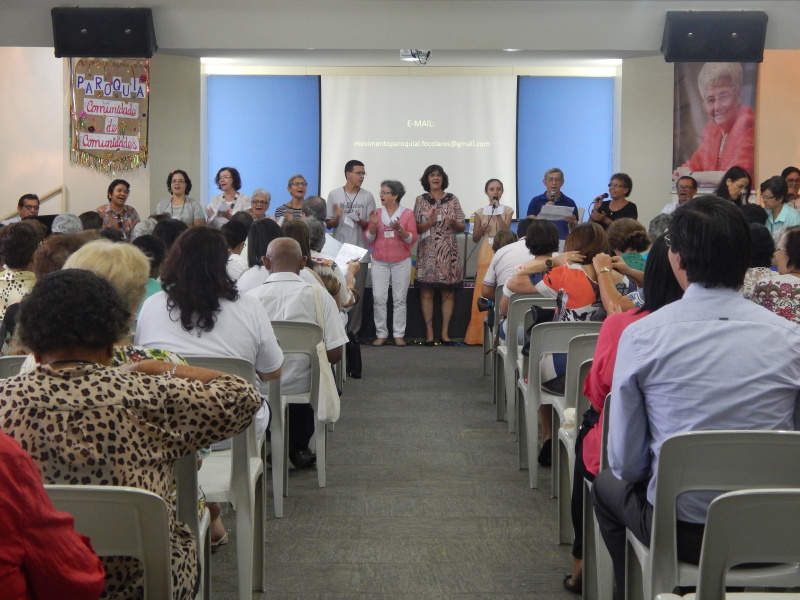 «I had been unjustly accused before the entire parish council. My answer was: silence, tears. After three days there was a phone call from that person, broken with emotion: “Will you forgive me?” and the answer, “I have already forgiven!!! Then a thought came to mind: it was not enough to forgive, but I could do more. So I invited that person to dinner, and a friendship was born, which will never be broken.» This is the story of Berenice, mother of three children, and a catechist for over 20 years, and then a minister of the Word in the five communities that make up the parish of Immaculata Conceção, in one of the peripheral districts of the immense city of Sao Paolo. These were flash backs of the many experiences recounted during the two “Schools of Communion” of the Parish Movement – branch of the Focolare Movement in the local Church – held from 22 to 24 January in the Ginetta Mariapolis, in Vargem Grande Paulista (SP) and from 30 to 31 January in the Mariapolis (Igarassu-Recife). The encounters focused on: Unity, the specific charism of the Focolare, with a particular stress on Mercy in this Holy Year. These were attended by 300 people consisting of the youth, lay adults, religious, seminarians, deacons and priests of 116 parishes in 27 dioceses from 16 Brazilian states. Together they testified to the force of forgiveness and mercy of evangelical love, which make the parish a community of communities, when this force and mercy are lived among the members of the movements.”
«I had been unjustly accused before the entire parish council. My answer was: silence, tears. After three days there was a phone call from that person, broken with emotion: “Will you forgive me?” and the answer, “I have already forgiven!!! Then a thought came to mind: it was not enough to forgive, but I could do more. So I invited that person to dinner, and a friendship was born, which will never be broken.» This is the story of Berenice, mother of three children, and a catechist for over 20 years, and then a minister of the Word in the five communities that make up the parish of Immaculata Conceção, in one of the peripheral districts of the immense city of Sao Paolo. These were flash backs of the many experiences recounted during the two “Schools of Communion” of the Parish Movement – branch of the Focolare Movement in the local Church – held from 22 to 24 January in the Ginetta Mariapolis, in Vargem Grande Paulista (SP) and from 30 to 31 January in the Mariapolis (Igarassu-Recife). The encounters focused on: Unity, the specific charism of the Focolare, with a particular stress on Mercy in this Holy Year. These were attended by 300 people consisting of the youth, lay adults, religious, seminarians, deacons and priests of 116 parishes in 27 dioceses from 16 Brazilian states. Together they testified to the force of forgiveness and mercy of evangelical love, which make the parish a community of communities, when this force and mercy are lived among the members of the movements.”  There were numberless fruits of the Word of God put into practice: in the districts of the outskirts where the laity took charge of finding the facilities to host the growing numbers of the faithful and the youth, who dedicated themselves to the various pastoral activities in the prisons or parish social works where the priority is to listen and pay attention to the person rather than to organization and material aid. Some undertook to initiate small encounters in the parishioners’ homes, bringing the Word of Life to the lives of families that are oftentimes far from the Church as in the case of Maria Hélia from a community of Marechal Deodoro. Bernadete lives in João Pessoa and is a catechist in the parish of Baby Jesus and a member of the archdiocesan team of catechists. She tries to share what she lives with a great openness to dialogue, starting from her family and relatives who belong to the evangelical church and Pentecostal associations. On Christmas Day she managed to involve everyone – including her husband who is not a Church goer – in a sketch of the birth of Jesus. “A spirit of dialogue and unity was established among all of us. We had a real Christmas!” During the conclusive meeting, the commitment declared by all was to become builders of unity within the communities, creating relationships in which, through mutual love, the Risen Christ is present and attracts and transforms everything, irradiating peace and joy. The objective was this: to have an open heart and fulfill “Jesus’ dream” when he prayed to the Father ”that all may be one.”
There were numberless fruits of the Word of God put into practice: in the districts of the outskirts where the laity took charge of finding the facilities to host the growing numbers of the faithful and the youth, who dedicated themselves to the various pastoral activities in the prisons or parish social works where the priority is to listen and pay attention to the person rather than to organization and material aid. Some undertook to initiate small encounters in the parishioners’ homes, bringing the Word of Life to the lives of families that are oftentimes far from the Church as in the case of Maria Hélia from a community of Marechal Deodoro. Bernadete lives in João Pessoa and is a catechist in the parish of Baby Jesus and a member of the archdiocesan team of catechists. She tries to share what she lives with a great openness to dialogue, starting from her family and relatives who belong to the evangelical church and Pentecostal associations. On Christmas Day she managed to involve everyone – including her husband who is not a Church goer – in a sketch of the birth of Jesus. “A spirit of dialogue and unity was established among all of us. We had a real Christmas!” During the conclusive meeting, the commitment declared by all was to become builders of unity within the communities, creating relationships in which, through mutual love, the Risen Christ is present and attracts and transforms everything, irradiating peace and joy. The objective was this: to have an open heart and fulfill “Jesus’ dream” when he prayed to the Father ”that all may be one.”
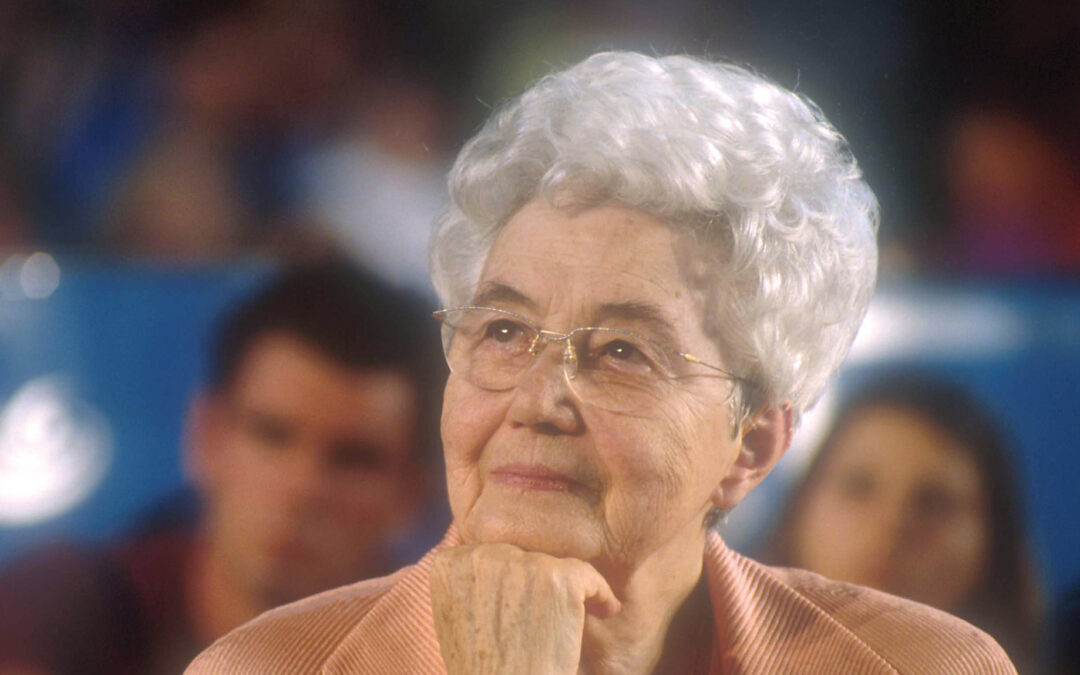
Feb 7, 2016 | Non categorizzato
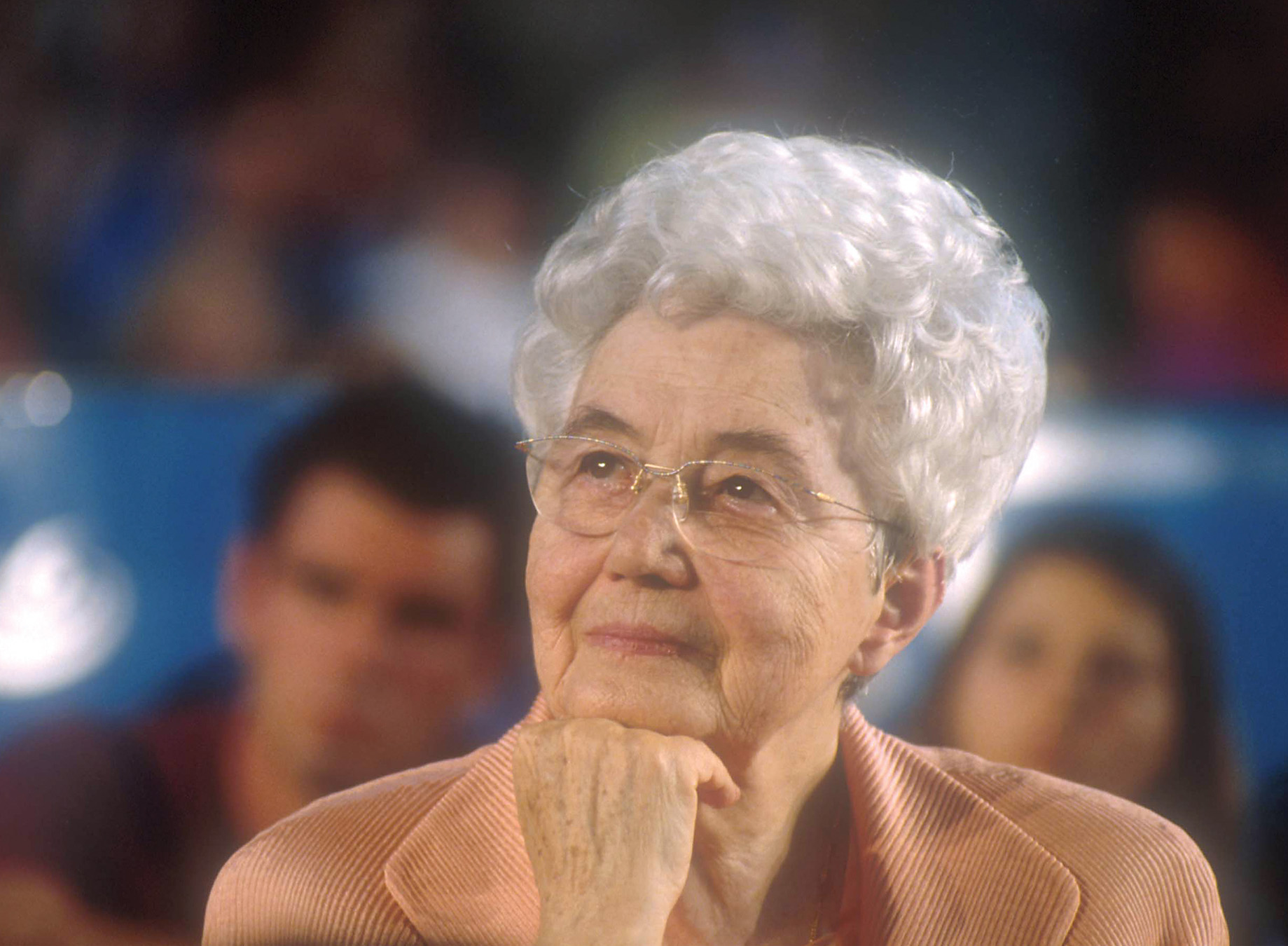 (…)“Let among you who is without sin be the first to throw a stone at her”
(…)“Let among you who is without sin be the first to throw a stone at her” (Jn 8:7). Jesus said this to those who wanted to stone the adulteress. The central idea in Jesus’ commands is always love. This is why he doesn’t want us Christians to condemn anyone. In fact he says, “Do not judge,” and proclaims, “Blessed are the merciful.” Jesus wants mercy. Nevertheless, from what he says one could conclude that there is someone who could throw the first stone: whoever is without sin.
This is certainly not one of us, we are all sinners. But there is a person who is without sin. And we know who she is: the Mother of God. Could Mary, then, “throw a stone” at someone who erred? Did she ever do such a thing when she was on earth?
We know our Mother. We know what Scripture says about her, what Tradition has handed down to us about her, what the People of God have always thought about her. Mary loves everyone. She is merciful She is the advocate of the most unfortunate. It is to her that countless Christians have turned, when they have had the impression that God’s justice was upon them. Mary does not throw stones. Quite the contrary, no one except Jesus spreads love the way she does. Why? Because she is a mother, and mothers only know how to love. It is typical of a mother to love her children as herself, because there’s something of herself in them. … We too can find something of ourselves in others. For we must see Jesus in ourselves and in every neighbour.
What shall we do? With each neighbor, at home, at work, or on the street, with the people we talk; with those we speak to over the phone, or for whom we carry out our daily work – with every person we meet these days, we must think: “I must act as if I were his or her mother,” and act accordingly. Mothers are always serving, Mothers always find excuses for their children. Mothers are always full of hope.
“As if I were his or her mother”, this is thought which must be foremost in our minds these days. This must be our resolution, if we want to be sure not to throw stones: and to be Mary’s presence here on earth for everyone we meet. Chiara Lubich Rocca di Papa, 3rd March 1983 Source: Chiara Lubich Centre
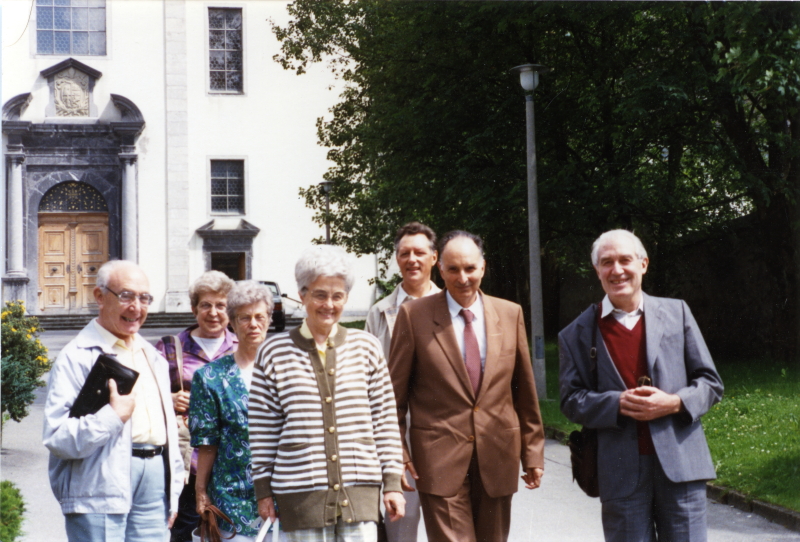
Feb 6, 2016 | Non categorizzato
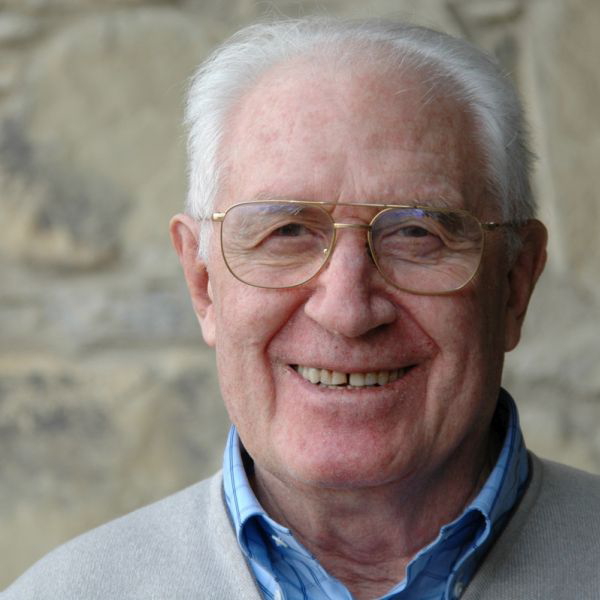 Card. Giuseppe Betori, Archbishop of Florence traced an important phase of his story, and described him as «A promoter of proactive communion between the various groups and associations,» who «interpreted the hope of Cardinal Benelli and Chiara Lubich» for the creation of the Giorgio La Pira International Students’ Centre in Florence at the turn of the 1970s. In fact, Giorgio Martelli, a native of Pistoia, Tuscany, gave a decisive contribution to the birth of this joint project between the Florentine Archdiocese and the Focolare Movement, which up to today continues its commitment to the «youth from all the nations worldwide, especially the developing countries, fostering fraternal acceptance and promoting dialogue between people of all cultures and creeds.» The story of the La Pira Centre is one of the important stories that has crossed the life of Turnea (the name Chiara Lubich gave him and that described his: Turris Eburnea, Tower of Ivory, taken from the Marian litanies). Born into a working-class family, Turnea was brought up with a simple faith, moral rectitude and thirst for justice. As a young man he was active in the Catholic Action where he received a more solid Christian education. During the war, he and his father were caught twice in a round-up which condemned him to forced labour, from which he managed to escape. After the war he started working in the labour union as a clerk in the contracts and litigations office, and at the same time, took up his studies again and graduated as an industrial surveyor. During the Catholic Action period he met other youth active in Christian movements, among whom were Bruno Venturini, and Vitaliano Bulletti who also became focolarini. He himself commented on that period: «Before me were two aspects of Christian life that were alternatively a more personal aspect of the quest for a relationship with God, and a more social one concerning the need for fraternity among men, and the justice and struggles to reach them. But these were two separate spheres!!» His first meeting with the focolare came about in January 1950 when he first met Graziella De Luca, who had gone to his city to speak to some people about the experience of the newborn Focolare Movement. In the following months he went several times to Rome where he met, besides Chiara, the first focolare men and women. After an internal struggle that lasted a few months, he decided to become one of them, and after leaving his fiancée and family – amid great misunderstandings – he moved to Rome, and joined the first men’s focolare house. Subsequently, he lived in various focolare houses in Italy and Holland .
Card. Giuseppe Betori, Archbishop of Florence traced an important phase of his story, and described him as «A promoter of proactive communion between the various groups and associations,» who «interpreted the hope of Cardinal Benelli and Chiara Lubich» for the creation of the Giorgio La Pira International Students’ Centre in Florence at the turn of the 1970s. In fact, Giorgio Martelli, a native of Pistoia, Tuscany, gave a decisive contribution to the birth of this joint project between the Florentine Archdiocese and the Focolare Movement, which up to today continues its commitment to the «youth from all the nations worldwide, especially the developing countries, fostering fraternal acceptance and promoting dialogue between people of all cultures and creeds.» The story of the La Pira Centre is one of the important stories that has crossed the life of Turnea (the name Chiara Lubich gave him and that described his: Turris Eburnea, Tower of Ivory, taken from the Marian litanies). Born into a working-class family, Turnea was brought up with a simple faith, moral rectitude and thirst for justice. As a young man he was active in the Catholic Action where he received a more solid Christian education. During the war, he and his father were caught twice in a round-up which condemned him to forced labour, from which he managed to escape. After the war he started working in the labour union as a clerk in the contracts and litigations office, and at the same time, took up his studies again and graduated as an industrial surveyor. During the Catholic Action period he met other youth active in Christian movements, among whom were Bruno Venturini, and Vitaliano Bulletti who also became focolarini. He himself commented on that period: «Before me were two aspects of Christian life that were alternatively a more personal aspect of the quest for a relationship with God, and a more social one concerning the need for fraternity among men, and the justice and struggles to reach them. But these were two separate spheres!!» His first meeting with the focolare came about in January 1950 when he first met Graziella De Luca, who had gone to his city to speak to some people about the experience of the newborn Focolare Movement. In the following months he went several times to Rome where he met, besides Chiara, the first focolare men and women. After an internal struggle that lasted a few months, he decided to become one of them, and after leaving his fiancée and family – amid great misunderstandings – he moved to Rome, and joined the first men’s focolare house. Subsequently, he lived in various focolare houses in Italy and Holland .  In 1968 Turnea he was appointed by Chiara as the first person to take charge of the newborn branch of the Volunteers of God. At their conventions Turnea encouraged moments of debate on issues and queries regarding the concretisation of the spirituality of unity in daily life. He often repeated Chiara’s affirmations: The Volunteers in our time have to take after the first Christians. For many years he dedicated himself to that Focolare aspect called harmony and environment and which concerned the construction works, the towns, the Mariapolis Centres, art and social works. It was a role he covered with passion, love and devotion also in the numerous trips and visits to various countries. Turnea endowed his efforts, tenacity and love also in many other fields: at the start of the Youth for a United World Movement, and in supporting the Santa Chiara Audiovisual Centre and the international Gen Rosso band. Free from specific assignments from 2008, he continued to give his contribution with advice and ideas. As a priest, he stood by many focolarini, especially those in suffering, and for whom he regularly celebrated the Holy Mass. In 2012 he was struck by a disease that caused a motor disability, which he bore, however, with his proverbial grit and his love for Jesus Forsaken and Abandoned. Regarding the last years, his long-time friend, Bruno Venturini recounted: «He would gather all his strength to try to be active, and was still willing to help. At times, after a difficult day he didn’t have the strength to get up and I would find him at the computer, checking his mail. At the same time he was always committed to accepting from God with serenity, this state of weakness and inactivity. He was never resigned and received all those who came to see him with joy. He spoke with great presence of mind and often with great effort, about all the most various topics one or the other was involved in. He never forgot to express his deep thoughts which showed his interior state, his full adhesion to God’s will: his heavenly thoughts.» On 26 January Turnea concluded his earthly journey. Focolare President Maria Voce wrote: We have «another giant» among the first focolarini. Maria Chiara de Lorenzo
In 1968 Turnea he was appointed by Chiara as the first person to take charge of the newborn branch of the Volunteers of God. At their conventions Turnea encouraged moments of debate on issues and queries regarding the concretisation of the spirituality of unity in daily life. He often repeated Chiara’s affirmations: The Volunteers in our time have to take after the first Christians. For many years he dedicated himself to that Focolare aspect called harmony and environment and which concerned the construction works, the towns, the Mariapolis Centres, art and social works. It was a role he covered with passion, love and devotion also in the numerous trips and visits to various countries. Turnea endowed his efforts, tenacity and love also in many other fields: at the start of the Youth for a United World Movement, and in supporting the Santa Chiara Audiovisual Centre and the international Gen Rosso band. Free from specific assignments from 2008, he continued to give his contribution with advice and ideas. As a priest, he stood by many focolarini, especially those in suffering, and for whom he regularly celebrated the Holy Mass. In 2012 he was struck by a disease that caused a motor disability, which he bore, however, with his proverbial grit and his love for Jesus Forsaken and Abandoned. Regarding the last years, his long-time friend, Bruno Venturini recounted: «He would gather all his strength to try to be active, and was still willing to help. At times, after a difficult day he didn’t have the strength to get up and I would find him at the computer, checking his mail. At the same time he was always committed to accepting from God with serenity, this state of weakness and inactivity. He was never resigned and received all those who came to see him with joy. He spoke with great presence of mind and often with great effort, about all the most various topics one or the other was involved in. He never forgot to express his deep thoughts which showed his interior state, his full adhesion to God’s will: his heavenly thoughts.» On 26 January Turnea concluded his earthly journey. Focolare President Maria Voce wrote: We have «another giant» among the first focolarini. Maria Chiara de Lorenzo
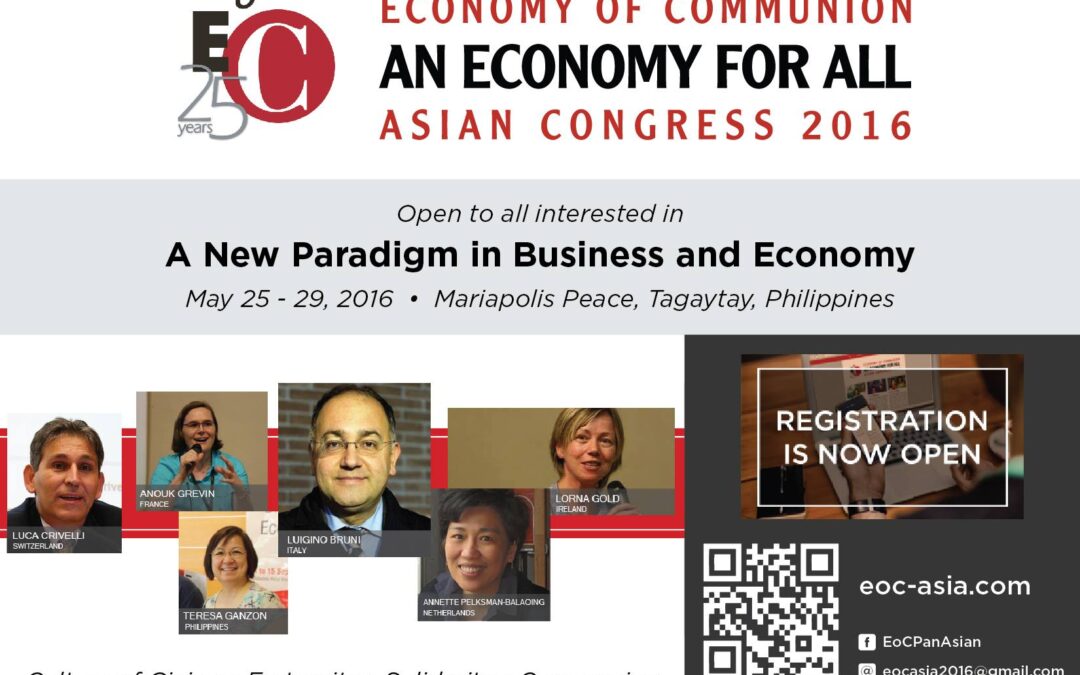
Feb 5, 2016 | Non categorizzato
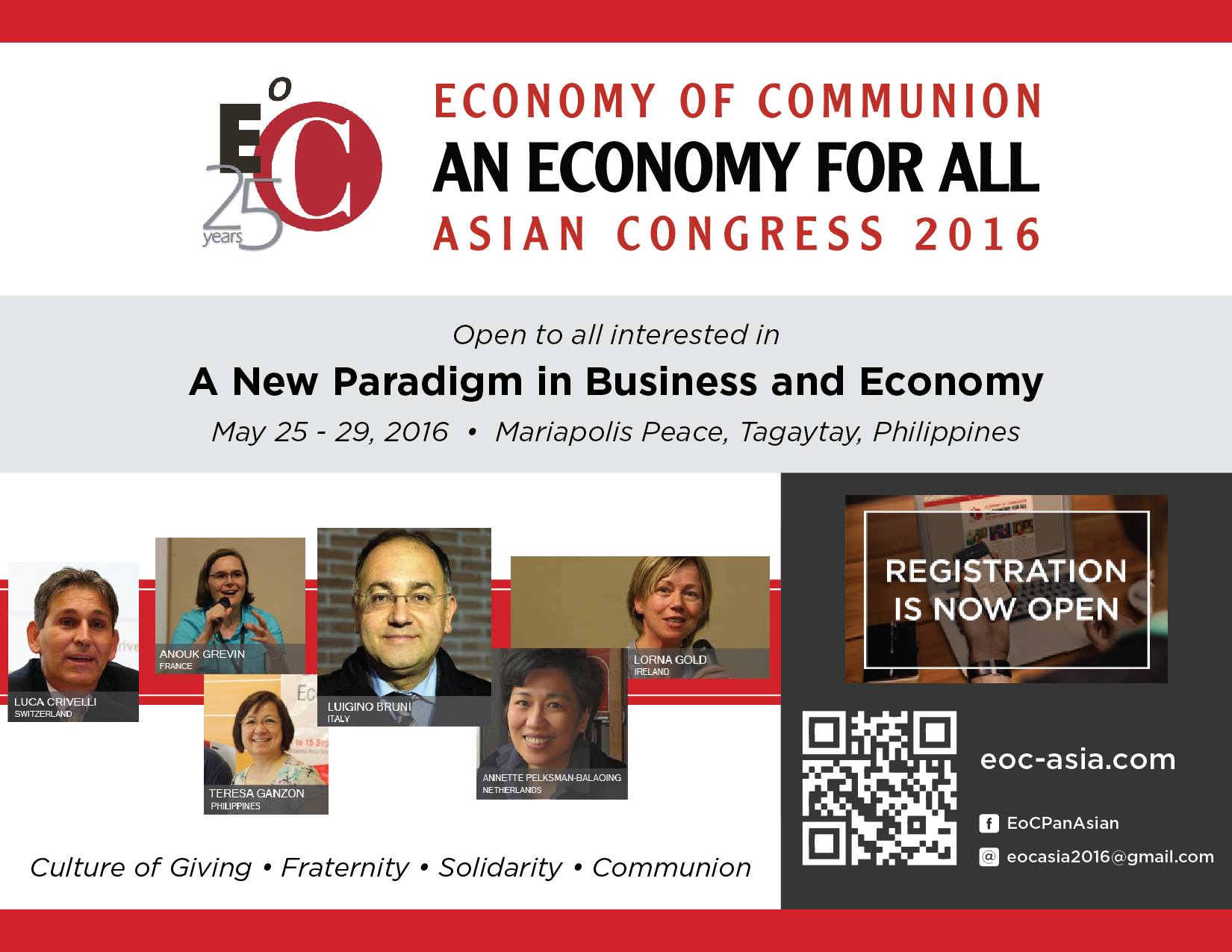 Invited are all interested advocates of a different way of viewing economy and doing business that is characterized by communion, fraternity and solidarity, especially with the weakest sectors of society. The congress hopes to bring together entrepreneurs, professors, young people and members of civil society with a passion for changing the business world, understanding in depth the challenges facing Asian nations despite the unprecedented economic growth of the past years, due to a continued adherence to the capitalist model and concept of economics – and what the economy of communion can offer to make the changes more meaningful and inclusive. Economists expected to be give their inputs in the congress include members of the international commission – Luigino Bruni (Italy), Anouk Grevin (France), Lorna Gold (Ireland), Teresa Ganzon (Philippines) and Luca Crivelli (Switzerland). Invited as a guest lecturer also is Dr. Annette Pelksman-Balaoing of the University of Rotterdam, Netherlands, to give a perspective on Globalization and how it has affected Asian nations in the past decade. It is expected to draw participants from different nations in Asia, as well as Australia. Live streaming playlist 25-29 May The EOC Pan Asian Congress will also have a celebration of EOC’s 25th anniversary on May 28th, even of the actual anniversary date on the 29th. Go to the EoC Asia web-site Register: More info: eocasia2016@gmail.com
Invited are all interested advocates of a different way of viewing economy and doing business that is characterized by communion, fraternity and solidarity, especially with the weakest sectors of society. The congress hopes to bring together entrepreneurs, professors, young people and members of civil society with a passion for changing the business world, understanding in depth the challenges facing Asian nations despite the unprecedented economic growth of the past years, due to a continued adherence to the capitalist model and concept of economics – and what the economy of communion can offer to make the changes more meaningful and inclusive. Economists expected to be give their inputs in the congress include members of the international commission – Luigino Bruni (Italy), Anouk Grevin (France), Lorna Gold (Ireland), Teresa Ganzon (Philippines) and Luca Crivelli (Switzerland). Invited as a guest lecturer also is Dr. Annette Pelksman-Balaoing of the University of Rotterdam, Netherlands, to give a perspective on Globalization and how it has affected Asian nations in the past decade. It is expected to draw participants from different nations in Asia, as well as Australia. Live streaming playlist 25-29 May The EOC Pan Asian Congress will also have a celebration of EOC’s 25th anniversary on May 28th, even of the actual anniversary date on the 29th. Go to the EoC Asia web-site Register: More info: eocasia2016@gmail.com
The YouTube links are: For Day 1, 25 May to Day 5, 29 May: Link to the playlist of the whole meeting: https://www.youtube.com/playlist?list=PLseXirhCvXpHfSeiIcXBqicR4Hfl4dxuB EoC 25° Anniversary Event – EoC Asian Congress 2016 (9:00PM – 10:00 PM Philippines time) https://youtu.be/pQpqh4REvWc
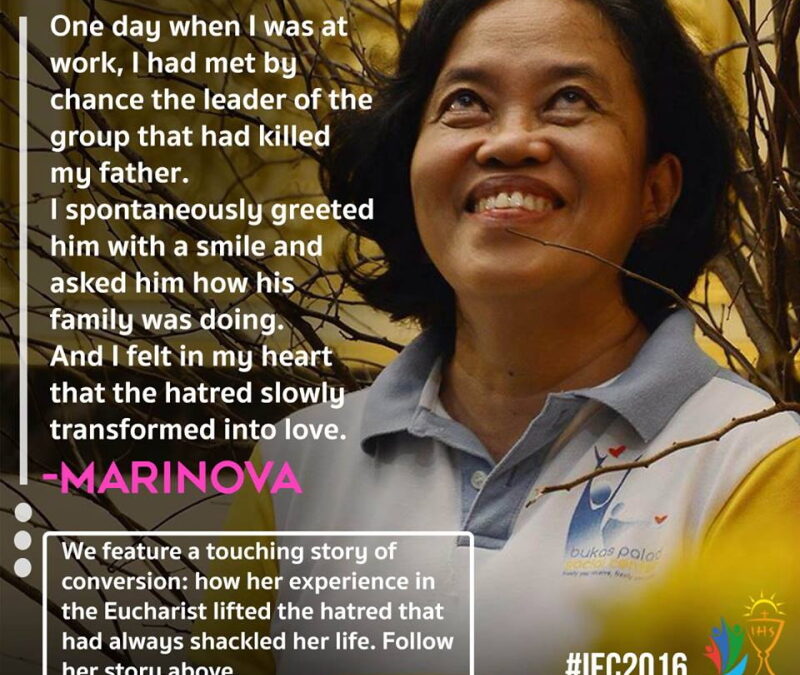
Feb 5, 2016 | Focolare Worldwide
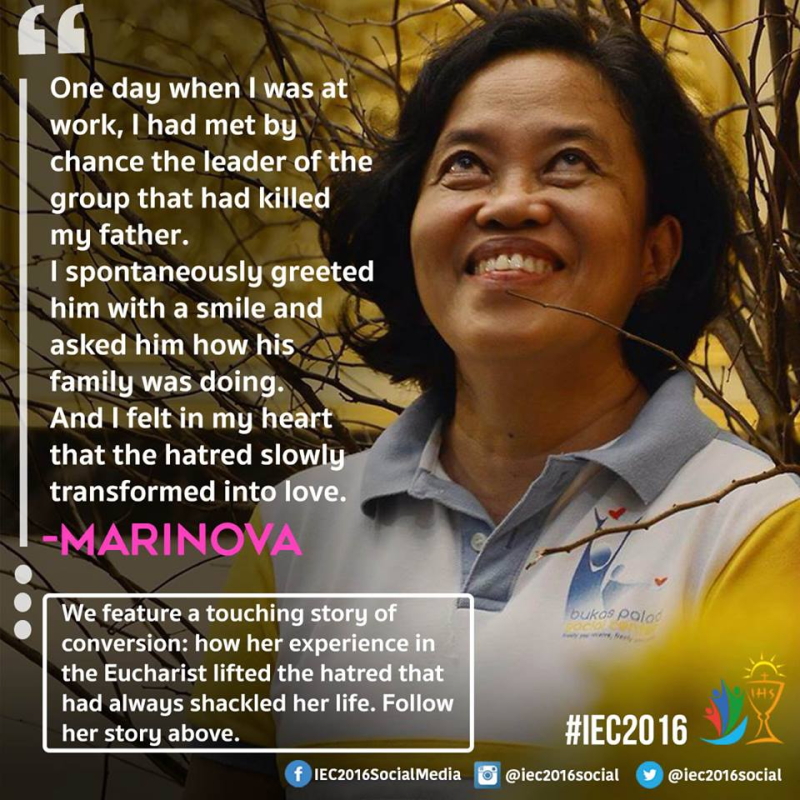 The 51st International Eucharistic Congress has been held in Cebu City, Philippines. (January 24th – 31st, 2016). The official social media coverage of the IEC 2016 scouted for meaningful life stories related to the Eucharist and published them in its facebook page (IEC2016SocialMedia). The experience of Marinova, a focolarina based in Cebu, touched them. “I was 11 years old when a big suffering came to my family. My father was killed by a group of persons who were very influential and no justice was served because we were poor. Our grandparents reminded us that true justice is found only in God! Thanks to their help I was able to finish college and got a job immediately. I became the bread winner of the family as I worked hard to help my mother. I incurred a lot of debts with loan sharks in order to bring ahead my family. Because of all these problems, an intense hatred developed in my heart for all those people who killed my father. They caused all the miseries in our life. Then I took up studies in Law because I wanted justice for the death of my father. But God had another plan for me. One of my classmates, a youth member of the Focolare Movement, invited me to a meeting of this ecclesial movement which has as its goal the fulfillment of Jesus’ prayer to the Father, ‘That they may all be one’, and strives to bring unity to the human family by translating the Gospel into life. A new adventure began in my life. I too started putting into practice the words of Jesus. He said: ‘Love and I will manifest myself to you. ‘Whatever you do to the least of your brethren you do it unto me.’ I became addicted to this new drug: LOVE… I found the essence and true meaning of my life and for the first time I felt that Jesus in the Eucharist was the source of it all. One day I asked Jesus to teach me how to live concretely his word ‘Love your enemy’, since I felt that hatred for those who killed my father still enveloped me. And indeed the following day, at work, I met by chance the leader of the group. Spontaneously I greeted him with a smile and asked him how everyone in his family was. I saw that this greeting was a great surprise for him. I was even more surprised by what I was did. Little by little I felt that the hatred within me was melting and was slowly being transformed into love! But that was only the first step! Love is creative! I felt that each one in the group should feel that we had forgiven him. Together with one of my brothers, we visited them trying to re-build our relationship and to make them understand that God loves them! It came to a point that one of them asked for forgiveness for what he had done and in turn asked for prayers for his family and his health. I knew clearly that this experience of forgiveness and healing was the transforming power of Jesus in the Eucharist.”.
The 51st International Eucharistic Congress has been held in Cebu City, Philippines. (January 24th – 31st, 2016). The official social media coverage of the IEC 2016 scouted for meaningful life stories related to the Eucharist and published them in its facebook page (IEC2016SocialMedia). The experience of Marinova, a focolarina based in Cebu, touched them. “I was 11 years old when a big suffering came to my family. My father was killed by a group of persons who were very influential and no justice was served because we were poor. Our grandparents reminded us that true justice is found only in God! Thanks to their help I was able to finish college and got a job immediately. I became the bread winner of the family as I worked hard to help my mother. I incurred a lot of debts with loan sharks in order to bring ahead my family. Because of all these problems, an intense hatred developed in my heart for all those people who killed my father. They caused all the miseries in our life. Then I took up studies in Law because I wanted justice for the death of my father. But God had another plan for me. One of my classmates, a youth member of the Focolare Movement, invited me to a meeting of this ecclesial movement which has as its goal the fulfillment of Jesus’ prayer to the Father, ‘That they may all be one’, and strives to bring unity to the human family by translating the Gospel into life. A new adventure began in my life. I too started putting into practice the words of Jesus. He said: ‘Love and I will manifest myself to you. ‘Whatever you do to the least of your brethren you do it unto me.’ I became addicted to this new drug: LOVE… I found the essence and true meaning of my life and for the first time I felt that Jesus in the Eucharist was the source of it all. One day I asked Jesus to teach me how to live concretely his word ‘Love your enemy’, since I felt that hatred for those who killed my father still enveloped me. And indeed the following day, at work, I met by chance the leader of the group. Spontaneously I greeted him with a smile and asked him how everyone in his family was. I saw that this greeting was a great surprise for him. I was even more surprised by what I was did. Little by little I felt that the hatred within me was melting and was slowly being transformed into love! But that was only the first step! Love is creative! I felt that each one in the group should feel that we had forgiven him. Together with one of my brothers, we visited them trying to re-build our relationship and to make them understand that God loves them! It came to a point that one of them asked for forgiveness for what he had done and in turn asked for prayers for his family and his health. I knew clearly that this experience of forgiveness and healing was the transforming power of Jesus in the Eucharist.”.

Feb 4, 2016 | Focolare Worldwide
 The sign from heaven While I was waiting to have a check-up at the doctor’s, I happened to hear a lady pregnant with her fourth child, say to the secretary that she could not keep the child, given her economic conditions. “God will keep him in mind”, she concluded. Since I could not remain indifferent to this news, I immediately recounted this to my close friends, and together we decided to collect some funds among us. I then went to the doctor’s secretary to ask her to give the money to that lady without revealing its source. In the meantime we entrusted all this to God. Time passed and we did not know the outcome; somebody noted that the lady’s tummy continued to grow (we live in a small town where we all know one another) In the end, a beautiful baby was born. After a year I received the lady’s thanks, since she had guessed where that money had come from: “The day before the abortion, I had asked God to enlighten me on the right thing to do. Late in the evening, the doctor’s secretary came by with your envelope. For me it was a sign from heaven.” (R. – Italy) The iron Corina needed an iron. My first thought was to entrust her need to God’s providence. Later, a lady invited me to a parish breakfast. Since I had so many things to do, I felt like saying no. But I accepted just to make her happy. I found myself having coffee with some elderly ladies who were pleased to have a young person in their midst. It was there that I saw an acquaintance: she had bought an iron that was too heavy for her, and she asked me if I knew of anyone who needed it. I was happy and immediately thought of my prayer. (I.- Switzerland) While waiting for the train… I had been betrayed by the people I loved and had thus left the family to live on my own. I was severely depressed, and had tried to kill myself a few times. The last time was in a small train station. While I was waiting for the first train to throw myself on the rails, a nun joined me at the tracks and convinced me to desist. Then she took care of me, and introduced me to a rehab community that welcomed me with open arms. At first, I refused the love they showed me due to the hatred I harboured inside. Even if I did not want to hear about God, one of them convinced me to read the Bible. Little by little the hardness of my heart began to melt and faith started to grow inside me. Some years have passed and I have learned to forgive, love my neighbor and be patient… Now I have reconnected also with my relatives, I have a job, a home, and feel serene. Nothing happens by chance. Thanks to God who has made me experience his immense love! (C. – Italy)
The sign from heaven While I was waiting to have a check-up at the doctor’s, I happened to hear a lady pregnant with her fourth child, say to the secretary that she could not keep the child, given her economic conditions. “God will keep him in mind”, she concluded. Since I could not remain indifferent to this news, I immediately recounted this to my close friends, and together we decided to collect some funds among us. I then went to the doctor’s secretary to ask her to give the money to that lady without revealing its source. In the meantime we entrusted all this to God. Time passed and we did not know the outcome; somebody noted that the lady’s tummy continued to grow (we live in a small town where we all know one another) In the end, a beautiful baby was born. After a year I received the lady’s thanks, since she had guessed where that money had come from: “The day before the abortion, I had asked God to enlighten me on the right thing to do. Late in the evening, the doctor’s secretary came by with your envelope. For me it was a sign from heaven.” (R. – Italy) The iron Corina needed an iron. My first thought was to entrust her need to God’s providence. Later, a lady invited me to a parish breakfast. Since I had so many things to do, I felt like saying no. But I accepted just to make her happy. I found myself having coffee with some elderly ladies who were pleased to have a young person in their midst. It was there that I saw an acquaintance: she had bought an iron that was too heavy for her, and she asked me if I knew of anyone who needed it. I was happy and immediately thought of my prayer. (I.- Switzerland) While waiting for the train… I had been betrayed by the people I loved and had thus left the family to live on my own. I was severely depressed, and had tried to kill myself a few times. The last time was in a small train station. While I was waiting for the first train to throw myself on the rails, a nun joined me at the tracks and convinced me to desist. Then she took care of me, and introduced me to a rehab community that welcomed me with open arms. At first, I refused the love they showed me due to the hatred I harboured inside. Even if I did not want to hear about God, one of them convinced me to read the Bible. Little by little the hardness of my heart began to melt and faith started to grow inside me. Some years have passed and I have learned to forgive, love my neighbor and be patient… Now I have reconnected also with my relatives, I have a job, a home, and feel serene. Nothing happens by chance. Thanks to God who has made me experience his immense love! (C. – Italy)
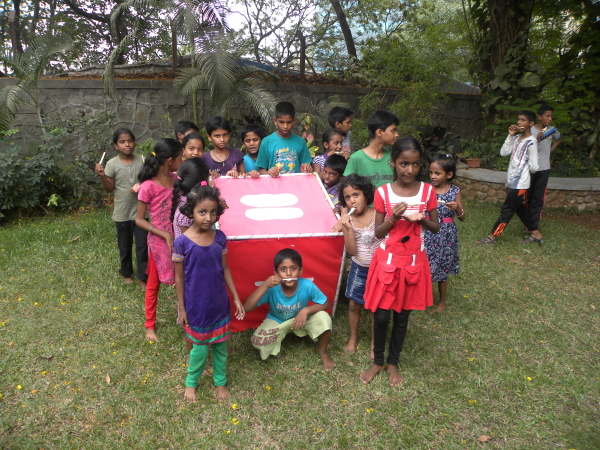
Feb 3, 2016 | Focolare Worldwide
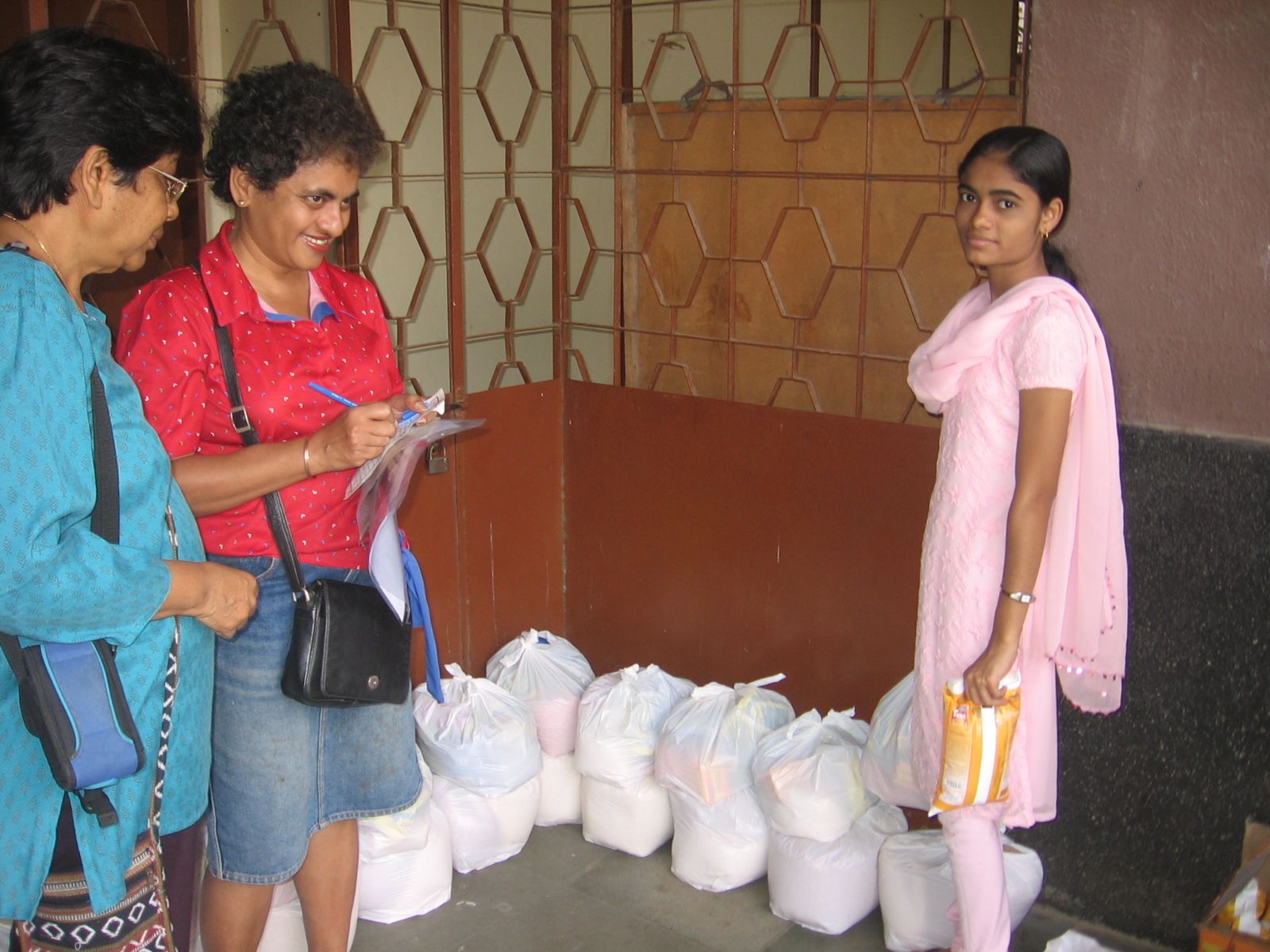 “One can either walk away from the problems in another’s life or embrace the challenge head on. For a Movement that has chosen the suffering face of Jesus on the Cross, it is only natural that the Focolare in Mumbai chose to welcome the challenges among its communities with love and dedication,” writes Annabel, a young journalist, member of the Focolare in Mumbai. Santacruz Project and Udisha have come to symbolize the Movement’s strong commitment to social justice, universal fraternity and, above all, love for Jesus in the other in this city. Santacruz Project started in 1992 as a direct response to the needs of families struggling with poverty, addictions and lack of jobs. It provides basic food rations and household supplies so that children from these homes can continue their education. “We realized that many of these little girls attending our activities didn’t even have enough to eat at home. In order to love them concretely, we had to empower their families to give them enough food and keep them in school. We struggled initially to fund this project, pulling together our resources and gathering contributions from the larger Focolare family here in India. I’m happy that we’ve been able to sustain this project for over 25 years now,” says Joan Viegas, one of the earliest volunteers from Mumbai involved in the project. “Somewhere along the way we realized that spiritual nourishment was equally necessary for these families to face society’s challenges. We organized Word of Life meetings for the girls’ mothers who desperately needed a space to express themselves, share their troubles and find spiritual strength. One of us, Josephine Passanha who is passed away, started conducting meetings in Konkani for these women who could not speak English, and also organized useful workshops on life skills such as budgeting and family planning to empower them.“
“One can either walk away from the problems in another’s life or embrace the challenge head on. For a Movement that has chosen the suffering face of Jesus on the Cross, it is only natural that the Focolare in Mumbai chose to welcome the challenges among its communities with love and dedication,” writes Annabel, a young journalist, member of the Focolare in Mumbai. Santacruz Project and Udisha have come to symbolize the Movement’s strong commitment to social justice, universal fraternity and, above all, love for Jesus in the other in this city. Santacruz Project started in 1992 as a direct response to the needs of families struggling with poverty, addictions and lack of jobs. It provides basic food rations and household supplies so that children from these homes can continue their education. “We realized that many of these little girls attending our activities didn’t even have enough to eat at home. In order to love them concretely, we had to empower their families to give them enough food and keep them in school. We struggled initially to fund this project, pulling together our resources and gathering contributions from the larger Focolare family here in India. I’m happy that we’ve been able to sustain this project for over 25 years now,” says Joan Viegas, one of the earliest volunteers from Mumbai involved in the project. “Somewhere along the way we realized that spiritual nourishment was equally necessary for these families to face society’s challenges. We organized Word of Life meetings for the girls’ mothers who desperately needed a space to express themselves, share their troubles and find spiritual strength. One of us, Josephine Passanha who is passed away, started conducting meetings in Konkani for these women who could not speak English, and also organized useful workshops on life skills such as budgeting and family planning to empower them.“ 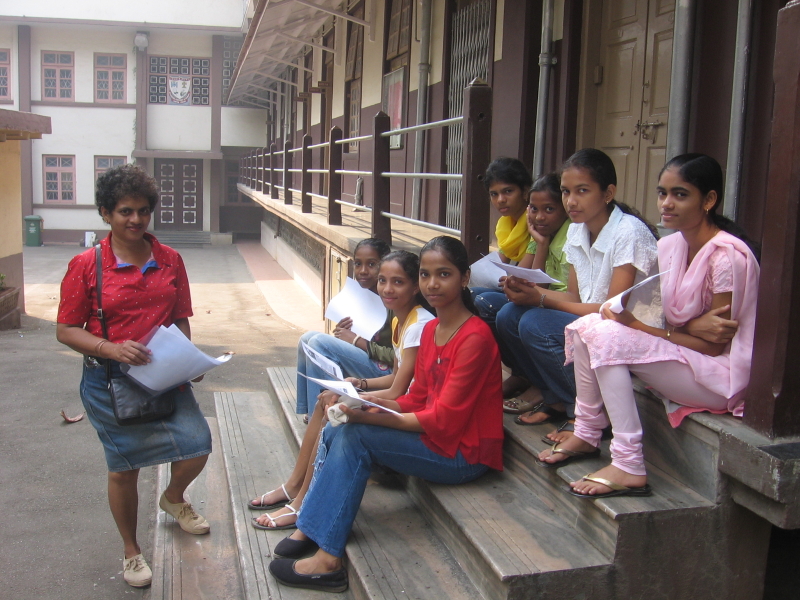 During her first visit to India in 2001, Chiara encouraged the members of the Focolare in Mumbai to reach out even further to people at the periphery of society. This gave a strong thrust to the already on-going Udisha Project in Goregaon which focusses on the holistic development of children from underprivileged backgrounds. Literally translating as a ‘ray of light’ in Sanskrit, Udisha is lighting up the lives of over 120 children today through its various activities such as academic tuition classes, occupational therapy, anger management sessions, medical camps and programs promoting value education and parenting skills. Counselling has becoming one of Udisha’s key specialisations, helping many children and their parents solve many day-to-day challenges, sometimes even saving lives from suicidal tendencies. Self-Help Groups empower mothers of these children to manage their household income and supplement it by starting small enterprises such as crochet bag making, catering and beautician services.
During her first visit to India in 2001, Chiara encouraged the members of the Focolare in Mumbai to reach out even further to people at the periphery of society. This gave a strong thrust to the already on-going Udisha Project in Goregaon which focusses on the holistic development of children from underprivileged backgrounds. Literally translating as a ‘ray of light’ in Sanskrit, Udisha is lighting up the lives of over 120 children today through its various activities such as academic tuition classes, occupational therapy, anger management sessions, medical camps and programs promoting value education and parenting skills. Counselling has becoming one of Udisha’s key specialisations, helping many children and their parents solve many day-to-day challenges, sometimes even saving lives from suicidal tendencies. Self-Help Groups empower mothers of these children to manage their household income and supplement it by starting small enterprises such as crochet bag making, catering and beautician services.  “Udisha has evolved into a full-fledged organisation with the help of the larger Focolare community all over Mumbai, as well as with the Support at a Distance help we receive from the New Families Movement of the Focolare”, says Brian D’Silva, who has been spearheading the project since the beginning. “We try to reach out to more families every day, always bearing in mind that it is Jesus who we serve in each individual. It gives me great satisfaction to see our children from Udisha who are well-educated, employed and positively contributing to society today.”
“Udisha has evolved into a full-fledged organisation with the help of the larger Focolare community all over Mumbai, as well as with the Support at a Distance help we receive from the New Families Movement of the Focolare”, says Brian D’Silva, who has been spearheading the project since the beginning. “We try to reach out to more families every day, always bearing in mind that it is Jesus who we serve in each individual. It gives me great satisfaction to see our children from Udisha who are well-educated, employed and positively contributing to society today.”
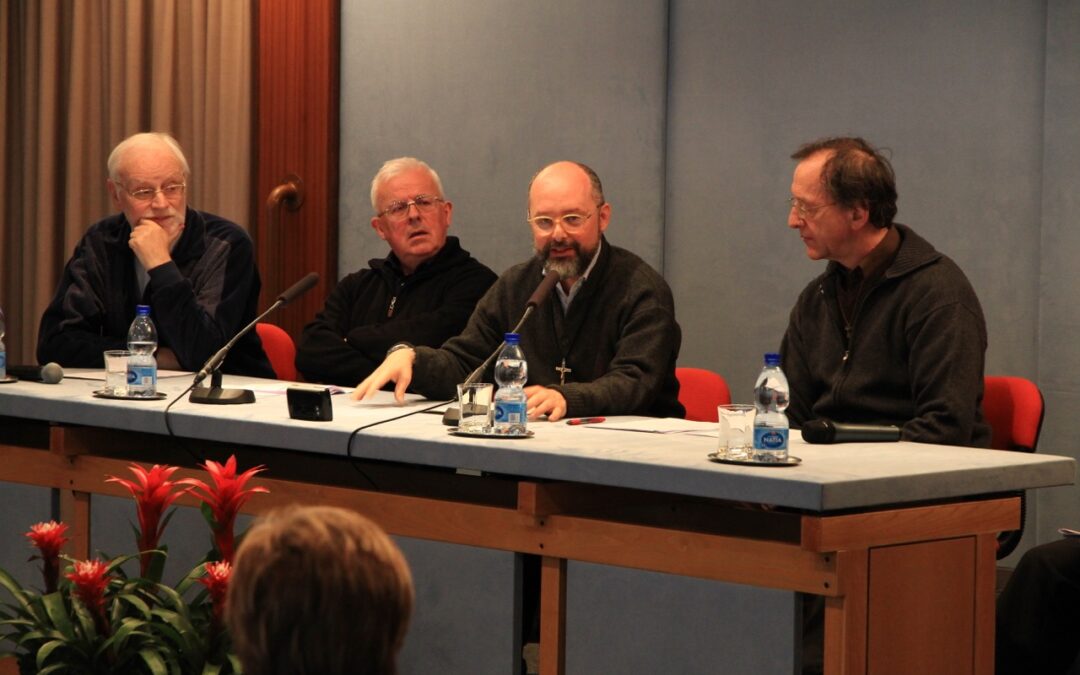
Feb 2, 2016 | Non categorizzato
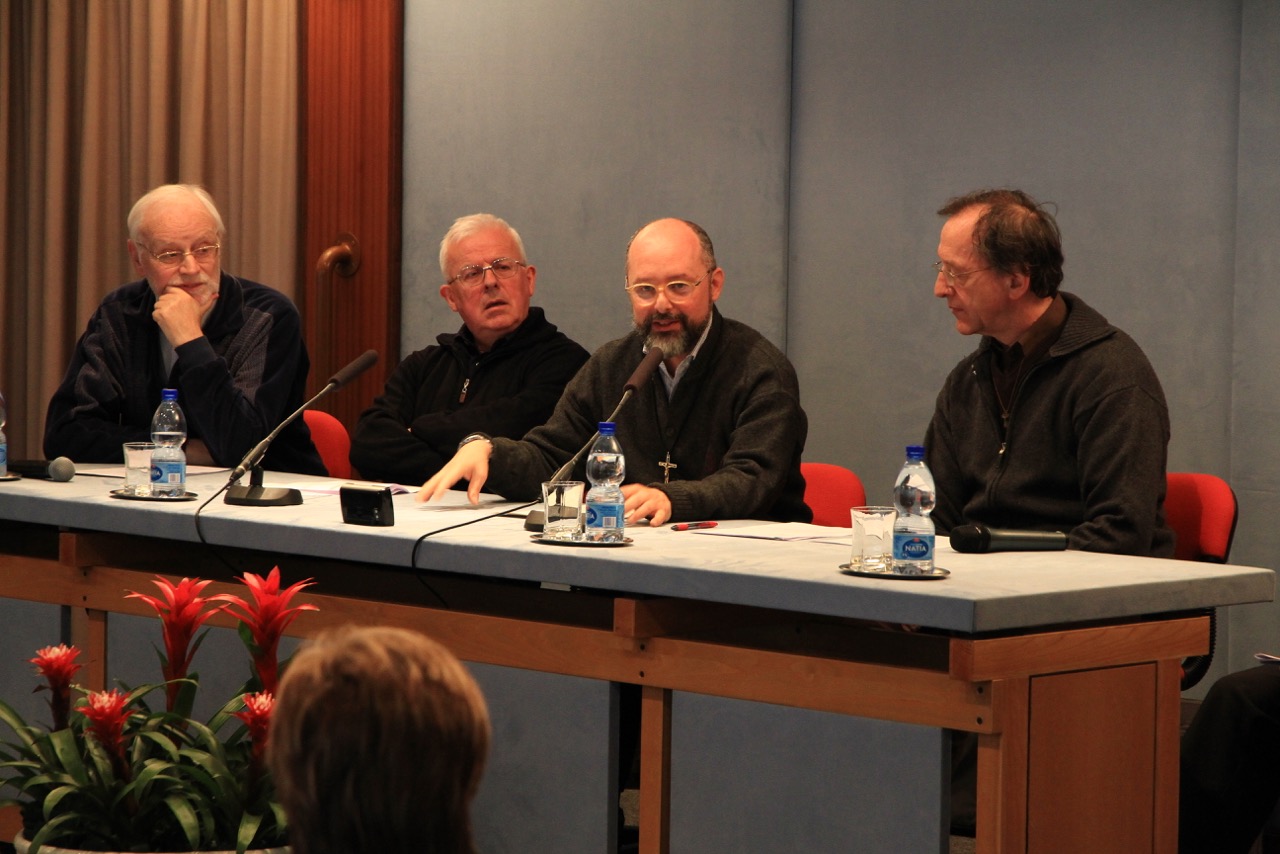 Fr Salvo, could you draw a conclusion to this regard? «It was the endowment of a very strong grace that touched also the ample strata of the Church, besides of course, affecting all the consecrated members. Pope Francis imbued this year with particularly inspiring thoughts and events also through the Congregation for the Institutes of Consecrated Life and the Apostolic Life Societies (CIVCSVA). Of course it is still too early to take stock of everything, since I am convinced that it was an in-depth event and the fruits will be fully seen as time passes.» What role did the Religious members of the Focolare play? «The particular sensitivity to unity, typical of Chiara Lubich’s spirituality, offers to the members of the Movement, a sort of know-how that inspires them to give priority to relationships and transform them into communion. The religious men and women belonging to the Focolare committed themselves to the initiatives of their communities and dioceses, or to national activities and those of the universal Church, giving their imprint of communion, a spirit the Church hoped would develop more and more as the “home and school of communion.” In one of the European countries, it was precisely the religious and consecrated people of the Movement who proposed the project of an encounter for consecrated youth, to the Conference of Major Superiors. The heads highly appreciated the contents and methods, so as to make it their own initiative. Around 250 young religious participated, with really important impressions and results.» And with regard to the initiatives set up by the Holy Father and the Congregation of Consecrated Life? Great importance was given to Pope Francis’s invitation to show the joy of consecrated life and to prophetically act in the “existential outskirts,” as expressed in his Apostolic Letter to all the consecrated men and women: “I expect you to «wake the world up», because the typical feature of consecrated life is prophecy.” He thus underlined a specific attribute of Religious Life characterised by that of being harbingers of charismas, that is, of gifts for the good of the entire Church. TCIVCSVA then developed the thoughts of Pope Francis with three letters: one dedicated to Joy which must distinguish the consecrated religious (Rejoice); another dealing with their capacity to be prophets for the world (Keep Watch); and the third, a contemplative dimension of their life (Contemplate). These three documents are a reference point for the future of Consecrated Life in the Church. As to the events, we certainly must note the meeting in Rome of the young religious last September. It was a convention of great impact, with 5,000 participants from all over the world, and lasted 4 days. It is not something we see often. It also impressed me because of the significance of the ecumenical Dialogue of religious men and women held from 22 to 25 January 2015. This was an absolute “first” in the Vatican, which Pope Francis wanted so much, and a sign of the progress of the journey among Christians of various denominations. Fr. José M. Hernández, a Claretian, said that each one is called to “be a bridge and not a trench” among Christians. I think this is a good augur which well expresses the rest of the journey we still have to undertake.»
Fr Salvo, could you draw a conclusion to this regard? «It was the endowment of a very strong grace that touched also the ample strata of the Church, besides of course, affecting all the consecrated members. Pope Francis imbued this year with particularly inspiring thoughts and events also through the Congregation for the Institutes of Consecrated Life and the Apostolic Life Societies (CIVCSVA). Of course it is still too early to take stock of everything, since I am convinced that it was an in-depth event and the fruits will be fully seen as time passes.» What role did the Religious members of the Focolare play? «The particular sensitivity to unity, typical of Chiara Lubich’s spirituality, offers to the members of the Movement, a sort of know-how that inspires them to give priority to relationships and transform them into communion. The religious men and women belonging to the Focolare committed themselves to the initiatives of their communities and dioceses, or to national activities and those of the universal Church, giving their imprint of communion, a spirit the Church hoped would develop more and more as the “home and school of communion.” In one of the European countries, it was precisely the religious and consecrated people of the Movement who proposed the project of an encounter for consecrated youth, to the Conference of Major Superiors. The heads highly appreciated the contents and methods, so as to make it their own initiative. Around 250 young religious participated, with really important impressions and results.» And with regard to the initiatives set up by the Holy Father and the Congregation of Consecrated Life? Great importance was given to Pope Francis’s invitation to show the joy of consecrated life and to prophetically act in the “existential outskirts,” as expressed in his Apostolic Letter to all the consecrated men and women: “I expect you to «wake the world up», because the typical feature of consecrated life is prophecy.” He thus underlined a specific attribute of Religious Life characterised by that of being harbingers of charismas, that is, of gifts for the good of the entire Church. TCIVCSVA then developed the thoughts of Pope Francis with three letters: one dedicated to Joy which must distinguish the consecrated religious (Rejoice); another dealing with their capacity to be prophets for the world (Keep Watch); and the third, a contemplative dimension of their life (Contemplate). These three documents are a reference point for the future of Consecrated Life in the Church. As to the events, we certainly must note the meeting in Rome of the young religious last September. It was a convention of great impact, with 5,000 participants from all over the world, and lasted 4 days. It is not something we see often. It also impressed me because of the significance of the ecumenical Dialogue of religious men and women held from 22 to 25 January 2015. This was an absolute “first” in the Vatican, which Pope Francis wanted so much, and a sign of the progress of the journey among Christians of various denominations. Fr. José M. Hernández, a Claretian, said that each one is called to “be a bridge and not a trench” among Christians. I think this is a good augur which well expresses the rest of the journey we still have to undertake.»
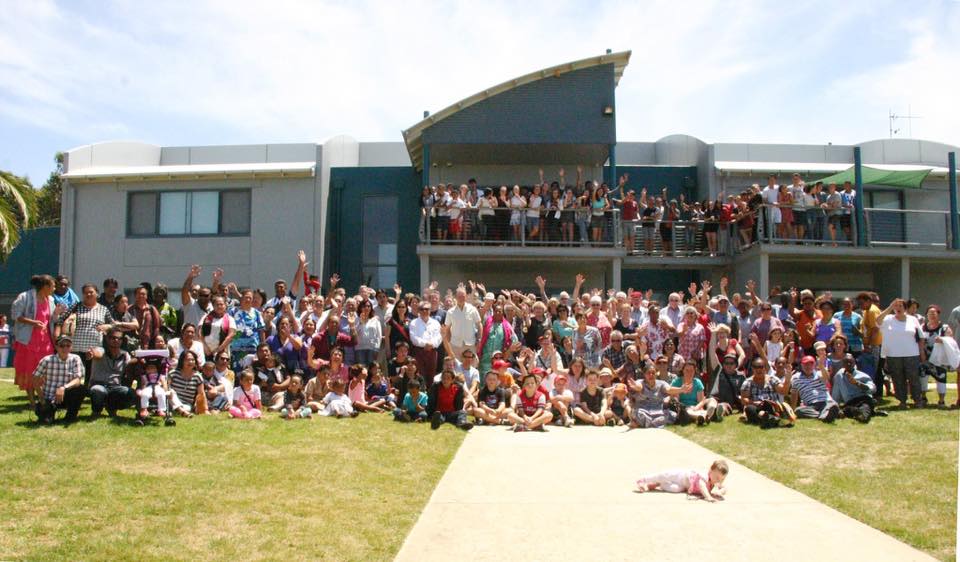
Feb 1, 2016 | Focolare Worldwide, Senza categoria
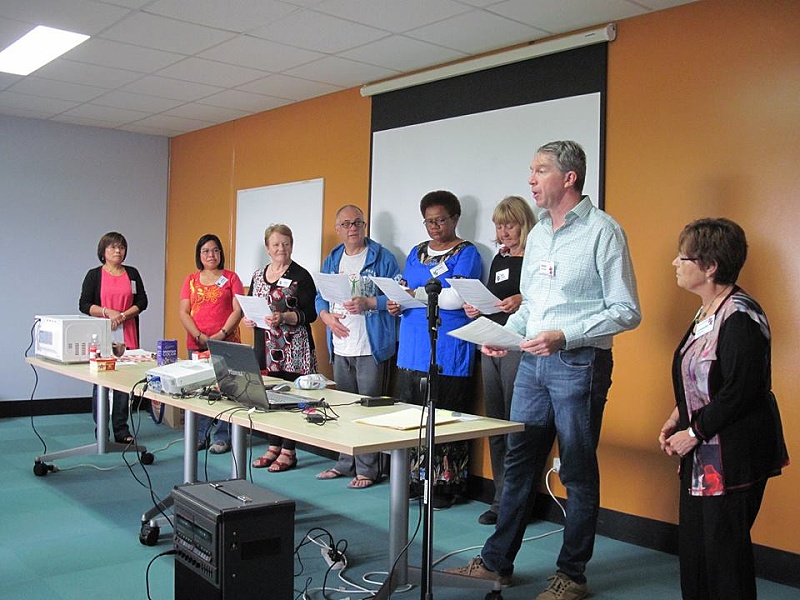 Five hundred and forty people from different countries – half of them families and young people – were together for four days. There were two refugees from Burundi and a group from Syria, 169 people from the Pacific Islands (New Caledonia, Wallis & Futuna, Fiji and Kiribati). The Mariapolis was held on January 13-17 on Phillip Island, 150 km from Melbourne (Australia). The title chosen for the event was “Building Unity Together”. The organisers write: “This central point of the spirituality of unity was examined in a formal presentation and immediately embraced and lived out each day of the Mariapolis by all the participants, some of them from very different cultural backgrounds.”
Five hundred and forty people from different countries – half of them families and young people – were together for four days. There were two refugees from Burundi and a group from Syria, 169 people from the Pacific Islands (New Caledonia, Wallis & Futuna, Fiji and Kiribati). The Mariapolis was held on January 13-17 on Phillip Island, 150 km from Melbourne (Australia). The title chosen for the event was “Building Unity Together”. The organisers write: “This central point of the spirituality of unity was examined in a formal presentation and immediately embraced and lived out each day of the Mariapolis by all the participants, some of them from very different cultural backgrounds.” 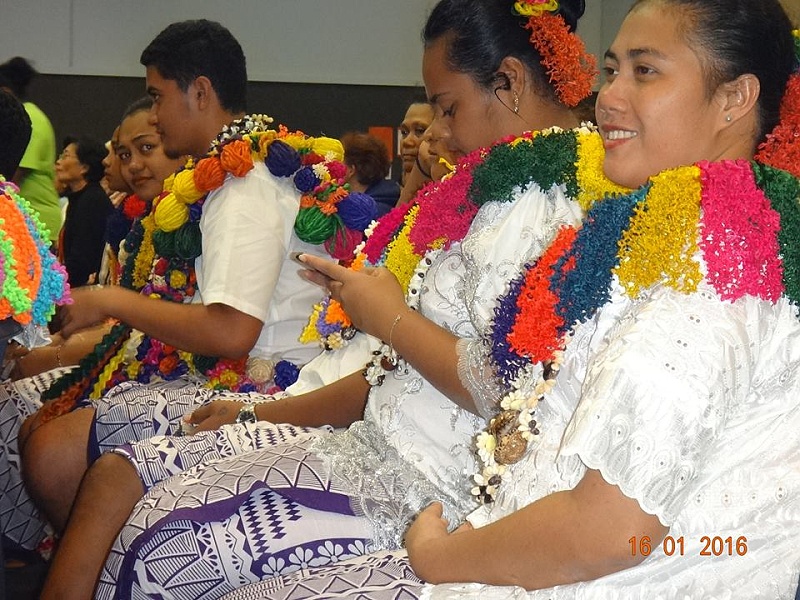 The people who came from the Pacific Islands made a great contribution beginning from their common witness of raising the money to be there: “like the representative from Kiribati who took leave of his work as a seaman in order to be able to attend. There were many beautiful testimonies of Gospel living and how they managed to overcome the many economic problems and raise the money to pay for the flight and lodging. A communion of goods was set in motion a bit like that of the early Christians, and it made everyone experience God’s personal love for them because of the Providence that arrived in many different ways. When they arrived at the Mariapolis they spoke of finding the same family that was no different from the one they had left behind.”
The people who came from the Pacific Islands made a great contribution beginning from their common witness of raising the money to be there: “like the representative from Kiribati who took leave of his work as a seaman in order to be able to attend. There were many beautiful testimonies of Gospel living and how they managed to overcome the many economic problems and raise the money to pay for the flight and lodging. A communion of goods was set in motion a bit like that of the early Christians, and it made everyone experience God’s personal love for them because of the Providence that arrived in many different ways. When they arrived at the Mariapolis they spoke of finding the same family that was no different from the one they had left behind.”  Every day ended in an atmosphere of celebration and gratitude for each ethnic group that was represented, like a small slice of a united world. Everyone felt that “The unity of peoples was not a utopia.” The people from the islands stayed on for an extra week at the Mariapolis Centre in Melbourne, where they attended a course on family life. “Each day is like a mutual love competition, and we look forward to the next activity with much joy and enthusiasm. There’s a saying, “From little things big things grow”, and we’re sure that great things will grow from Jesus in our midst through our mutual love.” See on Facebook: Phillip Island Mariapolis 2016
Every day ended in an atmosphere of celebration and gratitude for each ethnic group that was represented, like a small slice of a united world. Everyone felt that “The unity of peoples was not a utopia.” The people from the islands stayed on for an extra week at the Mariapolis Centre in Melbourne, where they attended a course on family life. “Each day is like a mutual love competition, and we look forward to the next activity with much joy and enthusiasm. There’s a saying, “From little things big things grow”, and we’re sure that great things will grow from Jesus in our midst through our mutual love.” See on Facebook: Phillip Island Mariapolis 2016
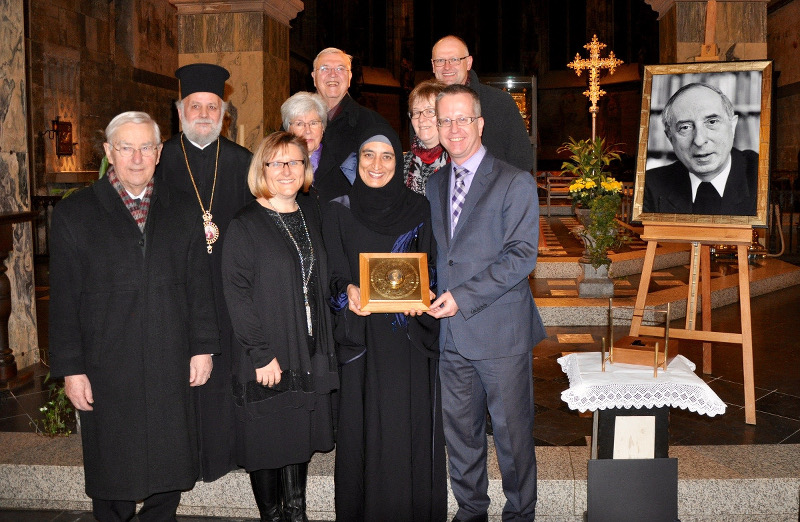
Jan 31, 2016 | Focolare Worldwide
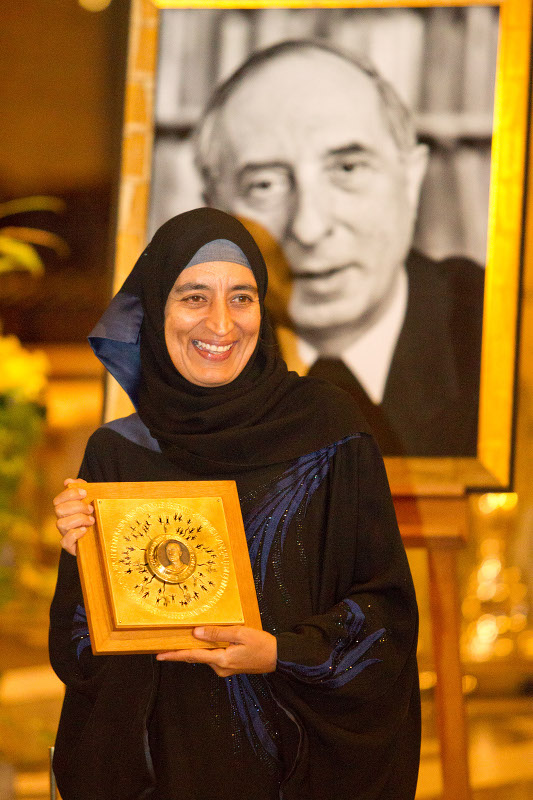
Foto: Martin Felder

Foto: Ulrike Comes
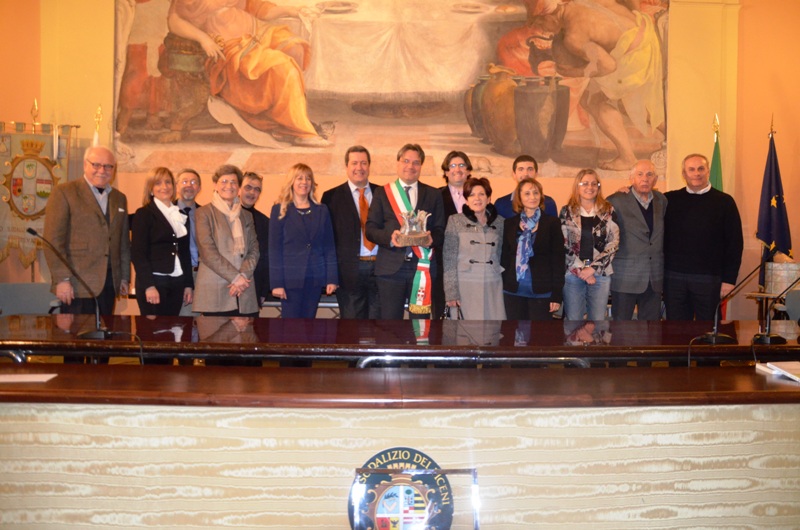
Jan 30, 2016 | Focolare Worldwide
 Asti, the Piedmont (Italy) municipality renowned worldwide for its wines and an old pre-Roman settlement, boasts another first: that of being the first Italian municipality to have inserted the principle of Fraternity in its Municipal Statutes, as one of the main inspiring principles. «The Municipality of Asti considers the value of Fraternity as the condition for its political actions, in the common awareness that diversity is enrichment and to which every person elected in this institution is subjected to, and who should thus be recognised with equal dignity and respect and is therefore called to place the good of the community before partial interests, whether personal, of the group or the political party.» This is the text that passed with a unanimous vote on 19 February 2015, and won for the Municipality, the prize awarded in Rome by Mayor Fabrizio Brignolo last 22 January. How is this inspiring principle concretely practiced by the citizens? At the awarding of the prize, the Mayor of Asti recalled how the Asti community is very active in projects that express the value of fraternity in a concrete way: in the issue of welcoming the refugees with individual projects, a system of social services that targets to involve the beneficiaries in projects of recovery of independence in the employment and social fields, to name a few. So is the Municipality’s political life very simple? Not at all. A municipal councillor said: «The truth is, despite the fact that our ideals and political and cultural differences will not be eliminated, it also holds that moments of tension and conflicts will not be missing in our political –administrative debate. But it is likewise true that, from today onwards, we have a reference point and an extra precious tool that pushes us to seek the grounds for sharing, and in which we can exercise a serene approach to the building of fraternity. It is certainly a difficult challenge which we intend to win with courage and confidence. » The prize of the association, Cities for Fraternity, was awarded last 22 January by the president, Milvia Monachesi, Mayor of Castelgandolfo, together with Alba Sgariglia and João Manuel Motta of the Chiara Lubich Centre of the Focolare Movement, during the convention entitled, “Can Fraternity become a norm?” emceed by the journalist, Gianni Bianco, in the capital’s Hall, Pio Sodalizio dei Piceni (watch the live shoot ). Of great significance were the speeches of Prof. Filippo Pizzolato (Bicocca University, Milan) and Tiziano Vecchiato (Scientific Director of the Zancan Foundation, Padova), and the round table of the experiences and conflicts of the Municipalities that have inserted the principle of fraternity in their statutes: Asti, Bra, Grottaferrata and Rocca di Papa. Other honours were conferred to three other Municipalities: • Special Honours for the City of Rocca di Papa, which had launched the project of United Cities for Fraternity: «From darkness to light: “Wednesdays in the village”» with the mission to “enlighten the outstanding features and reunite hearts and minds” of the inhabitants – both Italians and of other nationalities – of Rocca di Papa. • Special Honours for the Municipality of Tolentino for the project, “Tolentino – city for fraternity” and the organisation of the “Fraternity Dinner,” a traditional event with the cooperation of the voluntary associations and citizens, where the funds collected were assigned to the poor people in the municipality. • Special Honours for the Municipality of Grottaferrata for the insertion of the value of Fraternity in the Municipal Statutes, as the condition for political action, unanimously approved by the Municipal Council on 27 April 2015. https://www.youtube.com/watch?v=cEtFoAdo6IE https://www.youtube.com/watch?v=P9bfpKF30Wk
Asti, the Piedmont (Italy) municipality renowned worldwide for its wines and an old pre-Roman settlement, boasts another first: that of being the first Italian municipality to have inserted the principle of Fraternity in its Municipal Statutes, as one of the main inspiring principles. «The Municipality of Asti considers the value of Fraternity as the condition for its political actions, in the common awareness that diversity is enrichment and to which every person elected in this institution is subjected to, and who should thus be recognised with equal dignity and respect and is therefore called to place the good of the community before partial interests, whether personal, of the group or the political party.» This is the text that passed with a unanimous vote on 19 February 2015, and won for the Municipality, the prize awarded in Rome by Mayor Fabrizio Brignolo last 22 January. How is this inspiring principle concretely practiced by the citizens? At the awarding of the prize, the Mayor of Asti recalled how the Asti community is very active in projects that express the value of fraternity in a concrete way: in the issue of welcoming the refugees with individual projects, a system of social services that targets to involve the beneficiaries in projects of recovery of independence in the employment and social fields, to name a few. So is the Municipality’s political life very simple? Not at all. A municipal councillor said: «The truth is, despite the fact that our ideals and political and cultural differences will not be eliminated, it also holds that moments of tension and conflicts will not be missing in our political –administrative debate. But it is likewise true that, from today onwards, we have a reference point and an extra precious tool that pushes us to seek the grounds for sharing, and in which we can exercise a serene approach to the building of fraternity. It is certainly a difficult challenge which we intend to win with courage and confidence. » The prize of the association, Cities for Fraternity, was awarded last 22 January by the president, Milvia Monachesi, Mayor of Castelgandolfo, together with Alba Sgariglia and João Manuel Motta of the Chiara Lubich Centre of the Focolare Movement, during the convention entitled, “Can Fraternity become a norm?” emceed by the journalist, Gianni Bianco, in the capital’s Hall, Pio Sodalizio dei Piceni (watch the live shoot ). Of great significance were the speeches of Prof. Filippo Pizzolato (Bicocca University, Milan) and Tiziano Vecchiato (Scientific Director of the Zancan Foundation, Padova), and the round table of the experiences and conflicts of the Municipalities that have inserted the principle of fraternity in their statutes: Asti, Bra, Grottaferrata and Rocca di Papa. Other honours were conferred to three other Municipalities: • Special Honours for the City of Rocca di Papa, which had launched the project of United Cities for Fraternity: «From darkness to light: “Wednesdays in the village”» with the mission to “enlighten the outstanding features and reunite hearts and minds” of the inhabitants – both Italians and of other nationalities – of Rocca di Papa. • Special Honours for the Municipality of Tolentino for the project, “Tolentino – city for fraternity” and the organisation of the “Fraternity Dinner,” a traditional event with the cooperation of the voluntary associations and citizens, where the funds collected were assigned to the poor people in the municipality. • Special Honours for the Municipality of Grottaferrata for the insertion of the value of Fraternity in the Municipal Statutes, as the condition for political action, unanimously approved by the Municipal Council on 27 April 2015. https://www.youtube.com/watch?v=cEtFoAdo6IE https://www.youtube.com/watch?v=P9bfpKF30Wk
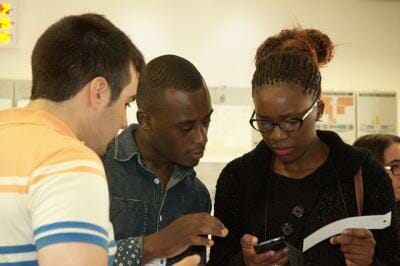
Jan 29, 2016 | Non categorizzato
 «I’m African and studying in Northern Italy. Some time ago I read an article in a magazine, in which the author said that a “dark night” is pervading every aspect of western culture, leading to a loss of the authentic Christian values. Sincerely, I did not understand what this meant, until something happened to open my eyes. It was a Saturday afternoon. Some kids, neighbours of mine, invited me to go out with them and spend an evening together. They wanted to do something different. There were six or seven of us and we started the evening dancing in a local disco. Initially I enjoyed it and they said music ran in my blood, and I danced well. But soon I noticed that the people around me were dancing without any respect for themselves or for the others. They were not dancing for pure enjoyment but were launching ambiguous messages. A small voice inside me told me to go against the current and dance with dignity and out of love. After a few hours, my friends suggested we go to another club. I trusted them since they were my friends, and so I accepted. In this other club it did not take long for me to realize where we had landed. The music was very loud, psychedelic lights pulsed to the rhythm, an acrid smell started to diffuse, and I was astonished. This was not a normal disco, and the girls prostituted themselves. I was disappointed and angry. Without saying a word, I turned on my heel and left. One of my friends came after me. He insulted me, saying I was slow in the head. I did not answer. After a few minutes, another one came, but this time he did not insult me, but said I was right. Lastly, another sneaked out of the club and also he said I was right. I was surprised. I had created a countercurrent chain. Without even speaking of the Christian ideals I believe in, or of God, the others had seen and understood. A few months passed and I had completely forgotten that episode. One day, a boy, who had been with us that evening, came to me saying he regretted it and would never again frequent that type of club. I was astonished. Evidently, Jesus was working on him. This experience has helped me to see in a more radical way, the need to risk and say “no” to certain proposals of the world, because it is our testimony that strikes people, even though we are unaware of it.» (Yves, Cameroon) From “Una buona notizia, gente che crede gente che muove”, Chiara Favotti, Ed. New City 2012
«I’m African and studying in Northern Italy. Some time ago I read an article in a magazine, in which the author said that a “dark night” is pervading every aspect of western culture, leading to a loss of the authentic Christian values. Sincerely, I did not understand what this meant, until something happened to open my eyes. It was a Saturday afternoon. Some kids, neighbours of mine, invited me to go out with them and spend an evening together. They wanted to do something different. There were six or seven of us and we started the evening dancing in a local disco. Initially I enjoyed it and they said music ran in my blood, and I danced well. But soon I noticed that the people around me were dancing without any respect for themselves or for the others. They were not dancing for pure enjoyment but were launching ambiguous messages. A small voice inside me told me to go against the current and dance with dignity and out of love. After a few hours, my friends suggested we go to another club. I trusted them since they were my friends, and so I accepted. In this other club it did not take long for me to realize where we had landed. The music was very loud, psychedelic lights pulsed to the rhythm, an acrid smell started to diffuse, and I was astonished. This was not a normal disco, and the girls prostituted themselves. I was disappointed and angry. Without saying a word, I turned on my heel and left. One of my friends came after me. He insulted me, saying I was slow in the head. I did not answer. After a few minutes, another one came, but this time he did not insult me, but said I was right. Lastly, another sneaked out of the club and also he said I was right. I was surprised. I had created a countercurrent chain. Without even speaking of the Christian ideals I believe in, or of God, the others had seen and understood. A few months passed and I had completely forgotten that episode. One day, a boy, who had been with us that evening, came to me saying he regretted it and would never again frequent that type of club. I was astonished. Evidently, Jesus was working on him. This experience has helped me to see in a more radical way, the need to risk and say “no” to certain proposals of the world, because it is our testimony that strikes people, even though we are unaware of it.» (Yves, Cameroon) From “Una buona notizia, gente che crede gente che muove”, Chiara Favotti, Ed. New City 2012
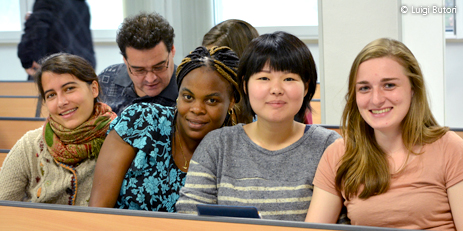
Jan 28, 2016 | Non categorizzato
 Sophia University Institute and the insertion of its graduates in the employment world: a more or less difficult relationship with respect to other academic programs? Eight years after the inauguration of the Sophia University Institute (SUI), the Italian professor of Social Research Methodology, performed a survey starting from these interrogatives. Some observations taken from the survey. The survey sample consisted in the first 80 SUI graduates, those who attended and concluded a two-year course with the achievement of a degree within the year 2014. In the first two months of 2015 this group was asked to respond to a semi-structured questionnaire, drafted to get some essential information on the professional pathways and lifestyles undertaken after their studies in Sophia. Out of a total of young graduates 61 gave their response (75% out of the total) coming from 30 different countries; their collaboration enabled to focus on the value their studies in Sophia played in their quest for a job. Above all the study programme concluded in the foreseen period of two years in 91% of the sample; 81% found a job within six months, and 96% within a year. Today 51% of the degree holders have a stable job, 26% have a temporary job; 62% of the cases have a full-time job, and 26% work part time, while for 13% have a second job. Most of the graduates (63%) are assigned roles of responsibility in companies, public administrations, universities and in other cultural, non-profit agencies: 28% are freelance professionals, entrepreneurs, consultants; 7% are top directors and managers, and 28% work in the field of scientific-cultural education and research. Effectiveness of the educational program, compared to the actual job placement seems to have been confirmed: more than two-thirds of the graduates (68%) think that the SUI programme offered is aligned with the job they now hold. This effectiveness is set in relation to some specific transverse skills the graduates retain to have achieved or strengthened during their studies in Sophia. They mention in particular the capacity to interact in a “plural” context under the cultural and disciplinary profile , and problem-solving skills through the integration of different perspectives and competences, and managing situation of conflict, working in synergy in with other social and cultural players, promoting innovative solutions. To note, lastly, that none of the graduates regretted having undertaken the chosen pathway: 72% would willing redo the course as is, while 28% would redo it and suggest some changes. Among these, they highlighted the lack of apprenticeship and internship available in the two-year programme, a priority targeted by the Institute’s competent Offices. “The analysis of the strong points is very interesting,” Licia Paglione commented, “above all studying at Sophia meant getting involved in a programme of discovery and maturation of one’s own relational identity, a pathway that includes and upholds intellectual resources and at the same time imbues the psychological, affective, spiritual and operational dimensions and urges each toward commitment.”
Sophia University Institute and the insertion of its graduates in the employment world: a more or less difficult relationship with respect to other academic programs? Eight years after the inauguration of the Sophia University Institute (SUI), the Italian professor of Social Research Methodology, performed a survey starting from these interrogatives. Some observations taken from the survey. The survey sample consisted in the first 80 SUI graduates, those who attended and concluded a two-year course with the achievement of a degree within the year 2014. In the first two months of 2015 this group was asked to respond to a semi-structured questionnaire, drafted to get some essential information on the professional pathways and lifestyles undertaken after their studies in Sophia. Out of a total of young graduates 61 gave their response (75% out of the total) coming from 30 different countries; their collaboration enabled to focus on the value their studies in Sophia played in their quest for a job. Above all the study programme concluded in the foreseen period of two years in 91% of the sample; 81% found a job within six months, and 96% within a year. Today 51% of the degree holders have a stable job, 26% have a temporary job; 62% of the cases have a full-time job, and 26% work part time, while for 13% have a second job. Most of the graduates (63%) are assigned roles of responsibility in companies, public administrations, universities and in other cultural, non-profit agencies: 28% are freelance professionals, entrepreneurs, consultants; 7% are top directors and managers, and 28% work in the field of scientific-cultural education and research. Effectiveness of the educational program, compared to the actual job placement seems to have been confirmed: more than two-thirds of the graduates (68%) think that the SUI programme offered is aligned with the job they now hold. This effectiveness is set in relation to some specific transverse skills the graduates retain to have achieved or strengthened during their studies in Sophia. They mention in particular the capacity to interact in a “plural” context under the cultural and disciplinary profile , and problem-solving skills through the integration of different perspectives and competences, and managing situation of conflict, working in synergy in with other social and cultural players, promoting innovative solutions. To note, lastly, that none of the graduates regretted having undertaken the chosen pathway: 72% would willing redo the course as is, while 28% would redo it and suggest some changes. Among these, they highlighted the lack of apprenticeship and internship available in the two-year programme, a priority targeted by the Institute’s competent Offices. “The analysis of the strong points is very interesting,” Licia Paglione commented, “above all studying at Sophia meant getting involved in a programme of discovery and maturation of one’s own relational identity, a pathway that includes and upholds intellectual resources and at the same time imbues the psychological, affective, spiritual and operational dimensions and urges each toward commitment.”
Jan 27, 2016 | Non categorizzato, Word of
[soundcloud url=”https://soundcloud.com/user-958772872/word-of-life-february-2016″ params=”color=ff5500&auto_play=false&hide_related&visual=false&show_comments=true&show_user=true&show_reposts=false” width=”100%” height=”166″ iframe=”true” /]
This Word of Life is an invitation to believe in God’s loving action even where his presence is not felt. It is a proclamation of hope and challenge that we too might we become instruments of consolation. Who hasn’t seen a crying child throw itself into its mother’s arms? Whatever the matter is, important or not, the mother dries its tears, covers it with tenderness and, bit by bit, it starts to smile again. Her presence and loving kindness are enough. God behaves like this with us, and compares himself to a mother. These words are how God speaks to his people on their return from exile in Babylon. They had seen their homes and the Temple demolished and had been deported to a foreign land where they felt lost and grief-stricken; now, returning to their homeland, the people had to rebuild from the rubble of destruction. The tragedy Israel had lived through is repeated by many war-torn peoples, victims of terrorist atrocities or inhuman exploitation. Houses and streets ripped apart, sites symbolic of a cultural identity razed to the ground, goods pillaged, places of worship destroyed. How many people kidnapped, millions forced to flee, thousands dying in deserts or at sea! It looks like an apocalypse. This Word of Life is an invitation to believe in God’s loving action also where his presence is not felt. It is a proclamation of hope. He is beside the one who suffers persecution, injustice, exile.
He is with us, with our family, with our people. He knows our personal pain and that of the whole human race. He became one of us, to the point of dying on a cross. This is why he knows how to understand us and comfort us. Just like a mother who takes her child onto her lap and comforts it. We need to open our eyes and hearts to ‘see him’. To the extent that we experience the tenderness of his love, we will be able to transmit it to those who live in pain and under trial, so that we become instruments of consolation. Paul, too, suggests it to the Corinthians: ‘console those who are in any affliction with the consolation with which we ourselves are consoled by God’ (2 Cor. 1:4).
This was also a deeply personal and specific experience of Chiara Lubich: ‘Lord, give me all who are lonely … I have felt in my heart the passion that fills your heart for all of the forsakenness in which the whole of the world is drifting. I love everyone who is sick and alone. Who consoles their weeping? Who mourns their slow death? Who presses to their own heart, the heart in despair? My God, let me be in this world the tangible sacrament of your love; let me be your arms that press to themselves and consume in love all the loneliness of the world.’ 1
Edited by Fabio Ciardi
This Word of Life was chosen by an ecumenical group in Germany. We are living it together with brothers and sisters from many different Churches. Our hope is that our lives throughout the year may be accompanied by the promise from God that it contains. 1 Chiara Lubich, Meditations (London : New City, 2005), 24
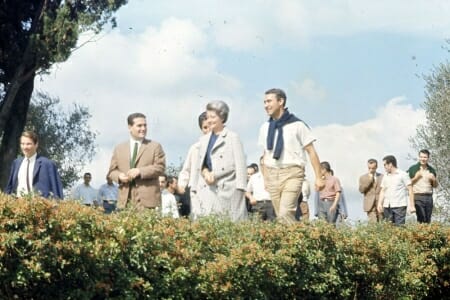
Jan 27, 2016 | Non categorizzato
Following the request put by the Focolare Movement on 7th December 2013 to the Rt Rev. Raffaello Martinelli, Bishop of Frascati, on 27th January last year Chiara Lubich’s cause of Beatification was opened. “Our only wish is to offer the Church and humankind the gift that Chiara was for us and for a vast number of people” said Maria Voce, President of the Focolare Movement on that occasion. “Receiving the charism God gave her … Chiara worked so that this pathway of Gospel life could be followed by many people. She always renewed her determination to help all those she met to put God in the first place in their lives and to “become saints together”. Her vision and her heart were motivated by a universal love which was able to embrace all people, going beyond all differences, and always directed towards fulfilling the testament of Jesus: “May they all be one”.
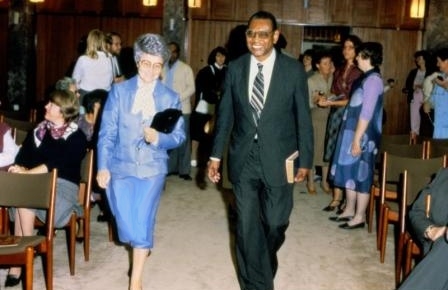
1982: Chiara Lubich with Philip Potter at the World Council of Churches (WCC)
 We too have a path. … For us it is God’s will to walk along a collective pathway to holiness. To do so we need to keep in mind two aspects of our spirituality which we cannot do without. We cannot become saints if the Risen Lord is not living in us and among us. We are in the midst of the world and whichever way we turn we find something that is in contradiction to Christ and his way of thinking. In the world there is an atmosphere of consumerism, hedonism, materialism and secularism everywhere. How can we bring the presence of God effectively and constantly into today’s society more and more? How can we avoid the world’s snares? How can we stick to the decisions we make in moments of grace? Our Lady has given us a great way of doing this in her Work. She has built up everywhere, in different ways, smaller or larger communities whose vocation it is to keep Jesus present in their midst. This means, therefore, not only overcoming personal problems by embracing Jesus Forsaken so that the Risen Lord can live in us, but it also means building unity with our brothers and sisters so that the Risen Lord can be in our midst. She knows that on our own, in a world like ours, it would be difficult to manage. For that reason she “invented” this spirituality which is called collective, precisely because it is lived by many people together …».
We too have a path. … For us it is God’s will to walk along a collective pathway to holiness. To do so we need to keep in mind two aspects of our spirituality which we cannot do without. We cannot become saints if the Risen Lord is not living in us and among us. We are in the midst of the world and whichever way we turn we find something that is in contradiction to Christ and his way of thinking. In the world there is an atmosphere of consumerism, hedonism, materialism and secularism everywhere. How can we bring the presence of God effectively and constantly into today’s society more and more? How can we avoid the world’s snares? How can we stick to the decisions we make in moments of grace? Our Lady has given us a great way of doing this in her Work. She has built up everywhere, in different ways, smaller or larger communities whose vocation it is to keep Jesus present in their midst. This means, therefore, not only overcoming personal problems by embracing Jesus Forsaken so that the Risen Lord can live in us, but it also means building unity with our brothers and sisters so that the Risen Lord can be in our midst. She knows that on our own, in a world like ours, it would be difficult to manage. For that reason she “invented” this spirituality which is called collective, precisely because it is lived by many people together …».
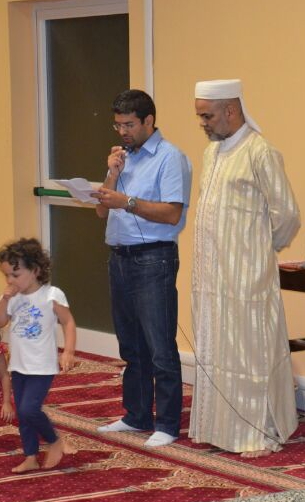
Jan 27, 2016 | Focolare Worldwide
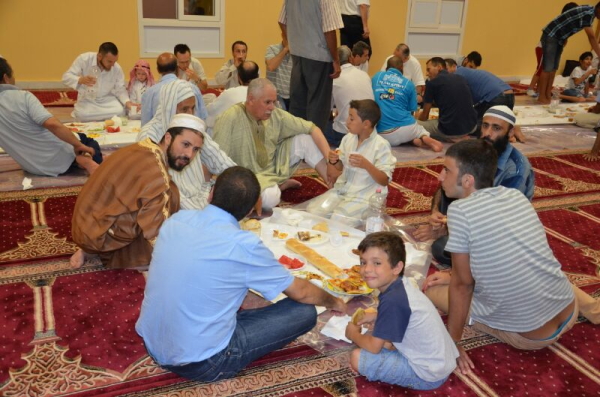 It all began in 2002, when the local community of the Focolare Movement met Mustapha Baztami, the Imam of the Muslim community of Teramo, truly a man of God who was so struck by the spirituality of unity that he has become its tireless promoter. Since then there have been many moments when both communities came together to share insights and reflections, such as how the Qur’an and the Bible view the family; they also gathered to share foods and flavours and seeing colours and fragrances blend into one, like the people who savoured them. But the real challenge has been to make a joint experience of friendship and solidarity as Muslims and Christians . One day Mustapha’s wife had a serious accident. The prolonged hospitalisation, also in other cities of Italy, gave the Focolare community the opportunity to stand at their side as brothers and sisters. It was like a contest of love between those who gave and those who received, and that became fertile ground for other initiatives, such as the creation of a literary competition called “Different but one”. For the past fifteen years they have made the weekly commitment to work side by side throughout the whole year. “Being children of God is what unites us. This is what gives you the freedom to share your story at the microphone, or to simply smile at a joke, or letting a few tears fall without feeling embarrassed,” states Donato of the Focolare. “You look at me without prejudices,” affirms a Muslim woman.
It all began in 2002, when the local community of the Focolare Movement met Mustapha Baztami, the Imam of the Muslim community of Teramo, truly a man of God who was so struck by the spirituality of unity that he has become its tireless promoter. Since then there have been many moments when both communities came together to share insights and reflections, such as how the Qur’an and the Bible view the family; they also gathered to share foods and flavours and seeing colours and fragrances blend into one, like the people who savoured them. But the real challenge has been to make a joint experience of friendship and solidarity as Muslims and Christians . One day Mustapha’s wife had a serious accident. The prolonged hospitalisation, also in other cities of Italy, gave the Focolare community the opportunity to stand at their side as brothers and sisters. It was like a contest of love between those who gave and those who received, and that became fertile ground for other initiatives, such as the creation of a literary competition called “Different but one”. For the past fifteen years they have made the weekly commitment to work side by side throughout the whole year. “Being children of God is what unites us. This is what gives you the freedom to share your story at the microphone, or to simply smile at a joke, or letting a few tears fall without feeling embarrassed,” states Donato of the Focolare. “You look at me without prejudices,” affirms a Muslim woman.  The effects of this dialogue haven’t gone unnoticed in the region. A Catholic association invited Mustapha and Donato to speak at an Islamic-Christian seminar. Things were going well, but the views of some participants regarding women in Islam created tensions in the hall. Mustapha and Donato interceded by saying that their friendship was based on a mutual desire to love which rises above culture and religion, seeking what unites rather than what might divide. “My life has changed dramatically,” says Mustapha, “since I met Chiara Lubich, a white and western Christian woman. She taught me to love everyone and to be the first to love.” From that moment on, the seminar took a different turn. One of the organizers went up to embrace him, saying, “Brother, I have realized that human reasoning is nothing compared to love.” Summer came and with it the desire to go on a family trip to the mountains together with the two communities. Upon arrival, the Muslim men unloaded flour, meat, vegetables, spices, pots and pans, while the women took their place in the kitchen in the nearby refectory. The Christians were no different: they took out homemade bread, stuffed olives and chicken dishes. As on any outing spent with friends, there were children’s games, chats, couscous, tea, long walks. Though totally unplanned, each moment was precious in consolidating a friendship that had gradually grown deeper. The next day, Mustapha sent a message saying, “… Let us ask God, the Most High, to continue illuminating our common pathways.” When the local bishop was asked to report to the prefecture on the relationship of his Catholic diocese with the Islamic community, he made reference to this experience of true dialogue.
The effects of this dialogue haven’t gone unnoticed in the region. A Catholic association invited Mustapha and Donato to speak at an Islamic-Christian seminar. Things were going well, but the views of some participants regarding women in Islam created tensions in the hall. Mustapha and Donato interceded by saying that their friendship was based on a mutual desire to love which rises above culture and religion, seeking what unites rather than what might divide. “My life has changed dramatically,” says Mustapha, “since I met Chiara Lubich, a white and western Christian woman. She taught me to love everyone and to be the first to love.” From that moment on, the seminar took a different turn. One of the organizers went up to embrace him, saying, “Brother, I have realized that human reasoning is nothing compared to love.” Summer came and with it the desire to go on a family trip to the mountains together with the two communities. Upon arrival, the Muslim men unloaded flour, meat, vegetables, spices, pots and pans, while the women took their place in the kitchen in the nearby refectory. The Christians were no different: they took out homemade bread, stuffed olives and chicken dishes. As on any outing spent with friends, there were children’s games, chats, couscous, tea, long walks. Though totally unplanned, each moment was precious in consolidating a friendship that had gradually grown deeper. The next day, Mustapha sent a message saying, “… Let us ask God, the Most High, to continue illuminating our common pathways.” When the local bishop was asked to report to the prefecture on the relationship of his Catholic diocese with the Islamic community, he made reference to this experience of true dialogue.
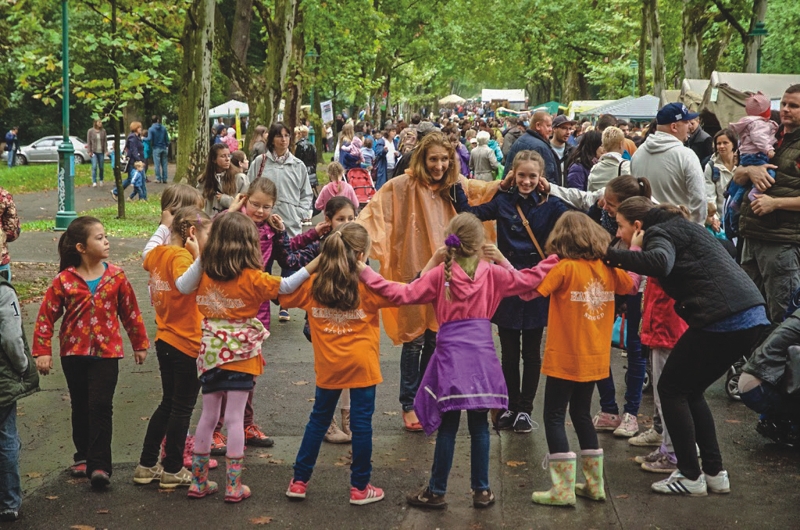
Jan 26, 2016 | Focolare Worldwide
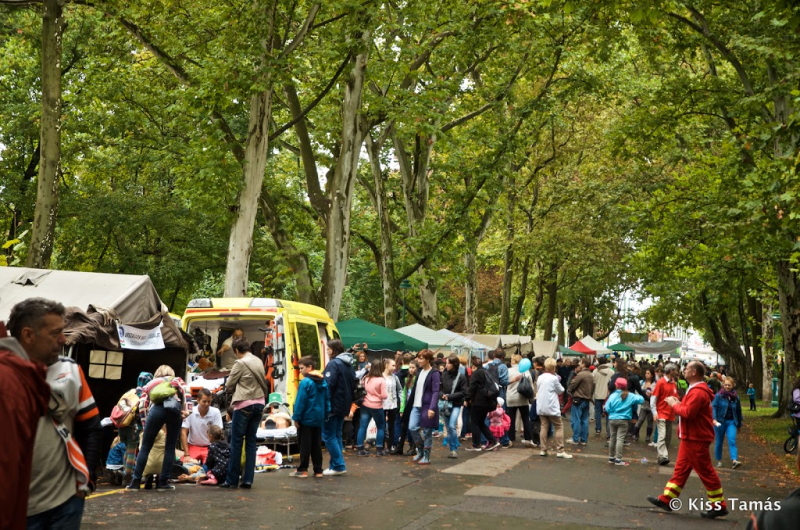 The festival took place in the park of Szeged, city in the south of Hungary and was “the biggest open-air, free of charge event of the year .” It was publicized at the Open Air Festival, in a press release, and distinguished itself for the great number of participants and performances. But what was the novelty of this event? «When, a few years ago they announced for the first time a possible Christian manifestation at city-level, no one thought that such an ambitious project could ever come about in our country, », wrote Új Város, the Focolare Magazine in Hungary. «It was not just the dream of a single person, but of the ecumenical group of pastors of that city. A dream which, a year and a half ago, started to take form, involving various religious, civil and political associations, » until it gave rise to the Festival held from 25 to 27 September. As Orsolya Szlaukó, an evangelical lady-pastor affirmed: «In Szeged, the ecumenical group of pastors that lance the idea of organising something that would announce Christianity. The logo and four colours and also the entire Festival drew inspiration from a Psalm: “the Lord led me out ” (Psalm, 18). We dreamt and thought of making a gift to the inhabitants of Szeged, by showing the unity of the Christian churches and the values of these communities. ». An organizer affirmed; «Our mission addresses the city and not only our communities», and another organizer, Sándor Tari added: «Our role was to ensure the good flow of the event, and not that of being in the limelight.» Another organizer added: «During the Festival each of us found the program which suited him best, from the youth to the elderly, » and the lady-pastor concluded: «We made room for concerts, round tables, playgrounds and stands of various organizations. ». «The 60 stands disseminated like huts along the park’s avenues, formed four city districts that showed the visitors the initiatives under way: an electrician held a workshop for kids, a healthcare stand which was visited by 700 people, with blood donation, and there were university professors who gave lessons. The parishes and the ecclesial communities held a great variety of creative initiatives.»
The festival took place in the park of Szeged, city in the south of Hungary and was “the biggest open-air, free of charge event of the year .” It was publicized at the Open Air Festival, in a press release, and distinguished itself for the great number of participants and performances. But what was the novelty of this event? «When, a few years ago they announced for the first time a possible Christian manifestation at city-level, no one thought that such an ambitious project could ever come about in our country, », wrote Új Város, the Focolare Magazine in Hungary. «It was not just the dream of a single person, but of the ecumenical group of pastors of that city. A dream which, a year and a half ago, started to take form, involving various religious, civil and political associations, » until it gave rise to the Festival held from 25 to 27 September. As Orsolya Szlaukó, an evangelical lady-pastor affirmed: «In Szeged, the ecumenical group of pastors that lance the idea of organising something that would announce Christianity. The logo and four colours and also the entire Festival drew inspiration from a Psalm: “the Lord led me out ” (Psalm, 18). We dreamt and thought of making a gift to the inhabitants of Szeged, by showing the unity of the Christian churches and the values of these communities. ». An organizer affirmed; «Our mission addresses the city and not only our communities», and another organizer, Sándor Tari added: «Our role was to ensure the good flow of the event, and not that of being in the limelight.» Another organizer added: «During the Festival each of us found the program which suited him best, from the youth to the elderly, » and the lady-pastor concluded: «We made room for concerts, round tables, playgrounds and stands of various organizations. ». «The 60 stands disseminated like huts along the park’s avenues, formed four city districts that showed the visitors the initiatives under way: an electrician held a workshop for kids, a healthcare stand which was visited by 700 people, with blood donation, and there were university professors who gave lessons. The parishes and the ecclesial communities held a great variety of creative initiatives.»  Sándor Tari worked for a whole year on the setup of the stands area. «The aim was to represent every sector of the city: from the farmers, labourers, culture, healthcare… The condition set for the exhibition stands was to be open to friendship with the organisers and among themselves. Also the Police and Fire-fighters participated.» Sándor recounted that among the projects was to continue and probably hold another similar event in two years time. «I really liked the family atmosphere with many parents and children, » the father of a family said. But also the youth had a range of choices between the various bands that performed on stage, among which Gen Verde, Hillsong and Hungarian music groups. «Here there is an atmosphere we do not see every day, and listening to them one can feel peace in the bottom of our hearts », a young man said. The evangelical bishop Péter Gáncs, in an interview with the Duna TV Channel explained why he believed it was important for him to participate : «From the start, I liked the title of the Festival, Open Space. At times I have the impression that the churches are afraid to go all out. 25 years after the change of regime, we see that people still do not willingly go to church. So we are the ones who have to go out. That’s why I really appreciated this ecumenical get-together to go out into the square, into the streets. ». Source: Új Város n.1/2016
Sándor Tari worked for a whole year on the setup of the stands area. «The aim was to represent every sector of the city: from the farmers, labourers, culture, healthcare… The condition set for the exhibition stands was to be open to friendship with the organisers and among themselves. Also the Police and Fire-fighters participated.» Sándor recounted that among the projects was to continue and probably hold another similar event in two years time. «I really liked the family atmosphere with many parents and children, » the father of a family said. But also the youth had a range of choices between the various bands that performed on stage, among which Gen Verde, Hillsong and Hungarian music groups. «Here there is an atmosphere we do not see every day, and listening to them one can feel peace in the bottom of our hearts », a young man said. The evangelical bishop Péter Gáncs, in an interview with the Duna TV Channel explained why he believed it was important for him to participate : «From the start, I liked the title of the Festival, Open Space. At times I have the impression that the churches are afraid to go all out. 25 years after the change of regime, we see that people still do not willingly go to church. So we are the ones who have to go out. That’s why I really appreciated this ecumenical get-together to go out into the square, into the streets. ». Source: Új Város n.1/2016
![Unity, the leaven of society]()
Jan 25, 2016 | Focolare Worldwide, Senza categoria
 “I teach in a Catholic school in my city, Salta, in northern Argentina,” says Gabriela Carral. “In early October of 2015, I met Misael, a 10 year old student, following a prayer service held by Orthodox and Catholics for peace in Syria. At that particular time, the image of the lifeless body of the little Syrian boy, Aylan, had made the headlines globally through the mass media. Misael told me he wanted to do something for peace in our school, adding that what hurt him most of all was knowing that so many children were orphaned by the war. We arranged to meet at recreation time. He explained that he was part of the Orthodox community, and that he was convinced that we should pray for peace: Catholics and Orthodox together. A few days later, he showed me a flyer that he had in his folder. The text read: “Syria is us. Let us for peace.” I was surprised to see that a child, in the midst of almost 800 pupils in elementary and secondary schools, could be so sensitive to the pain of people suffering thousands of kilometers away. I liked his idea and I encouraged him to share it with the school principal and staff. The outcome was a plan to organise an ecumenical prayer for peace. For the first time the word ecumenism resounded in the halls of this school, among the leaders, teachers and students.
“I teach in a Catholic school in my city, Salta, in northern Argentina,” says Gabriela Carral. “In early October of 2015, I met Misael, a 10 year old student, following a prayer service held by Orthodox and Catholics for peace in Syria. At that particular time, the image of the lifeless body of the little Syrian boy, Aylan, had made the headlines globally through the mass media. Misael told me he wanted to do something for peace in our school, adding that what hurt him most of all was knowing that so many children were orphaned by the war. We arranged to meet at recreation time. He explained that he was part of the Orthodox community, and that he was convinced that we should pray for peace: Catholics and Orthodox together. A few days later, he showed me a flyer that he had in his folder. The text read: “Syria is us. Let us for peace.” I was surprised to see that a child, in the midst of almost 800 pupils in elementary and secondary schools, could be so sensitive to the pain of people suffering thousands of kilometers away. I liked his idea and I encouraged him to share it with the school principal and staff. The outcome was a plan to organise an ecumenical prayer for peace. For the first time the word ecumenism resounded in the halls of this school, among the leaders, teachers and students. 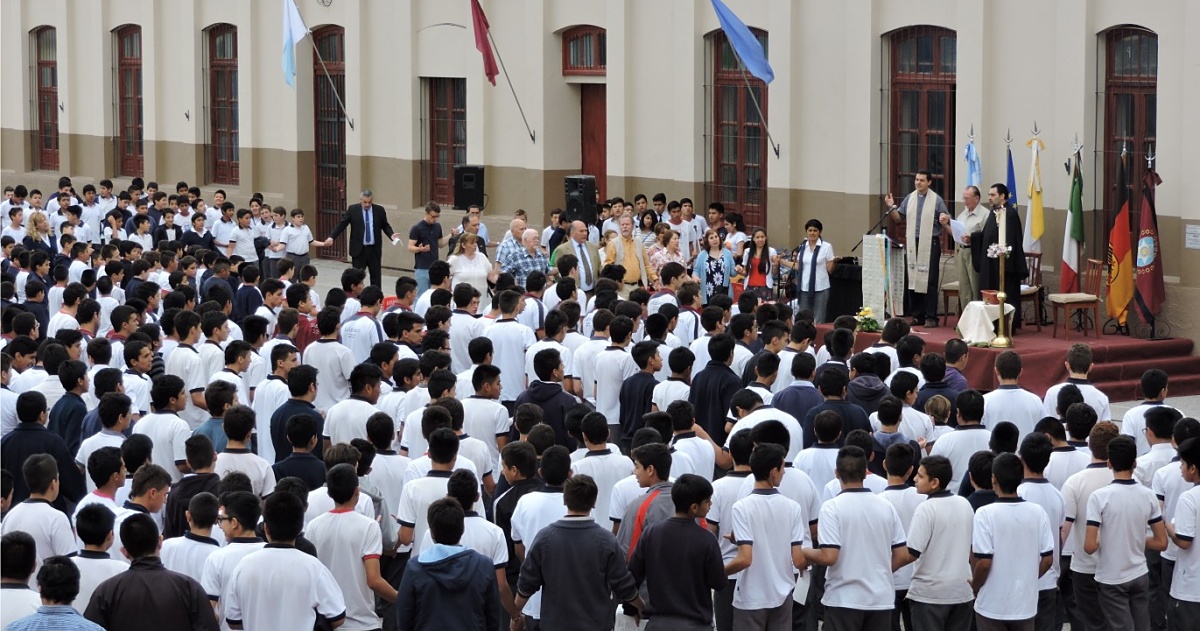 In order to put this plan into action, I contacted a religious order priest who shares my goal in trying to live the prayer of Jesus: “That all may be one”. Fr Adolfo, from the Orthodox Church of Antioch, also got involved, and together we organized every detail of the celebration. Subsequently the Lutheran Church asked to join us since our school community includes a young Lutheran volunteer from Germany. Others then showed interest in the event, such as the president of the local Syrian-Lebanese community, the German consul and the vice-consul of Italy, a representative from the Ministry of Education, newspaper journalists and the heads of other schools. The first step of Misael’s project was that of trying to build peace in our everyday relationships, and this gave rise to many new experiences lived among the children to which we also proposed the Time Out prayer for peace promoted by Youth for a United World. Through the homilies given by the celebrants, we shared in the life of Christians in Syria and Africa; the intentions for peace were read out by a young Orthodox girl while a woman recited the Lord’s Prayer in Arabic. The flags of the different countries which were hoisted up warmed our hearts and made us feel like members of the one human family. In short, it was a celebration that enabled each of one us to experience something that we had not experienced so strongly beforehand: profound friendships and unimaginable bonds. The school principle and staff of the school called it a historic day. “We thank God for our freedom,” concluded the young people present, “and we promise not to ever take sides but to stand on the side of peace.” Gustavo Clariá
In order to put this plan into action, I contacted a religious order priest who shares my goal in trying to live the prayer of Jesus: “That all may be one”. Fr Adolfo, from the Orthodox Church of Antioch, also got involved, and together we organized every detail of the celebration. Subsequently the Lutheran Church asked to join us since our school community includes a young Lutheran volunteer from Germany. Others then showed interest in the event, such as the president of the local Syrian-Lebanese community, the German consul and the vice-consul of Italy, a representative from the Ministry of Education, newspaper journalists and the heads of other schools. The first step of Misael’s project was that of trying to build peace in our everyday relationships, and this gave rise to many new experiences lived among the children to which we also proposed the Time Out prayer for peace promoted by Youth for a United World. Through the homilies given by the celebrants, we shared in the life of Christians in Syria and Africa; the intentions for peace were read out by a young Orthodox girl while a woman recited the Lord’s Prayer in Arabic. The flags of the different countries which were hoisted up warmed our hearts and made us feel like members of the one human family. In short, it was a celebration that enabled each of one us to experience something that we had not experienced so strongly beforehand: profound friendships and unimaginable bonds. The school principle and staff of the school called it a historic day. “We thank God for our freedom,” concluded the young people present, “and we promise not to ever take sides but to stand on the side of peace.” Gustavo Clariá
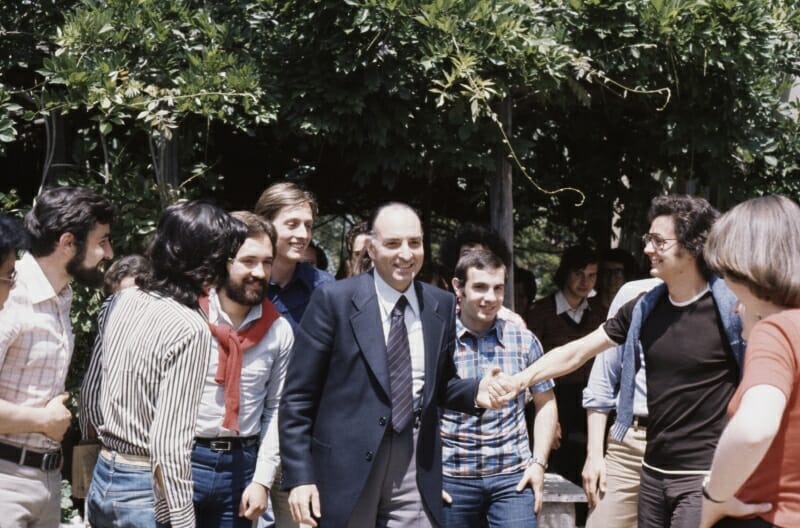
Jan 24, 2016 | Non categorizzato
 “Among Christians there is an experience that is similar to married life. Inevitably difficulties between the couple arise. Only if there is love these difficulties serve to maintain love and enable unity to grow among them. When love is absent, problems become an insurmountable obstacle and they are given as an excuse in the event of a separation. But in reality it is not the problems that have destroyed the family, but the lack of love. So it is between the Churches. The division happened not only because of religious or theological differences, but also – and at times foremost – because of political, economic or cultural motives. In the measure that love grows, disunity becomes unbearable and problems are overcome. I think that one day the various Churches, without abandoning their own traditions and legitimate expressions that have developed throughout history, can participate together, when God wills, in a Council that will unite them and which will ensure that the Church, while being one, retains many of these expressions. The time is perhaps premature, but in a single day God can make us live a thousand years. It will be an event which will have a profound impact on all members of the great religions.” From “COLLOQUI” – Pasquale Foresi – Città Nuova 2009 – pp. 155-156-161
“Among Christians there is an experience that is similar to married life. Inevitably difficulties between the couple arise. Only if there is love these difficulties serve to maintain love and enable unity to grow among them. When love is absent, problems become an insurmountable obstacle and they are given as an excuse in the event of a separation. But in reality it is not the problems that have destroyed the family, but the lack of love. So it is between the Churches. The division happened not only because of religious or theological differences, but also – and at times foremost – because of political, economic or cultural motives. In the measure that love grows, disunity becomes unbearable and problems are overcome. I think that one day the various Churches, without abandoning their own traditions and legitimate expressions that have developed throughout history, can participate together, when God wills, in a Council that will unite them and which will ensure that the Church, while being one, retains many of these expressions. The time is perhaps premature, but in a single day God can make us live a thousand years. It will be an event which will have a profound impact on all members of the great religions.” From “COLLOQUI” – Pasquale Foresi – Città Nuova 2009 – pp. 155-156-161
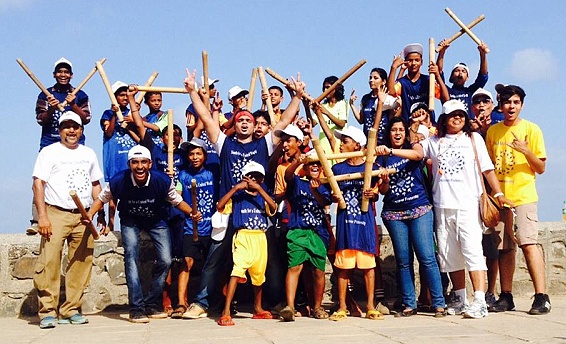
Jan 23, 2016 | Focolare Worldwide
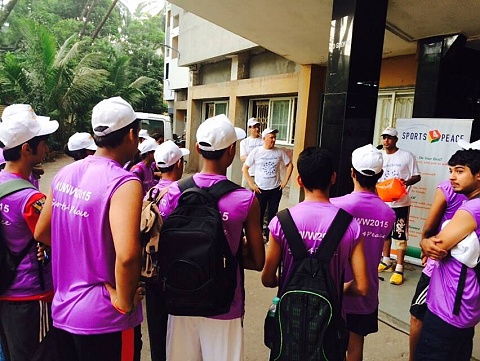 “Sport can really change the world and make it more united”. Patsy Furtado, a hockey coach from Mumbai who once played for the Indian national hockey team, speaks with the strong conviction that comes from an equally strong experience lived with street children in this immense metropolis. She had met the Focolare and the idea of Sportmeet through a Run4unity event in 2005. Her passion for sports and the experience of unity lived that day fuelled her desire to join forces with other like-minded coaches and bring about change in the surrounding area, where children often can be seen living on the streets. She had just got to know a home for destitute children with 240 children, neglected by society. She got the idea to start coaching them in different sports: football, basketball, hockey, athletics … Every morning at 6.30am they started having a one hour training session. Initially there were 20 girls and 30 boys who came for training without shoes and proper sports gear. Today there are a number of teams, all having proper sport shoes, gear and kit bag. In 2007 they entered the inter-school competition at the all Mumbai level and the under-12 football team stood eighth in Mumbai among over 300 schools. This achievement made it to the Hindustan Times, one of Mumbai’s major newspapers, with the heading “United We Stand”. Listing the numerous achievements of this project, Patsy points to the fact that the children’s behaviour improved tremendously: sports taught them to be disciplined and after playing sports all their energy is used in the right way. Whereas it would be natural to be violent and aggressive with a background like theirs, they become confident and have self respect, they look after their hygiene and take responsibilities. Coming from various religions the children come together to play as a team and there are no differences among them.
“Sport can really change the world and make it more united”. Patsy Furtado, a hockey coach from Mumbai who once played for the Indian national hockey team, speaks with the strong conviction that comes from an equally strong experience lived with street children in this immense metropolis. She had met the Focolare and the idea of Sportmeet through a Run4unity event in 2005. Her passion for sports and the experience of unity lived that day fuelled her desire to join forces with other like-minded coaches and bring about change in the surrounding area, where children often can be seen living on the streets. She had just got to know a home for destitute children with 240 children, neglected by society. She got the idea to start coaching them in different sports: football, basketball, hockey, athletics … Every morning at 6.30am they started having a one hour training session. Initially there were 20 girls and 30 boys who came for training without shoes and proper sports gear. Today there are a number of teams, all having proper sport shoes, gear and kit bag. In 2007 they entered the inter-school competition at the all Mumbai level and the under-12 football team stood eighth in Mumbai among over 300 schools. This achievement made it to the Hindustan Times, one of Mumbai’s major newspapers, with the heading “United We Stand”. Listing the numerous achievements of this project, Patsy points to the fact that the children’s behaviour improved tremendously: sports taught them to be disciplined and after playing sports all their energy is used in the right way. Whereas it would be natural to be violent and aggressive with a background like theirs, they become confident and have self respect, they look after their hygiene and take responsibilities. Coming from various religions the children come together to play as a team and there are no differences among them.  In 2009 the first Sports4Peace workshop was held in Mumbai. Promoting a cube with 6 rules to educate for Peace through sports, the idea of Sports4Peace captured the imagination of various coaches and others engaged in the field of sports in Mumbai and other cities in India. “Play well”, “Hang in there”, “Look out for others”: simple rules which have touched the lives and inspired several youth and sport enthusiasts to apply them with passion in their various disciplines. The idea of Sports4Peace became part of various interreligious cultural college activities as well as diocesan events in Mumbai and in Pune, a neighbouring city known for its numerous colleges. Presented in various Run4Unity editions also in Delhi, it was promoted in the recent United World Week hosted in Mumbai in May 2015, when a permanent Sports4Peace cube was installed in a prominent place in a public garden on Mumbai’s popular Bandstand promenade to remind all that sports, lived and played well, can promote peace and universal brotherhood. Gustavo Clariá
In 2009 the first Sports4Peace workshop was held in Mumbai. Promoting a cube with 6 rules to educate for Peace through sports, the idea of Sports4Peace captured the imagination of various coaches and others engaged in the field of sports in Mumbai and other cities in India. “Play well”, “Hang in there”, “Look out for others”: simple rules which have touched the lives and inspired several youth and sport enthusiasts to apply them with passion in their various disciplines. The idea of Sports4Peace became part of various interreligious cultural college activities as well as diocesan events in Mumbai and in Pune, a neighbouring city known for its numerous colleges. Presented in various Run4Unity editions also in Delhi, it was promoted in the recent United World Week hosted in Mumbai in May 2015, when a permanent Sports4Peace cube was installed in a prominent place in a public garden on Mumbai’s popular Bandstand promenade to remind all that sports, lived and played well, can promote peace and universal brotherhood. Gustavo Clariá
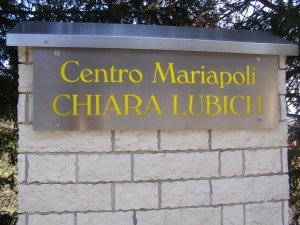
Jan 23, 2016 | Focolare Worldwide
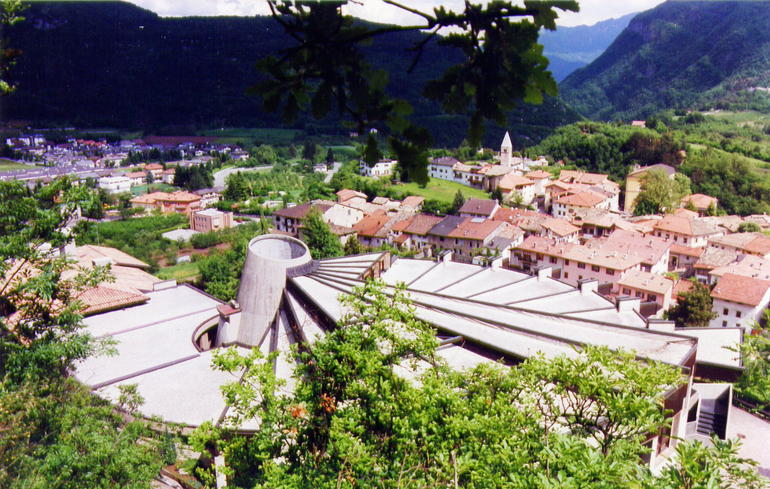 “This the house built on the rocks, (Word of Life) will remind us of the one Jesus spoke about. Winds and storms may blow but it will not collapse,” Chiara Lubich said on 24 May 1986 at the inauguration of the Mariapolis Centre of her birthplace. 23 January 2016: it will be a feast day at the Centre which is today dedicated to her, in memory of 30 years of history, testimonials, dialogue and communion in the light of the charisma of unity. The event will open with the message of Maria Voce and a video that traces almost 30 years of history. Then there will be some testimonials of the local members of the Movement in the civil and ecclesial fields, and the greetings of the Archbishop of Trent, Bishop Luigi Bressan, and the Mayor, Alessandro Andreatta, and other authorities. After 30 years, the Centre of Cadine has been faithful to its own vocation: to be a place of encounter and formation for those who wish to commit their lives to irradiating the life of the Gospel and bringing back through mutual love, the presence of God in the world. Flashback to the past. In the 1970s the Focolare Movement, diffused throughout the region, felt the need for a formation centre. After various futile searches, efforts were focused on Trent. When she was told about this, Chiara responded: “I had always thought of it as a city chosen by God.” A few months later the entire Movement was living the Word of Life: “Sell all you have, and give it to the poor.” The desire to put this Word of the Gospel into practice pushed Nostra Fadanelli, a follower of the Movement, to donate nine hectares of a wood for the construction of the Mariapolis Centre. The design was entrusted to Carlo Fumagalli, a focolarino architect who, with the awareness of having to build a Centre in the city where the Movement was born, traced the stages of her history in Trent and in the Primiero Valley, reproducing some details in the building’s architecture. The project was presented to the Archbishop at that time, Bishop Gottardi who said: “This has to be a ”monument” to Chiara Lubich, of course, when she will be in Paradise. And it will be the best monument if, with regard to the history of Trent, it will be… a Mariapolis with an “ecumenical flair,” and link up to the ecumenical mandate of the City of Trent, expressed by Pope Paul VI in 1964. And he concluded: “You have this mission!” From that moment on, the generosity of each member of the Movement started circulating, each with his own possibilities and the fantasy of those who build their “own” house. In October 1980, while the bureaucratic procedures were underway, news arrived that they were looking for a house for the International Mariapolis Centre. So they all decided to donate the funds collected up to then: a big sum which surprised Chiara herself. It seemed to be a crazy idea, but upon acquiring the permits to build, a new and substantial sum arrived, three times what they had given, which made them experience the promises of the Gospel: “Give and you shall be given.” So in 1982, the day section of the building of the centre started: the foyer, meeting halls, kitchen and dining room. Everyone wanted to help, giving their time and forces, and in the last year of the works, about 800 people alternated with the artisanal works, finishing and workforce. A memorable day was when the road and square were paved with porphyry, which was finished the day before the inauguration. On 24 May 1986, before about 2,000 people, among whom were representatives of the most important churches in Europe, Chiara herself inaugurated the Mariapolis Centre, underlining its ecumenical and formative vocation, and called the centre, “Word of Life.”
“This the house built on the rocks, (Word of Life) will remind us of the one Jesus spoke about. Winds and storms may blow but it will not collapse,” Chiara Lubich said on 24 May 1986 at the inauguration of the Mariapolis Centre of her birthplace. 23 January 2016: it will be a feast day at the Centre which is today dedicated to her, in memory of 30 years of history, testimonials, dialogue and communion in the light of the charisma of unity. The event will open with the message of Maria Voce and a video that traces almost 30 years of history. Then there will be some testimonials of the local members of the Movement in the civil and ecclesial fields, and the greetings of the Archbishop of Trent, Bishop Luigi Bressan, and the Mayor, Alessandro Andreatta, and other authorities. After 30 years, the Centre of Cadine has been faithful to its own vocation: to be a place of encounter and formation for those who wish to commit their lives to irradiating the life of the Gospel and bringing back through mutual love, the presence of God in the world. Flashback to the past. In the 1970s the Focolare Movement, diffused throughout the region, felt the need for a formation centre. After various futile searches, efforts were focused on Trent. When she was told about this, Chiara responded: “I had always thought of it as a city chosen by God.” A few months later the entire Movement was living the Word of Life: “Sell all you have, and give it to the poor.” The desire to put this Word of the Gospel into practice pushed Nostra Fadanelli, a follower of the Movement, to donate nine hectares of a wood for the construction of the Mariapolis Centre. The design was entrusted to Carlo Fumagalli, a focolarino architect who, with the awareness of having to build a Centre in the city where the Movement was born, traced the stages of her history in Trent and in the Primiero Valley, reproducing some details in the building’s architecture. The project was presented to the Archbishop at that time, Bishop Gottardi who said: “This has to be a ”monument” to Chiara Lubich, of course, when she will be in Paradise. And it will be the best monument if, with regard to the history of Trent, it will be… a Mariapolis with an “ecumenical flair,” and link up to the ecumenical mandate of the City of Trent, expressed by Pope Paul VI in 1964. And he concluded: “You have this mission!” From that moment on, the generosity of each member of the Movement started circulating, each with his own possibilities and the fantasy of those who build their “own” house. In October 1980, while the bureaucratic procedures were underway, news arrived that they were looking for a house for the International Mariapolis Centre. So they all decided to donate the funds collected up to then: a big sum which surprised Chiara herself. It seemed to be a crazy idea, but upon acquiring the permits to build, a new and substantial sum arrived, three times what they had given, which made them experience the promises of the Gospel: “Give and you shall be given.” So in 1982, the day section of the building of the centre started: the foyer, meeting halls, kitchen and dining room. Everyone wanted to help, giving their time and forces, and in the last year of the works, about 800 people alternated with the artisanal works, finishing and workforce. A memorable day was when the road and square were paved with porphyry, which was finished the day before the inauguration. On 24 May 1986, before about 2,000 people, among whom were representatives of the most important churches in Europe, Chiara herself inaugurated the Mariapolis Centre, underlining its ecumenical and formative vocation, and called the centre, “Word of Life.”  After Chiara’s death in 2008, on 24 January 2009, with a highly ecumenical ceremony in the presence of Maria Voce who succeeded Chiara as President of the Focolare Movement, and many other civil and religious celebrities, the Centre was dedicated to Chiara Lubich. In these 30 years, tens of thousands of people have been guests of the Centre, mostly members of the Movement but not only them, given that it has also opened its doors to other meetings promoted by the Diocese, Catholic Movements and other lay associations of the territory. The Centre hosts in particular, conventions, formation schools, and various groups of the Movement from all over the world, who come to retrace in Trent and the Primiero Valley, the early days of the movement, when all was just beginning. The Centre bears witness to the dawn of the Movement, and the urgency to keep a “dialogue platform” active among individuals and peoples, and between the churches and great religions, to refocus and give room to fraternity.
After Chiara’s death in 2008, on 24 January 2009, with a highly ecumenical ceremony in the presence of Maria Voce who succeeded Chiara as President of the Focolare Movement, and many other civil and religious celebrities, the Centre was dedicated to Chiara Lubich. In these 30 years, tens of thousands of people have been guests of the Centre, mostly members of the Movement but not only them, given that it has also opened its doors to other meetings promoted by the Diocese, Catholic Movements and other lay associations of the territory. The Centre hosts in particular, conventions, formation schools, and various groups of the Movement from all over the world, who come to retrace in Trent and the Primiero Valley, the early days of the movement, when all was just beginning. The Centre bears witness to the dawn of the Movement, and the urgency to keep a “dialogue platform” active among individuals and peoples, and between the churches and great religions, to refocus and give room to fraternity.
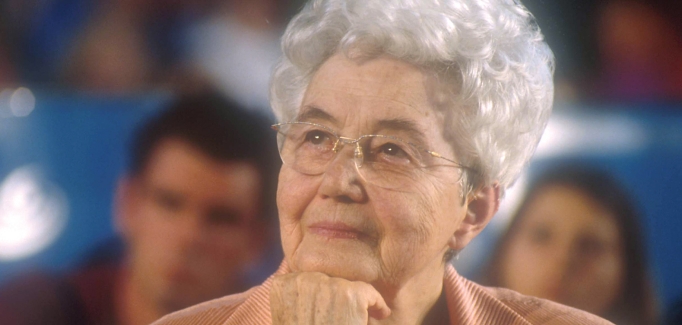
Jan 22, 2016 | Senza categoria
 “With brothers and sisters of the various Churches, by striving to live the Gospel together, getting to know one another and strengthening our reciprocal love, we discovered the great wealth of our common patrimony: Baptism, the Old and New Testaments, the dogmas of the first Councils which we share, the Creed (Nicene-Constantinopolitan), the Greek and Latin Fathers, the martyrs and other treasures, like the life of grace, faith, hope, charity, and the many other interior gifts of the Holy Spirit. And besides all this, we are united by the spirituality of unity. At first we lived as if all this were not really true or we were not fully aware of it. Instead now we realize that these are the conditions for being able to achieve a particular dialogue: the dialogue of life. This spirituality makes us feel that we are already one family; we feel that we form among ourselves “a Christian people” which involves not only laity but also to priests, pastors, bishops, and so on. Obviously, the full and visible communion among our Churches still needs to be achieved, but we can already be so. It is not a grassroots dialogue that opposes or juxtaposes the high level dialogue or that of the Church leaders, but it is a dialogue in which all Christians can participate. This people is like a leaven in the ecumenical Movement which rekindles in everyone the sense that, as baptized Christians who can love one another, we can all contribute towards fulfilling the Testament of Jesus. Indeed, we hope that other forms of dialogue, like the dialogue of charity, of shared service, of prayer and the theological dialogue, can be enhanced by the “dialogue of life”.” Extract from the book: Chiara Lubich: “Unity”, New City Press, New York (USA)
“With brothers and sisters of the various Churches, by striving to live the Gospel together, getting to know one another and strengthening our reciprocal love, we discovered the great wealth of our common patrimony: Baptism, the Old and New Testaments, the dogmas of the first Councils which we share, the Creed (Nicene-Constantinopolitan), the Greek and Latin Fathers, the martyrs and other treasures, like the life of grace, faith, hope, charity, and the many other interior gifts of the Holy Spirit. And besides all this, we are united by the spirituality of unity. At first we lived as if all this were not really true or we were not fully aware of it. Instead now we realize that these are the conditions for being able to achieve a particular dialogue: the dialogue of life. This spirituality makes us feel that we are already one family; we feel that we form among ourselves “a Christian people” which involves not only laity but also to priests, pastors, bishops, and so on. Obviously, the full and visible communion among our Churches still needs to be achieved, but we can already be so. It is not a grassroots dialogue that opposes or juxtaposes the high level dialogue or that of the Church leaders, but it is a dialogue in which all Christians can participate. This people is like a leaven in the ecumenical Movement which rekindles in everyone the sense that, as baptized Christians who can love one another, we can all contribute towards fulfilling the Testament of Jesus. Indeed, we hope that other forms of dialogue, like the dialogue of charity, of shared service, of prayer and the theological dialogue, can be enhanced by the “dialogue of life”.” Extract from the book: Chiara Lubich: “Unity”, New City Press, New York (USA)
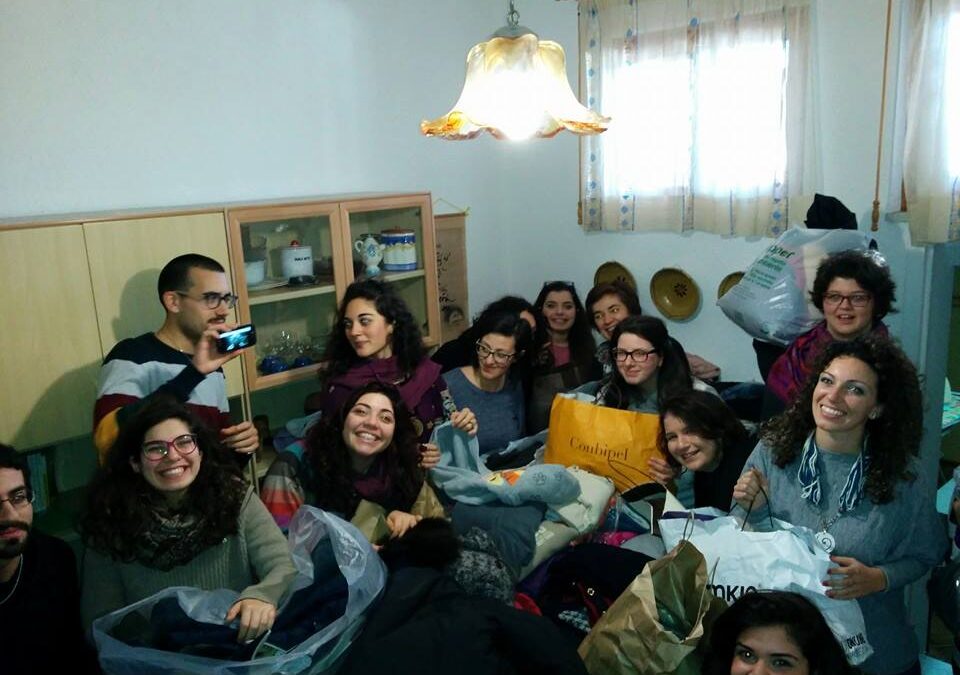
Jan 21, 2016 | Non categorizzato
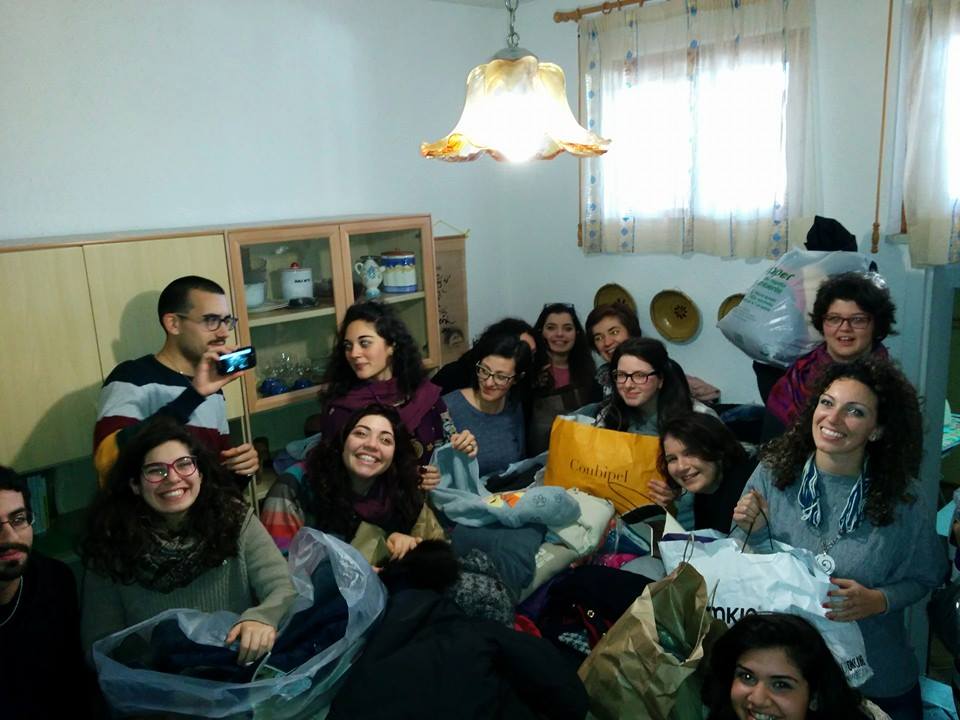 “One of our Focolare contacts living on the border with Syria, has made us aware of the critical situation they’re currently undergoing. With the onset of Winter in Syria there is urgent need for heating and appropriate clothing to withstand the low temperatures. The people there are unable to buy these types of clothes because of economic difficulties but also because of the embargo on importation of these types of items. Speaking about this in our group, we understood that we needed to immediately do something to help these brothers and sisters of ours. Through a Facebook page which keeps all the young people of the Focolare in Italy connected, we launched this appeal which is being spread via the hashtag #riscaldiamolasiria. The most immediate solution to meet their needs was to ship a package with appropriate clothing. The action started with all of us going through our wardrobes and organising collection points throughout Italy to collect the items. The generosity was overwhelming! With the help also of other members of the Focolare Movement in different local communities, many parcels were dispatched within a few days and are already reaching Syria. At first our enthusiasm was somewhat dampened because of the high shipping costs, but through our communications network across Italy in real time, we were able to find the most secure transport with the cheapest rates. The help that we’re giving will not stop here; we will continue to support them in a practical way with every means at our disposal! For now we’re sending the items to those in need in Syria, and any items left over will be given to those most in need in our city.” Maria Chiara De Lorenzo
“One of our Focolare contacts living on the border with Syria, has made us aware of the critical situation they’re currently undergoing. With the onset of Winter in Syria there is urgent need for heating and appropriate clothing to withstand the low temperatures. The people there are unable to buy these types of clothes because of economic difficulties but also because of the embargo on importation of these types of items. Speaking about this in our group, we understood that we needed to immediately do something to help these brothers and sisters of ours. Through a Facebook page which keeps all the young people of the Focolare in Italy connected, we launched this appeal which is being spread via the hashtag #riscaldiamolasiria. The most immediate solution to meet their needs was to ship a package with appropriate clothing. The action started with all of us going through our wardrobes and organising collection points throughout Italy to collect the items. The generosity was overwhelming! With the help also of other members of the Focolare Movement in different local communities, many parcels were dispatched within a few days and are already reaching Syria. At first our enthusiasm was somewhat dampened because of the high shipping costs, but through our communications network across Italy in real time, we were able to find the most secure transport with the cheapest rates. The help that we’re giving will not stop here; we will continue to support them in a practical way with every means at our disposal! For now we’re sending the items to those in need in Syria, and any items left over will be given to those most in need in our city.” Maria Chiara De Lorenzo
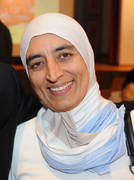
Jan 20, 2016 | Non categorizzato
 The reasons for the award is in recognition for the work of the physician, Dr Noorjehan Abdul Majid, and the work of the Sant’Egidio community, in the fight against AIDS. Dr Abdul Majid’s ability as a Muslim woman to build exceptional bridges between Christians and Muslims, demonstrate that through the promotion of a peaceful co-existence it’s possible for there to be effective collaboration between Christians and Muslims. Among those who will be present at the ceremony are Annette Schavan, the German ambassador to the Holy See, who will deliver the oration. The award is in memory of the person and spiritual heritage of Catholic bishop of Aachen, Klaus Hemmerle (1929 – 1994). The Focolare Movement gives these awards to outstanding “bridge builders” of dialogue between churches, religions and visions of the world. The prize is awarded every two years. See also: www.fokolar-bewegung.de Sant’Egidio’s DREAM public health project
The reasons for the award is in recognition for the work of the physician, Dr Noorjehan Abdul Majid, and the work of the Sant’Egidio community, in the fight against AIDS. Dr Abdul Majid’s ability as a Muslim woman to build exceptional bridges between Christians and Muslims, demonstrate that through the promotion of a peaceful co-existence it’s possible for there to be effective collaboration between Christians and Muslims. Among those who will be present at the ceremony are Annette Schavan, the German ambassador to the Holy See, who will deliver the oration. The award is in memory of the person and spiritual heritage of Catholic bishop of Aachen, Klaus Hemmerle (1929 – 1994). The Focolare Movement gives these awards to outstanding “bridge builders” of dialogue between churches, religions and visions of the world. The prize is awarded every two years. See also: www.fokolar-bewegung.de Sant’Egidio’s DREAM public health project
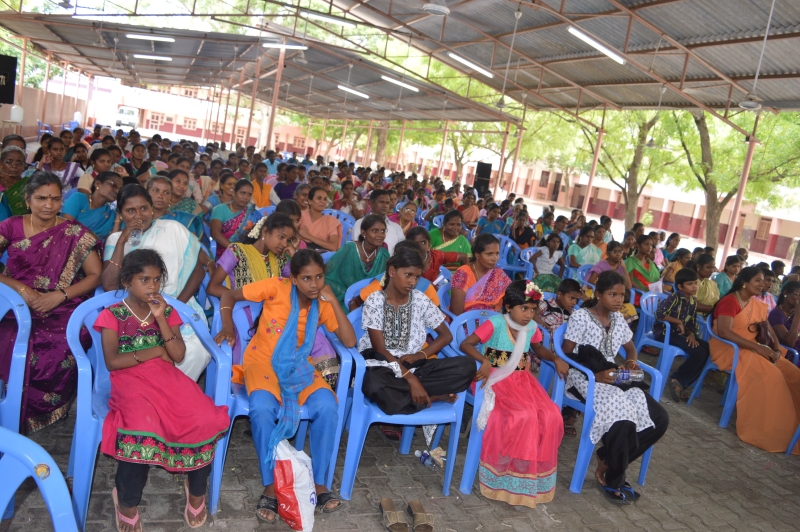
Jan 20, 2016 | Focolare Worldwide
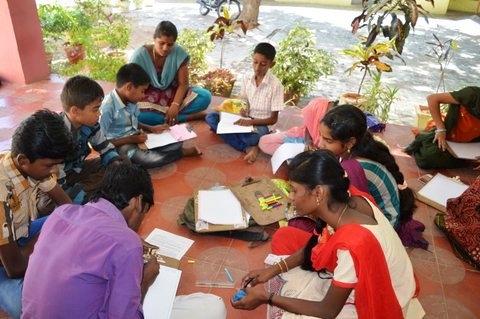 On 2nd February Fr Susai Alangaram celebrates 25 years of priesthood. He had just six years of experience as a priest in Tiruchirapally,Tamil Nadu, the southernmost state of India overlooking the Indian Ocean, when he ventured on the task of setting up a project aimed at alleviating the poverty of the children of his parish. He had encountered the Focolare Movement and committed to live for and give witness to unity with fellow priests in a caste ridden society, and with the help of two other priests he started his support at a distance project with 50 children, naming it Ilanthalir, meaning tender shoots of crops, to remind of the tender care needed for the growth and development of these children. Today poor rural children in various villages of five districts of Tamil Nadu are supported by Ilanthalir in an area stretching 125km further south from Tiruchirapally and 70km to the North. After the 2004 Tsunami children from two coastal villages were also sponsored, and they are presently following their university studies.
On 2nd February Fr Susai Alangaram celebrates 25 years of priesthood. He had just six years of experience as a priest in Tiruchirapally,Tamil Nadu, the southernmost state of India overlooking the Indian Ocean, when he ventured on the task of setting up a project aimed at alleviating the poverty of the children of his parish. He had encountered the Focolare Movement and committed to live for and give witness to unity with fellow priests in a caste ridden society, and with the help of two other priests he started his support at a distance project with 50 children, naming it Ilanthalir, meaning tender shoots of crops, to remind of the tender care needed for the growth and development of these children. Today poor rural children in various villages of five districts of Tamil Nadu are supported by Ilanthalir in an area stretching 125km further south from Tiruchirapally and 70km to the North. After the 2004 Tsunami children from two coastal villages were also sponsored, and they are presently following their university studies. 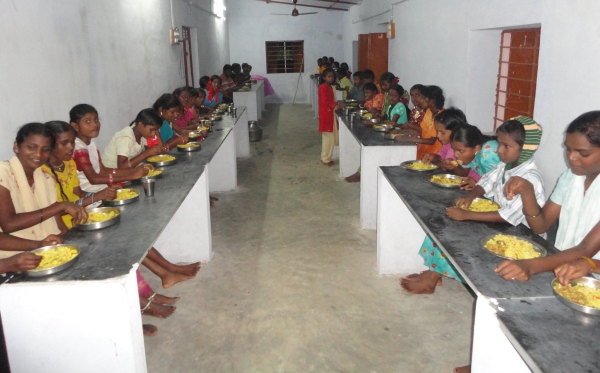 The climate in Tamil Nadu is always hot and the monsoons are unpredictable, disrupting crop cultivation and impoverishing farmers. This year there were floods in the northern part of Tamil Nadu and drought in the centre. Many families below the poverty line are more concerned with earning than educating their children, and this gives rise to illiteracy and child labour. Ilanthalir seeks to provide children with their basic necessities and sponsors their education until they are able to find employment and assist their families.
The climate in Tamil Nadu is always hot and the monsoons are unpredictable, disrupting crop cultivation and impoverishing farmers. This year there were floods in the northern part of Tamil Nadu and drought in the centre. Many families below the poverty line are more concerned with earning than educating their children, and this gives rise to illiteracy and child labour. Ilanthalir seeks to provide children with their basic necessities and sponsors their education until they are able to find employment and assist their families.  This year 456 children are benefiting from direct support and 300 more are receiving assistance from Ilanthalir. As the children are of different faiths Ilanthalir makes arrangements for all to celebrate together their major festivals of Diwali (feast of light), Pongal (harvest festival), Christmas, etc. October is observed as the month for the protection of the environment, and each centre organizes a programme of tree planting, cleaning up of public places, etc. What is striking about the Ilanthalir experience is the impact of the spirituality of unity in a context which would otherwise lead to a culture of survival and isolation. The Word of Life of the Focolare, a commentary on how to live Gospel phrases, is translated into Tamil and distributed to the children and their parents, and once a month they come together to share how they are striving to live the word of God and to renew their commitment to live it. A one day Mariapolis for around 300 people is held every year in Tiruchirapally promoting fraternal interaction. The effort of the children of Ilanthalir to live in this way and their small acts of love make them agents of unity in the family and in their neighbourhood, bringing new hope to many.
This year 456 children are benefiting from direct support and 300 more are receiving assistance from Ilanthalir. As the children are of different faiths Ilanthalir makes arrangements for all to celebrate together their major festivals of Diwali (feast of light), Pongal (harvest festival), Christmas, etc. October is observed as the month for the protection of the environment, and each centre organizes a programme of tree planting, cleaning up of public places, etc. What is striking about the Ilanthalir experience is the impact of the spirituality of unity in a context which would otherwise lead to a culture of survival and isolation. The Word of Life of the Focolare, a commentary on how to live Gospel phrases, is translated into Tamil and distributed to the children and their parents, and once a month they come together to share how they are striving to live the word of God and to renew their commitment to live it. A one day Mariapolis for around 300 people is held every year in Tiruchirapally promoting fraternal interaction. The effort of the children of Ilanthalir to live in this way and their small acts of love make them agents of unity in the family and in their neighbourhood, bringing new hope to many.
https://vimeo.com/155014979
Jan 18, 2016 | Non categorizzato
The news summary will be made available on the Collegamento CH website a few days before the Internet transmission. On the same website one can find all the previous linkups in various languages, as full editions as well as individual news video clips. https://vimeo.com/154703542
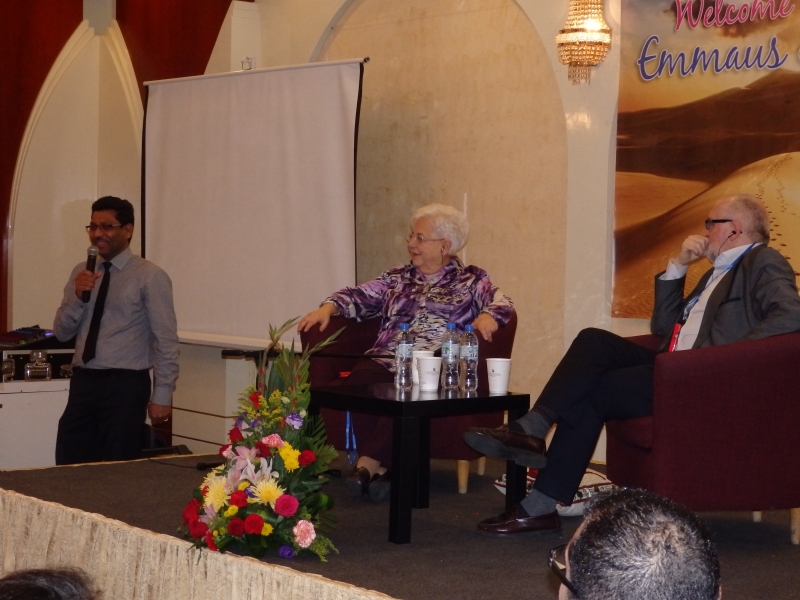
Jan 18, 2016 | Non categorizzato
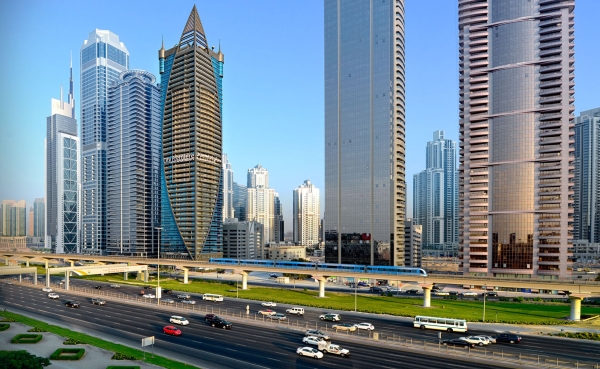 Out of the hundreds of communities that opened over the years in every corner of the world, the spirituality of the Focolare, the one in the Arab Emirates is particularly original and unique. It is in fact, a group composed of members of the Movement who are not natives of the place. There are often entire families from various countries of Asia and the Middle East, and also from Europe and Latin America, who landed in the Persian Gulf for employment purposes, and will leave once their contracts terminate. In fact, 90% of the Emirates population is composed of foreigners who are temporarily based, and the group of the Focolare is part of this section of the country. Last 15 January, in one of the hotels of this world financial capital, around 80 people got together. They belonged to the most varied professions and jobs: construction engineers, embassy clerks, teachers and professors of high schools, nurses, computer staff, university researchers and even humble labourers. Some have been here for years, grew up in this world, and witnessed the vertiginous growth of the country, while others have just arrived. Some of their children were born here, and others will leave soon. The reasons for these transfers are often connected to difficult economic situations in their countries of origin, with salaries they would never have dreamed of. It is a complex and often surreal situation, a life made up of work in the centre of a society at the apex of consumerism.
Out of the hundreds of communities that opened over the years in every corner of the world, the spirituality of the Focolare, the one in the Arab Emirates is particularly original and unique. It is in fact, a group composed of members of the Movement who are not natives of the place. There are often entire families from various countries of Asia and the Middle East, and also from Europe and Latin America, who landed in the Persian Gulf for employment purposes, and will leave once their contracts terminate. In fact, 90% of the Emirates population is composed of foreigners who are temporarily based, and the group of the Focolare is part of this section of the country. Last 15 January, in one of the hotels of this world financial capital, around 80 people got together. They belonged to the most varied professions and jobs: construction engineers, embassy clerks, teachers and professors of high schools, nurses, computer staff, university researchers and even humble labourers. Some have been here for years, grew up in this world, and witnessed the vertiginous growth of the country, while others have just arrived. Some of their children were born here, and others will leave soon. The reasons for these transfers are often connected to difficult economic situations in their countries of origin, with salaries they would never have dreamed of. It is a complex and often surreal situation, a life made up of work in the centre of a society at the apex of consumerism. 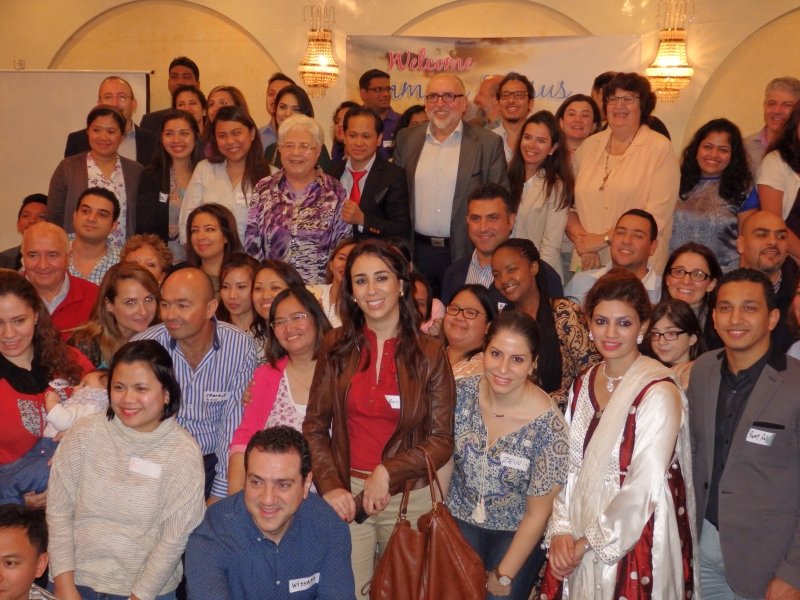 Here the Christians often meet according to their language groups and country of origin, in the Churches of Dubai every Friday, which is a feast day given that this is a Muslim country. The people meeting these days come from every corner of the region: Doha in Qatar or Abu Dhabi, Sharja and Fujera still in the Emirates, and Oman and Bahrain. The occasion for this meeting was the Emirates stopover of Maria Voce and Jesús Morán at the start of the journey in India. It was a moment of sharing with this original community. The morning passed quickly, with the presentation of the history of the presence of the Movement’s members, characterised also by the visits of focolarini from Pakistan, India, the Philippines or other Middle East countries. Then followed some experiences that revealed the true reality of the life lived in this apparent paradise of rampant consumerism, far from one’s own culture, and with the danger of being sucked in by a mentality of commodity, profits and interests. Often, experiences lived in one’s youth and inspired by the spirituality of communion were left aside to find suddenly in these difficult situations, other brothers and sisters who share the charisma of Chiara Lubich. There were situations of difficulty in on-the-job relationships, but also risks of the breakup of families due to consumerism and discarded values of their original countries, and solitude. And yet, even in this corner of the world, a group of people have continued to meet to discuss the Word of Life in the name of the Focolare spirit.
Here the Christians often meet according to their language groups and country of origin, in the Churches of Dubai every Friday, which is a feast day given that this is a Muslim country. The people meeting these days come from every corner of the region: Doha in Qatar or Abu Dhabi, Sharja and Fujera still in the Emirates, and Oman and Bahrain. The occasion for this meeting was the Emirates stopover of Maria Voce and Jesús Morán at the start of the journey in India. It was a moment of sharing with this original community. The morning passed quickly, with the presentation of the history of the presence of the Movement’s members, characterised also by the visits of focolarini from Pakistan, India, the Philippines or other Middle East countries. Then followed some experiences that revealed the true reality of the life lived in this apparent paradise of rampant consumerism, far from one’s own culture, and with the danger of being sucked in by a mentality of commodity, profits and interests. Often, experiences lived in one’s youth and inspired by the spirituality of communion were left aside to find suddenly in these difficult situations, other brothers and sisters who share the charisma of Chiara Lubich. There were situations of difficulty in on-the-job relationships, but also risks of the breakup of families due to consumerism and discarded values of their original countries, and solitude. And yet, even in this corner of the world, a group of people have continued to meet to discuss the Word of Life in the name of the Focolare spirit.  Another part of the dialogue with Maria Voce and Jesús Morán focused on these challenges and sufferings, the underlying risks, and the need for a dynamic community that is able to be the nurture the values of Evangelical communion, fraternity, and sobriety. The President and Co-President of the Focolare recalled how the first Christian communities were disseminated in the great Roman Empire and how the Christians, often alone and isolated, were able to resist the temptations of that world thanks to the communities, however small. The image of the desert flowers was often called up during the dialogue, as a reminder of how Chiara in the 1990s, used this image to describe the first members of the Focolare Movement who found themselves in the Arab Emirates. Besides the need to compete for the primacy of love in an environment which was renowned for other types of “firsts,” there was the challenge to remain well-rooted to the present moment. Upon concluding this dialogue, Maria Voce commented that any other method was unthinkable. The country not only guarantees nothing as to long timeframes, since employment contracts may terminate, and a job may be lost due to financial gambling. So what matters ìs to set deep roots also for those who will come, perhaps when those who are living today in the Emirates will have long gone. This community has to continue. At the end of the morning session it was impressive to see the emotions of the faces of many, and also the joy and enthusiasm in having found and rediscovered a spiritual family, and to be aware that also in this place, they are part of this great global family.
Another part of the dialogue with Maria Voce and Jesús Morán focused on these challenges and sufferings, the underlying risks, and the need for a dynamic community that is able to be the nurture the values of Evangelical communion, fraternity, and sobriety. The President and Co-President of the Focolare recalled how the first Christian communities were disseminated in the great Roman Empire and how the Christians, often alone and isolated, were able to resist the temptations of that world thanks to the communities, however small. The image of the desert flowers was often called up during the dialogue, as a reminder of how Chiara in the 1990s, used this image to describe the first members of the Focolare Movement who found themselves in the Arab Emirates. Besides the need to compete for the primacy of love in an environment which was renowned for other types of “firsts,” there was the challenge to remain well-rooted to the present moment. Upon concluding this dialogue, Maria Voce commented that any other method was unthinkable. The country not only guarantees nothing as to long timeframes, since employment contracts may terminate, and a job may be lost due to financial gambling. So what matters ìs to set deep roots also for those who will come, perhaps when those who are living today in the Emirates will have long gone. This community has to continue. At the end of the morning session it was impressive to see the emotions of the faces of many, and also the joy and enthusiasm in having found and rediscovered a spiritual family, and to be aware that also in this place, they are part of this great global family.

 60 Bishop-friends of the Focolare Movement, representing 31 countries (Iraq, Lebanon, Syria, Bénin, Cameroon, Ivory Coast, Ethiopia, Madagascar, Democratic Rep.of Congo, Tanzania, Thailand, India, Pakistan, Brazil, Venezuela, Panama, U.S.A., Uruguay, Austria, Spain, France, Great Britain, Ireland, Italy, Portugal, Czech Rep., Latvia, the Rep.of Moldova, Romania, Ukraine, Hungary.), are presently gathered at Castelgandolfo (22-26 February). The participation at the General Audience held by Pope Francis at St. Peter’s Square has been the central point of this meeting. In his address the Pope urged the Bishops “to always keep alive the charism of unity in the apostolic ministry, in communion with the successor of Peter”. “A synodal Church is a Church that listens, that realizes that listening ‘is more than simply hearing’. It is a mutual listening in which everyone has something to learn.” This type of Church, as defined by the Pope during the ceremony commemorating the 50th anniversary of the institution of the Synod of Bishops, indicates the track to be followed during this conference. The choice of the title “A Church which generates unity” stems from the belief that, at a time marked by tensions and increasing disintegration, the people of God are called to contribute in a vital manner towards building relationships at all levels and in all environments. This has to be lived, first of all, within the Church itself and its source must be in the heart of a merciful God. The core of this theme lies in understanding Jesus’ prayer to the Father for unity (Jn 17), as “ gift, commitment and achievement”. Maria Voce, president of the Focolare Movement and Jesús Morán, co-president spoke about this approach in the light of Chiara Lubich’s charism.
60 Bishop-friends of the Focolare Movement, representing 31 countries (Iraq, Lebanon, Syria, Bénin, Cameroon, Ivory Coast, Ethiopia, Madagascar, Democratic Rep.of Congo, Tanzania, Thailand, India, Pakistan, Brazil, Venezuela, Panama, U.S.A., Uruguay, Austria, Spain, France, Great Britain, Ireland, Italy, Portugal, Czech Rep., Latvia, the Rep.of Moldova, Romania, Ukraine, Hungary.), are presently gathered at Castelgandolfo (22-26 February). The participation at the General Audience held by Pope Francis at St. Peter’s Square has been the central point of this meeting. In his address the Pope urged the Bishops “to always keep alive the charism of unity in the apostolic ministry, in communion with the successor of Peter”. “A synodal Church is a Church that listens, that realizes that listening ‘is more than simply hearing’. It is a mutual listening in which everyone has something to learn.” This type of Church, as defined by the Pope during the ceremony commemorating the 50th anniversary of the institution of the Synod of Bishops, indicates the track to be followed during this conference. The choice of the title “A Church which generates unity” stems from the belief that, at a time marked by tensions and increasing disintegration, the people of God are called to contribute in a vital manner towards building relationships at all levels and in all environments. This has to be lived, first of all, within the Church itself and its source must be in the heart of a merciful God. The core of this theme lies in understanding Jesus’ prayer to the Father for unity (Jn 17), as “ gift, commitment and achievement”. Maria Voce, president of the Focolare Movement and Jesús Morán, co-president spoke about this approach in the light of Chiara Lubich’s charism. 



 The city of Kolhapur hosted the meeting with some 50 thousand members and sympathisers of the
The city of Kolhapur hosted the meeting with some 50 thousand members and sympathisers of the  “The lines of John’s Gospel converge in the sentence which for quite some time has had deep and infinite meaning for me: ‘. . . may all be one. As you, Father, are in me and I am in you, may they also be in us, so that the world may believe that you have sent me’ (see Jn 17:21). This is how we are to live. [. . .] the Unity of the Church, the unity of those that find themselves beyond the confines of our Roman Catholic Church, the unity amongst all those who acknowledge faith in the one God, the Living One, and therefore with Jews and Muslims. That unity between Church and society in which the one does not find itself beside the other in a parallel sense or in an oppositional way, but Church and society enter into a reciprocal relationship, highlighting the fact that the unity which God gives is the leaven of society, the leaven that makes man free. It is the unity that makes us truly free, because we can only be ourselves in the fullest sense only where God has the right to be God in the fullest sense and therefore can give us everything He wishes to give us. And He doesn’t wish to give us anything less than His own interior mystery: Trinitarian unity. [. . .] But this is not a mere programme, because you never get very far with programmes. It must above all become life [. . .] I also have to begin to live this unity. And for this reason I trust in the fact that all of you, dear brothers and sisters, will help me, and that we can do this together, in reciprocity.”
“The lines of John’s Gospel converge in the sentence which for quite some time has had deep and infinite meaning for me: ‘. . . may all be one. As you, Father, are in me and I am in you, may they also be in us, so that the world may believe that you have sent me’ (see Jn 17:21). This is how we are to live. [. . .] the Unity of the Church, the unity of those that find themselves beyond the confines of our Roman Catholic Church, the unity amongst all those who acknowledge faith in the one God, the Living One, and therefore with Jews and Muslims. That unity between Church and society in which the one does not find itself beside the other in a parallel sense or in an oppositional way, but Church and society enter into a reciprocal relationship, highlighting the fact that the unity which God gives is the leaven of society, the leaven that makes man free. It is the unity that makes us truly free, because we can only be ourselves in the fullest sense only where God has the right to be God in the fullest sense and therefore can give us everything He wishes to give us. And He doesn’t wish to give us anything less than His own interior mystery: Trinitarian unity. [. . .] But this is not a mere programme, because you never get very far with programmes. It must above all become life [. . .] I also have to begin to live this unity. And for this reason I trust in the fact that all of you, dear brothers and sisters, will help me, and that we can do this together, in reciprocity.”  In El Espinal, a town in the province of Salta, Northern Argentina, 35 young people aged 18 to 30 from Argentina and Paraguay spent time together from 3 to 11 January, for a low-cost holiday but of “elevated levels of unity,” as they called it. In fact, also the
In El Espinal, a town in the province of Salta, Northern Argentina, 35 young people aged 18 to 30 from Argentina and Paraguay spent time together from 3 to 11 January, for a low-cost holiday but of “elevated levels of unity,” as they called it. In fact, also the  Among the breathtaking landscapes, sudden climate changes, the sun, animals and insects – at times not valued – everyone felt they could “feel God’s presence and the embrace of his creation” and also the relationships established among the youth, which were really enriching. In short, they spent a different type of holiday in the beautiful province of Salta, while adhering to Pope Francis’ invitation to live the Gospel in the outskirts. Before returning to their cities, they expressed their impressions: “I learnt a lot of things: to be happy with the little we have and not to complain, and live the golden rule. I felt loved and welcomed. All has left a deep mark in me. It was the best way to start the year. Thanks to you all, I have come closer to God.” Other impressions: “We shall leave with our hearts full of stories, experiences, their values, life, light and joy. I again discovered that if we live together for the others, everything else will come as an extra enrichment.” But also the local youth expressed themselves: “You are the best friends Jesus has given me.” “You have filled us with smiles, joy and peace.” Dominga wrote a prayer which she shared with us: “Thank you Jesus for being here and for giving me so many brothers as a gift. I discovered You in each one of them. Lord, teach us to dream big, and of beautiful things that expand our hearts.”
Among the breathtaking landscapes, sudden climate changes, the sun, animals and insects – at times not valued – everyone felt they could “feel God’s presence and the embrace of his creation” and also the relationships established among the youth, which were really enriching. In short, they spent a different type of holiday in the beautiful province of Salta, while adhering to Pope Francis’ invitation to live the Gospel in the outskirts. Before returning to their cities, they expressed their impressions: “I learnt a lot of things: to be happy with the little we have and not to complain, and live the golden rule. I felt loved and welcomed. All has left a deep mark in me. It was the best way to start the year. Thanks to you all, I have come closer to God.” Other impressions: “We shall leave with our hearts full of stories, experiences, their values, life, light and joy. I again discovered that if we live together for the others, everything else will come as an extra enrichment.” But also the local youth expressed themselves: “You are the best friends Jesus has given me.” “You have filled us with smiles, joy and peace.” Dominga wrote a prayer which she shared with us: “Thank you Jesus for being here and for giving me so many brothers as a gift. I discovered You in each one of them. Lord, teach us to dream big, and of beautiful things that expand our hearts.”






















 “How will we celebrate St. Valentines? We don’t know yet. Any occasion is fine for surprising the other with something nice, hiding last-minute gifts.” Iris is a 26 year-old Brazilian. She is in Italy on an international cooperative project. She is engaged to Antonello, an Economics graduate, waiting for a job that is more in tune with his academic background. He works shifts at a call centre. When they first met, Iris was a bit reluctant about beginning a new relationship, because she had been previously disappointed by love. But Antonello managed to get her cell phone number and with his fantastic text messages, finally convinced her to give it another try. “The more we met, the more I realised I was in love,” Iris admits, “and we began to make plans.” “What kind of plans?” we asked. “First of all,” says Antonello, “I wanted to introduce her to my parents. Then we travelled to Brazil to meet her parents. Meanwhile, we were discovering each other’s cultures and different religious beliefs. Iris is deeply Catholic. I have a more humanistic view of things. But even if we come from different paths, we’re both convinced of the beauty of marriage, and that it is a profoundly human and sacred act.” Iris recounts: “That exchange – which for me, accustomed to certainties that were too often taken for granted – wasn’t easy. But it helped us to realise how strong our love was, a love that made us grow as human beings: I became more of a woman, and Antonello more of a man. It also led us to our decision that we would get married when we were financially independent.” Their certainty is disarming, considering the many couples around them whose relationships have failed, whose great love has vanished into thin air. Just the same, they want to take the big step into marriage because – as they say – “We’re sure of our love. It’s not merely a romantic dinner or a chocolate Valentine heart. “Love,” Iris explains, “is falling in love with the other’s soul. It’s knowing how to put aside one’s own thinking, to make room for the other’s thinking, and to show that for you, he matters more for what he is than for what you would like him to be.”
“How will we celebrate St. Valentines? We don’t know yet. Any occasion is fine for surprising the other with something nice, hiding last-minute gifts.” Iris is a 26 year-old Brazilian. She is in Italy on an international cooperative project. She is engaged to Antonello, an Economics graduate, waiting for a job that is more in tune with his academic background. He works shifts at a call centre. When they first met, Iris was a bit reluctant about beginning a new relationship, because she had been previously disappointed by love. But Antonello managed to get her cell phone number and with his fantastic text messages, finally convinced her to give it another try. “The more we met, the more I realised I was in love,” Iris admits, “and we began to make plans.” “What kind of plans?” we asked. “First of all,” says Antonello, “I wanted to introduce her to my parents. Then we travelled to Brazil to meet her parents. Meanwhile, we were discovering each other’s cultures and different religious beliefs. Iris is deeply Catholic. I have a more humanistic view of things. But even if we come from different paths, we’re both convinced of the beauty of marriage, and that it is a profoundly human and sacred act.” Iris recounts: “That exchange – which for me, accustomed to certainties that were too often taken for granted – wasn’t easy. But it helped us to realise how strong our love was, a love that made us grow as human beings: I became more of a woman, and Antonello more of a man. It also led us to our decision that we would get married when we were financially independent.” Their certainty is disarming, considering the many couples around them whose relationships have failed, whose great love has vanished into thin air. Just the same, they want to take the big step into marriage because – as they say – “We’re sure of our love. It’s not merely a romantic dinner or a chocolate Valentine heart. “Love,” Iris explains, “is falling in love with the other’s soul. It’s knowing how to put aside one’s own thinking, to make room for the other’s thinking, and to show that for you, he matters more for what he is than for what you would like him to be.” 
 “The Gospel isn’t just a collection of words. It’s also a list of facts. It’s life. Jesus not only preached, he healed the sick, comforted the afflicted, raised the dead and fed the hungry. He performed the Works of Mercy because He loved. “I have compassion for these people,” He exclaimed upon seeing the hungry throngs, and He multiplied bread to satisfy their hunger. Bread takes on a sacred value in the Redemption. Jesus inserts the greatest mystery into bread, and He made the Eucharistic Banquet the core of the life of the Church community, forever uniting body and spirit, just as He had united humanity and divinity in Himself. Therefore, you love God, the Father, when you feed the hungry. All those who can offer nourishment to the undernourished and hungry and don’t do so, are murderers according to the Fathers of the Church; indeed, they’re god-killers. They cause Christ to die. From the perspective of the Gospel all those who, during the war years, forced condemned prisoners to starve to death, repeated the crucifixion. It was like murdering God. The hordes of the deported – in snow or under blazing sun, in armored cars, or in isolated ships whose monotony was only interrupted by the falling of the hungry – crossed the line of practical atheism even when it was perpetrated in the name of God. That is why Saint Vincent de Paul went aboard the galleys of very Christian kings, where the galley slaves were dropping dead from exhaustion. A Work of Mercy is not the mere distribution of food or money. It reconstitutes justice. “The Works of Mercy accomplish nothing without love,” Saint Augustine says. “If I give everything I own to the poor and even go to the stake to be burned as a martyr, but I don’t love, I’ve gotten nowhere” (1 Cor 13:3), Saint Paul says to those Christians who shared the Bread of Angels but not that of men. The cold and reserved woman who gives Christmas to the poor but never opens her soul to them, performs nothing more than a bureaucratic duty: Christ is not pleased. Social welfare does little or nothing at all to produce the effects of a religious life, if those who carry it out don’t bring that divine nourishment of the Holy Spirit, which is love.
“The Gospel isn’t just a collection of words. It’s also a list of facts. It’s life. Jesus not only preached, he healed the sick, comforted the afflicted, raised the dead and fed the hungry. He performed the Works of Mercy because He loved. “I have compassion for these people,” He exclaimed upon seeing the hungry throngs, and He multiplied bread to satisfy their hunger. Bread takes on a sacred value in the Redemption. Jesus inserts the greatest mystery into bread, and He made the Eucharistic Banquet the core of the life of the Church community, forever uniting body and spirit, just as He had united humanity and divinity in Himself. Therefore, you love God, the Father, when you feed the hungry. All those who can offer nourishment to the undernourished and hungry and don’t do so, are murderers according to the Fathers of the Church; indeed, they’re god-killers. They cause Christ to die. From the perspective of the Gospel all those who, during the war years, forced condemned prisoners to starve to death, repeated the crucifixion. It was like murdering God. The hordes of the deported – in snow or under blazing sun, in armored cars, or in isolated ships whose monotony was only interrupted by the falling of the hungry – crossed the line of practical atheism even when it was perpetrated in the name of God. That is why Saint Vincent de Paul went aboard the galleys of very Christian kings, where the galley slaves were dropping dead from exhaustion. A Work of Mercy is not the mere distribution of food or money. It reconstitutes justice. “The Works of Mercy accomplish nothing without love,” Saint Augustine says. “If I give everything I own to the poor and even go to the stake to be burned as a martyr, but I don’t love, I’ve gotten nowhere” (1 Cor 13:3), Saint Paul says to those Christians who shared the Bread of Angels but not that of men. The cold and reserved woman who gives Christmas to the poor but never opens her soul to them, performs nothing more than a bureaucratic duty: Christ is not pleased. Social welfare does little or nothing at all to produce the effects of a religious life, if those who carry it out don’t bring that divine nourishment of the Holy Spirit, which is love. 



 “I was still a child,” Alfonso from the class of 1945 recounts, “when my father was unjustly imprisoned. My mother and I would visit him in prison and, at such a tender age I realised how lonely the inmates were: people without hope or future – and without dignity. So, I promised myself that one day I would do something for them.” Alfonso had to wait for that chance. He enrolled in a course on volunteering and obtained permission to make visits to Rebibbia Prison, which currently has 1,700 inmates. They are serving time for the most varied crimes: drug dealing, sex abuse, mafia activity, extortion, murder, and more. Alfonso was aware that his efforts would be limited by the distrust of the inmates who belived they had lost any chance at redemption. In fact, many of them refused to let him approach. But he never gave up because he was convinced they were the image of the God he had chosen when he became a
“I was still a child,” Alfonso from the class of 1945 recounts, “when my father was unjustly imprisoned. My mother and I would visit him in prison and, at such a tender age I realised how lonely the inmates were: people without hope or future – and without dignity. So, I promised myself that one day I would do something for them.” Alfonso had to wait for that chance. He enrolled in a course on volunteering and obtained permission to make visits to Rebibbia Prison, which currently has 1,700 inmates. They are serving time for the most varied crimes: drug dealing, sex abuse, mafia activity, extortion, murder, and more. Alfonso was aware that his efforts would be limited by the distrust of the inmates who belived they had lost any chance at redemption. In fact, many of them refused to let him approach. But he never gave up because he was convinced they were the image of the God he had chosen when he became a  Through his visits with inmates, Alfonso has come to realise the importance of that fragile thread that connects them to the outside world. This is why he works so hard at keeping the relationship with families alive – especially with wives – and supporting families that find themselves in dire straits because of their relative’s imprisonment. This all takes time, people, energy and money. Alfonso never gave up. He began a project called “
Through his visits with inmates, Alfonso has come to realise the importance of that fragile thread that connects them to the outside world. This is why he works so hard at keeping the relationship with families alive – especially with wives – and supporting families that find themselves in dire straits because of their relative’s imprisonment. This all takes time, people, energy and money. Alfonso never gave up. He began a project called “






 (…)“Let among you who is without sin be the first to throw a stone at her” (Jn 8:7). Jesus said this to those who wanted to stone the adulteress. The central idea in Jesus’ commands is always love. This is why he doesn’t want us Christians to condemn anyone. In fact he says, “Do not judge,” and proclaims, “Blessed are the merciful.” Jesus wants mercy. Nevertheless, from what he says one could conclude that there is someone who could throw the first stone: whoever is without sin. This is certainly not one of us, we are all sinners. But there is a person who is without sin. And we know who she is: the Mother of God. Could Mary, then, “throw a stone” at someone who erred? Did she ever do such a thing when she was on earth? We know our Mother. We know what Scripture says about her, what Tradition has handed down to us about her, what the People of God have always thought about her. Mary loves everyone. She is merciful She is the advocate of the most unfortunate. It is to her that countless Christians have turned, when they have had the impression that God’s justice was upon them. Mary does not throw stones. Quite the contrary, no one except Jesus spreads love the way she does. Why? Because she is a mother, and mothers only know how to love. It is typical of a mother to love her children as herself, because there’s something of herself in them. … We too can find something of ourselves in others. For we must see Jesus in ourselves and in every neighbour. What shall we do? With each neighbor, at home, at work, or on the street, with the people we talk; with those we speak to over the phone, or for whom we carry out our daily work – with every person we meet these days, we must think: “I must act as if I were his or her mother,” and act accordingly. Mothers are always serving, Mothers always find excuses for their children. Mothers are always full of hope. “As if I were his or her mother”, this is thought which must be foremost in our minds these days. This must be our resolution, if we want to be sure not to throw stones: and to be Mary’s presence here on earth for everyone we meet. Chiara Lubich Rocca di Papa, 3rd March 1983 Source: Chiara Lubich Centre
(…)“Let among you who is without sin be the first to throw a stone at her” (Jn 8:7). Jesus said this to those who wanted to stone the adulteress. The central idea in Jesus’ commands is always love. This is why he doesn’t want us Christians to condemn anyone. In fact he says, “Do not judge,” and proclaims, “Blessed are the merciful.” Jesus wants mercy. Nevertheless, from what he says one could conclude that there is someone who could throw the first stone: whoever is without sin. This is certainly not one of us, we are all sinners. But there is a person who is without sin. And we know who she is: the Mother of God. Could Mary, then, “throw a stone” at someone who erred? Did she ever do such a thing when she was on earth? We know our Mother. We know what Scripture says about her, what Tradition has handed down to us about her, what the People of God have always thought about her. Mary loves everyone. She is merciful She is the advocate of the most unfortunate. It is to her that countless Christians have turned, when they have had the impression that God’s justice was upon them. Mary does not throw stones. Quite the contrary, no one except Jesus spreads love the way she does. Why? Because she is a mother, and mothers only know how to love. It is typical of a mother to love her children as herself, because there’s something of herself in them. … We too can find something of ourselves in others. For we must see Jesus in ourselves and in every neighbour. What shall we do? With each neighbor, at home, at work, or on the street, with the people we talk; with those we speak to over the phone, or for whom we carry out our daily work – with every person we meet these days, we must think: “I must act as if I were his or her mother,” and act accordingly. Mothers are always serving, Mothers always find excuses for their children. Mothers are always full of hope. “As if I were his or her mother”, this is thought which must be foremost in our minds these days. This must be our resolution, if we want to be sure not to throw stones: and to be Mary’s presence here on earth for everyone we meet. Chiara Lubich Rocca di Papa, 3rd March 1983 Source: Chiara Lubich Centre 
 Card. Giuseppe Betori, Archbishop of Florence traced an important phase of his story, and described him as «A promoter of proactive communion between the various groups and associations,» who «interpreted the hope of Cardinal Benelli and Chiara Lubich» for the creation of the
Card. Giuseppe Betori, Archbishop of Florence traced an important phase of his story, and described him as «A promoter of proactive communion between the various groups and associations,» who «interpreted the hope of Cardinal Benelli and Chiara Lubich» for the creation of the




















 It all began in 2002, when the local community of the
It all began in 2002, when the local community of the 

 “I teach in a Catholic school in my city, Salta, in northern
“I teach in a Catholic school in my city, Salta, in northern 










 On 2nd February Fr Susai Alangaram celebrates 25 years of priesthood. He had just six years of experience as a priest in Tiruchirapally,Tamil Nadu, the southernmost state of India overlooking the Indian Ocean, when he ventured on the task of setting up a project aimed at alleviating the poverty of the children of his parish. He had encountered the
On 2nd February Fr Susai Alangaram celebrates 25 years of priesthood. He had just six years of experience as a priest in Tiruchirapally,Tamil Nadu, the southernmost state of India overlooking the Indian Ocean, when he ventured on the task of setting up a project aimed at alleviating the poverty of the children of his parish. He had encountered the  The climate in Tamil Nadu is always hot and the monsoons are unpredictable, disrupting crop cultivation and impoverishing farmers. This year there were floods in the northern part of Tamil Nadu and drought in the centre. Many families below the poverty line are more concerned with earning than educating their children, and this gives rise to illiteracy and child labour. Ilanthalir seeks to provide children with their basic necessities and sponsors their education until they are able to find employment and assist their families.
The climate in Tamil Nadu is always hot and the monsoons are unpredictable, disrupting crop cultivation and impoverishing farmers. This year there were floods in the northern part of Tamil Nadu and drought in the centre. Many families below the poverty line are more concerned with earning than educating their children, and this gives rise to illiteracy and child labour. Ilanthalir seeks to provide children with their basic necessities and sponsors their education until they are able to find employment and assist their families. 
 Out of the hundreds of communities that opened over the years in every corner of the world, the
Out of the hundreds of communities that opened over the years in every corner of the world, the 